#it's more like i'm fascinated by both characters involved so i like thinking about their relationship with each other too
Text
What's good about KnH is (besides its main char and bc of Maomao) the way it manages the power dynamics and what life was as a woman without falling into utter pessimism and powerlessness or full romanticism; which is a reason I usually avoid like the plague historical/pseudo-historical fiction with female leads.
Usually I'd be super skeeved out by the power Jinshi has over Maomao but the way the series presents both of them, their personalities and their agency (limited as it is for Maomao but it's there and it counts very much) it brings out all the best and interesting parts. I trust this series to get twisty with them bc it establishes so well Maomao own character and understanding of her situation and the ways Jinshi can and does or doesn't take advantage of his power over her.
Like. It's presented as a problematic element, but also unavoidable given their social situation and the world they live in, so I can trust given everything else this show has done when solving the mysteries and presenting us the situations of other women, that the romance will be treated with that same weight.
Honestly if you've read over what I like to read/watch in my tumblr you'll notice that twisty and even toxic/unhealthy dynamics are very much within my favorites, but it needs to be told in a certain way. And I'm much more difficult to satisfy when talking about het romance.
So to watch KnH, notice it's primarily about Maomao life and the various misteries/medicines/palace intrigue and the romance is playing second fiddle riffing on all the themes presented on the plot? And it's complex, and plays with messy power dynamics of gender and class, but never loses Maomao her personhood? Wow.
Also. Jinshi is so BL chara coded omg XD like, he's very clearly based on a kind of shojo ML prototype (hello tamaki suoh!) but it also pulls from BL in his case (nothing to do with their romances but I think of Yan Xiaohan re:his relationship with the imperial power, from Golden Terrace lol)
And yet his romance with Maomao wouldnt work near as well for what is trying to say if they weren't a man and woman (which I love in their case, is what has me fascinated). Yes~! Get into the meat of how fraught it is for a man and a woman to be together when the man has so much power over her. Get into it!!!!
He's so so messy and fun as a chara too. Sheltered and not at the same time, you really notice all the things he misses by way of his privilege of being a noble born man (and specifically royalty, last ep (19) left that very clear he was doing a ritual probably by proxy for the emperor and also bay exchanges people. Maomao noticed and buried that thought far far below her subconscious but we all now who he is lol). Like. The way he fumbles and ends up essentially harassing Maomao at the start sometimes, which is both played for comedic effect and also upsetting. Mmm.
Like I said, I like complexity.
Also that part when he buys Maomao contract and he goes to collect her and she's all dolled up, and the clear implication by everybody but our mains (who clearly prefer to live in willfully blind land although for Jinshi I think the subtext of what he's doing lands when he sees her) is that in any other case she'd be his concubine/side-wife. It's not their situation wight now, and she's put to work as a live-in maid and apothecary and put to study (he wants her to assist him in politics lol I love that, but also he's so so lonely) but it's very much what the palace rumor mill says.
LIKE. I love the messiness! It could go soooo badly, but it also could not and there's Maomao living at the edge bc despite herself and what she says, she wants more from life, but also as she says the rear palace isn't all that different from the high class brothels and ugh. That tension. She has to depend on the favor of a man as a women of low class but she also could lose her head! GAH. And then there's feels involved! Aaagh.
155 notes
·
View notes
Text
The Taste of Shame (2)
[ dom!modern • Aemond x friend sister • female ]
[ warnings: doubts related to sex work, panic attack, remorse and depression, fluff, sexual tension ]
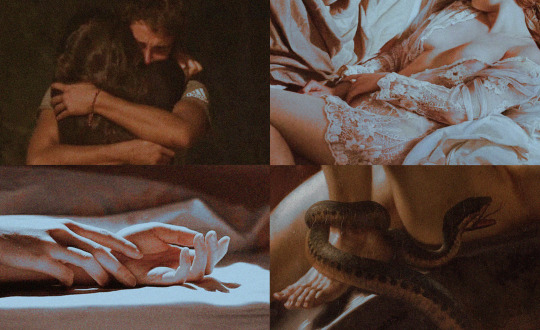
[ description: Aemond works as a professional dom, fulfilling the various fantasies of his female clients - however, he guards his privacy and does not enter into any relationships with them, recognizing that he does not want or need it. It turns out that what he wants and what he doesn’t no longer matter when he meets his friend’s younger sister for the first time. Slow burn, sexual tension, doubts related to sex work. ]
Series & Characters Moodboard
Aemond NSFW Alphabet
* English is not my first language. Please, do not repost. Enjoy! *
Next chapters: Masterlist
_____
Walking to the lecture they talked about everything and nothing; for the most part, she was the one speaking, telling stories or asking questions, guiding her bike beside her by the handlebars, while he just added his thought or simply remained silent, listening to her.
They arrived at the Community Centre true to her word very quickly and indeed he immediately saw posters announcing that there would be free lectures by philosophers in the fields of contemporary ethics.
Robert's sister padlocked her bike in the designated area and they both went inside, following the signs. They entered a large, neo-classical hall with beautiful pillars and rich ornamentation on the ceiling, reminding him of a theatre or opera house.
They sat side by side on seats in one of the first rows − she explained to him that the presenter would be asking questions and, among others, her professor would be answering.
Indeed, the discussion was remarkably interesting and he caught himself drawn in; the men were talking among themselves about capital punishment, attitudes to the treatment of other humans and animals, warfare and human-wide conflicts.
However, he felt a cold sweat on his back and a tightness in his throat, his heart starting to pound like mad when the presenter asked the next question.
"As we know, a lot of young people start, as they say in modern times, sexworking − whether they show up on webcams or have sex for money. How do you, Professor, view this, do you think it's good for the psyche of such people? Is it morally right?"
The professor grunted and corrected his glasses with a slight hand gesture; he was a grey-haired, elderly man with a kindly, calm face.
"It depends on a number of factors. Firstly − what that young person's goal is. When we choose our job, we usually want more than just to earn money, most people's dream is to do things that fascinate them, that they are fulfilled in. Of course, people are also fulfilled in the sexual sphere with their partners, however, what happens when sexuality becomes a profession?
Well, in a way, two things are then combined that can be very destructive to the psyche − materliness and one's own body. At the same time, we make the decision ourselves, so it is not morally wrong if it involves two adults who agree to it, but there is an internal objectification, a selling of some part of our intimacy.
Of course, one can feel good about it. One may even like it. One should not tell such people that they are denying something, or say that they are selling themselves, that they are pricing their value. You see, it is not for us to judge. Everyone can do what they want with their body, it is their unquestionable right.
However, the danger arises when, underneath this materialistic approach, there is a desire for self-destruction, a desire to simultaneously dominate, to be in charge − I decide what happens to my body − and, at the same time, I desire to humiliate myself in my own eyes − I sell myself and I'm nothing, I don't want affection because I don't deserve it.
This issue is very complex and delicate, judging too quickly, especially by outsiders, will be even more hurtful to such people, a confirmation that they will never be loved and accepted, so they will be afraid to make sexuality emotional, which will lead to the opposite effect that we would all like."
The presenter nodded with understanding.
"If the professor were to state what it should look like in an ideal world, what would the professor say?"
The man laughed good-naturedly, stroking his white beard.
"I don't have an answer to that. I think that in an ideal world, the person who is made for us would be highlighted to us in green and those who hurt us in red. But we don't have that option. I think the fundamental mistake of every human being is to make judgements prematurely, instead of being willing to understand, to offer conversation, to support.
Calling someone a whore or a slut has never helped anyone, what's more, it only makes such people even more likely to have suicidal thoughts and be afraid to seek help when they feel they need it, because they are scared of revealing themselves to their parents or loved ones."
The presenter moved on to the next topic, but he heard nothing more, staring blankly at the floor, leaning forward so that his elbows were on his knees − he felt himself trembling all over, his eyes burning from the moisture that had gathered under his eyelids, his throat all clenched.
He felt her hand on his back and he shuddered, glancing over his shoulder at her with wide eyes − she was leaning over him worriedly, he could smell her pleasant scent again.
"Are you all right? Do you want to go out for some fresh air?" She asked frightened, clearly seeing how pale he was, and he nodded in embarrassment.
By the time they got outside it was completely dark; he reached with his shaking hand into the inside pocket of his leather jacket, taking out a cigarette and a lighter, firing it quickly and putting it into his mouth.
He felt her looking at him − they were standing in the square in front of the main entrance where there was no one but them, all around them was the loud hum of moving cars.
For some reason he felt desperate and miserable, weak, small; he clenched his eyes shut, shaking his head, trying to pull himself together. He sat down on the cold stone steps and she immediately sat down next to him, far too close.
He sighed when he felt her hand on his shoulder, stroking him gently, her warm breath on his cheek cool from the crisp evening air. He let out a loud puff of smoke with his lips, thinking only of how he had never let any woman touch him.
He placed his hand on hers, wanting to feel her for once, her skin soft as silk, exactly as he had imagined; he looked at her in pain, her eyebrows arched in worry, in incomprehension of what had actually happened.
"I'm selling myself." He said finally, desperate, and she blinked as if she didn't understand what she had just heard.
He took a drag again, not taking his eyes off her, and let the smoke out through his nose.
"I do all sorts of fucked up things to women for money and get satisfaction out of it, you know?" He asked in a low, trembling voice, feeling devastated how tears of shame one by one began to run down his face.
He felt himself shaking all over and thought he was an idiot, wondering how he could have said that to her. For some reason, he felt something inside him break.
He wanted her to know, to tell him she was disgusted with him, to look at him with that look full of reserve, to tell him it was nothing and just go away simply to let him finally stop thinking about her.
He saw her tighten her lips, her eyes turning red, her eyebrows arching in sorrow as if she was in pain as he was. He felt a pleasant shudder when her hand stroked gently through his hair as if he were a small child, and then she hugged her face to his cheek and simply remained silent.
She didn't say anything.
She stayed.
She wanted to comfort him.
Delighted at this revelation, he burst out into a quiet, mournful sob, leaned over and snuggled his face into her neck, wanting to hide from his own shame and remorse, from what she might think of him, from what he feared and could not forgive himself for.
Why did he have to be like this?
Why exactly did this give him fulfilment?
He sighed quietly as she put her arms around him and hugged him, her soft hand stroking his cheek with gentle, slow movements, her face nestled against his hair and placing a gentle kiss on it.
"You didn't do anything wrong." She whispered finally; he swallowed hard, rubbing the tip of his nose against her neck, brushing his lips gently against her bare skin, again, and then again.
He felt her tremble and tighten her hands on his leather jacket, his manhood in his trousers completely hard.
He had no idea what had just happened between them, but he didn't want to stop.
After a moment, as his emotions left him he realised what he had done.
That he had told a complete stranger about who he was, revealed to her his darkest secret.
This thought made him panic − he got up abruptly and mumbled through his tears that he would go home already, that he apologised to her for everything, not listening to her pleas to wait for her, running quickly down the stone stairs, walking ahead.
He looked over his shoulder as he turned into the corner of the next street and noticed with some kind of disappointment that she was not following him.
He burst out into uncontrollable sobs for the second time once he had locked himself in his car having complete chaos in his head, feeling that he was going through some kind of panic attack.
He thought that until he'd met her he hadn't felt this way, that the idea that he couldn't date her because of what he'd done made him start to regret it all.
What was he supposed to do now?
He reached for his phone hearing it vibrate and unlocked it quickly seeing as many as three new messages from her.
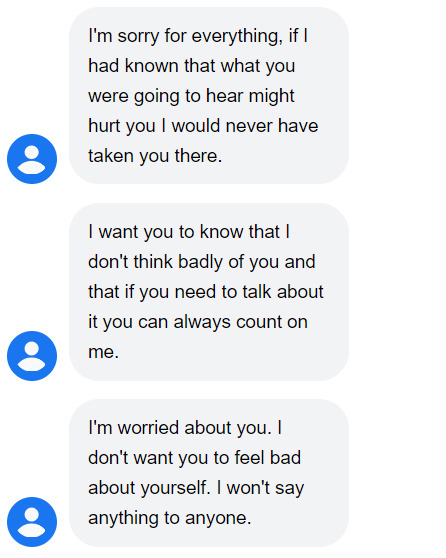
He clenched his eyelids, dropping his phone on the other seat, hiding his face in his hands.
He needed to calm down.
He sat like that for a few minutes in silence, not thinking about anything, just breathing, and then he drove home as if nothing had happened.
He entered his flat, took a shower, ate something and then turned on the TV, all mechanical, completely empty; he shuddered when he got a new message, reaching uncertainly for his phone and felt an unpleasant twinge in his stomach when he saw it was one of his clients.
She wanted to meet the next day.
No, he thought.
I don't want to.
He wrote her back that he was taking a break from it all for a while.
He was infuriated when she started texting him to tell him not to do it, that she needed him, that meeting him made her want to go on living.
He slammed his phone furiously into the wall.
What about what he fucking needed?
When he picked it up after several minutes he found that it worked despite the cracked screen.
He accessed the last messages he'd received from Robert's sister and began typing quickly to her on his phone's keypad.
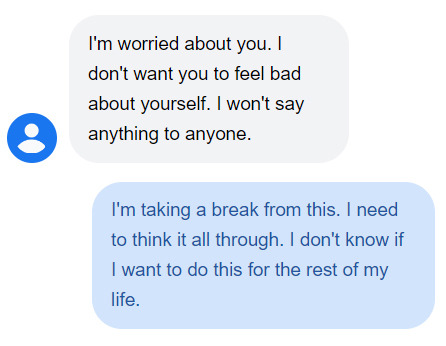
He pressed his lips together when he saw that she immediately displayed his message, a bubble popped up in his app window indicating that she had just written back to him.
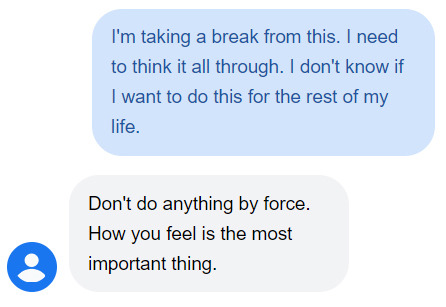
He swallowed loudly, writing her back without thinking, without controlling himself, allowing himself to shamelessly write her exactly what was in his head.
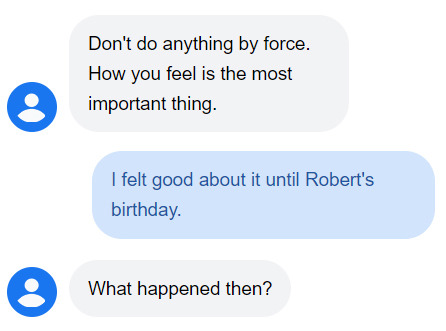
He stared at the screen with a pounding heart, wondering whether to do it or not, walking restlessly around his living room with his phone in his hands − he typed out the answer slowly, feeling that he was hot.
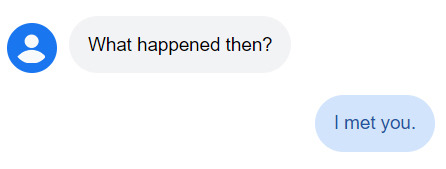
She didn't reply for a long time even though he could see that she had displayed his message.
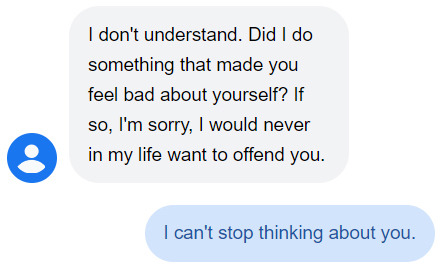
He squeezed his eyes shut, shaking his head, laughing despairingly under his breath, not believing how desperate he was.
He'd known it from the moment he'd seen her, when she'd gotten off that fucking bike and looked at him with those big, innocent eyes of hers.
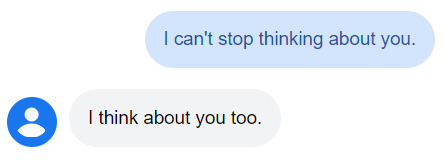
He stood looking at her message as if stupefied, reading it again and again, unable to believe it, feeling like he was about to die from the arousal and heat he felt in his chest, his fingers trembling as he tapped out his reply to her.
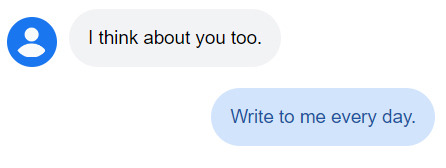
And so she did.
He didn't dare propose to meet her alone, knowing how that would have gone down on his part.
He didn't want to scare her off.
However, they wrote with each other for days, even during his classes; Criston and Robert laughed at him for having a girlfriend and not even wanting to introduce her to them.
He didn't care.
She was the first person he told about how it all started, what he felt when he did it, what aroused him and what repulsed him about it all.
She listened to him and answered him with sincere concern and worry, without judging him, without pretending it was a simple and obvious subject, giving him a sense of comfort and understanding.
He made it clear to her that he had refrained from any contact with strange women for the time being.
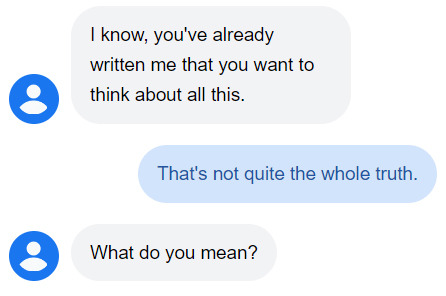
He licked his lower lip as he lay back in his bed, writing her off quickly.
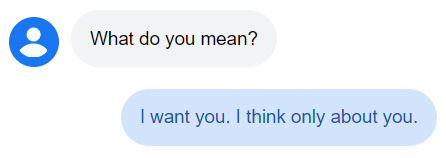
He swallowed hard when she wrote him back after a moment.
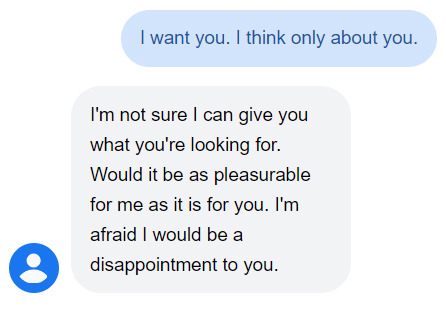
He felt a squeeze in his heart at her words, some kind of pain that she thought of herself that way, that she saw herself as just another person he wanted to take out on.
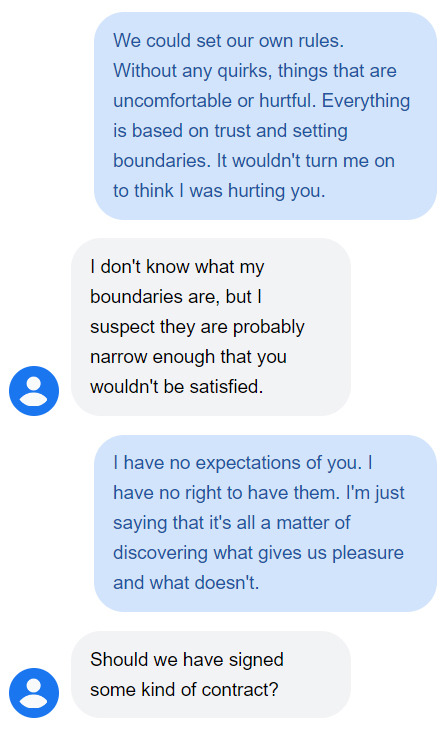
He chuckled involuntarily, typing back a quick response to her question.
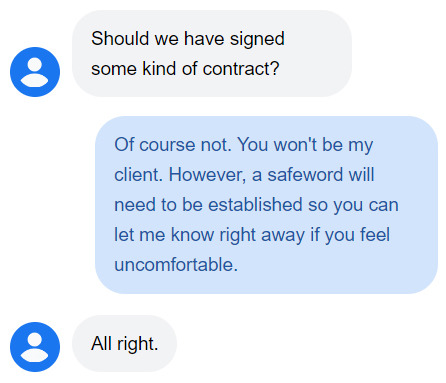
He blinked, looking at his screen with a pounding heart, not believing what he read.
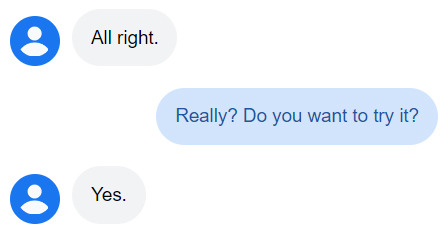
______
Aemond Taglist:
(bold means I couldn't tag you)
@its-actually-minicika @notnormalthings-blog @nikstrange @zenka69 @bellaisasleep @k-y-r-a-1 @g-cf2020 @melsunshine @opheliaas-stuff @chainsawsangel @iiamthehybrid @tinykryptonitewerewolf @namoreno @malfoytargaryen @qyburnsghost @aemondsdelight @persephonerinyes @fan-goddess @sweethoneyblossom1 @watercolorskyy @randomdragonfires @apollonshootafar @padfooteyes
#aemond fic#aemond fanfiction#aemond targaryen#hotd aemond#aemond x oc#ewan mitchell#ewan mitchell fanfic#dark aemond smut#aemond smut#aemond targaryen smut#ewan mitchell smut#modern aemond angst#dark modern aemond#modern aemond smut#modern aemond#ewan mitchell fanfiction#aemond targaryen angst#aemond angst#hotd angst#dark aemond#dark aemond targaryen#aemond kinslayer#prince aemond#aemond#aemond one eye#prince aemond targaryen#aemond fanfic#hotd fanfiction#hotd fanfic#ewan mitchell fandom
370 notes
·
View notes
Note
Omg a fellow F1 enjoyer here!! I absolutely love all your works, but I especially loved that one even more! 🥺 can I request for the dateables and side characters too pleaseee? 🫣

a/n: I'm glad you liked it! the demon bros were more like mc's little crew and it was such a cute idea. I think the others would still support mc in their own way too.
➤ when MC is a professional F1 driver | the dateables + mephisto
1.3k words | sfw | gn!reader | fluff & slice of life shenanigans
cw: developing relationships with the other characters (except for baby brother luke who is strictly platonic and mc's #1 fan).
related versions: the demon brothers

Diavolo
— He's thrilled that you're forging your own path in the Devildom and that the demon brothers are involved.
— He's impressed by your abilities but he still worries about your safety.
— Every morning when Barbatos brings him his morning paper, he scans the front page and sports sections for articles or photos about you or your latest race.
— He saves clippings of all your newspaper/magazine appearances and keeps them in a scrapbook.
— His original intention was to give it to you as a gift when you finished your year in the exchange program. He ends up making copies for everyone who wants one and keeps the original for himself.
— He has his own impressive vehicles. your excitement is palpable when he shows you the collection in his garage. When you go out together, he offers you the keys and hopes that you'll take the wheel. (He can't explain why he likes it so much.)

Barbatos
— He's a skilled driver himself even though he rarely needs to drive. Portals are so much simpler.
— The Devildom racing league tightens up its safety and security measures when you join. Barbatos personally oversees that their lax approach to rules and safety are amended. He argues that there's a fortune to be made for having the novelty of a human world driver on their track. He promises with fake smiles that their license and investments will suddenly be forfeit should anything happen to you due to their negligence.
— Barbatos doesn’t have a lot of free time to watch your races in person, but he follows your Devilgram account and watches the highlight reels that Asmo posts when he is done working for the day.
— He receives your fan club's newsletter. He's also purchased some merchandise as well, including a coffee mug he uses when he drinks tea privately in his chambers
— The Little D’s are some of your biggest fans too. Some of them make zoom-zoom noises as they race each other in the halls of the castle. (Little D Number 2 has tried to "borrow" Barbatos' fan merch, several times, but always gets caught.)

Simeon
— He's not sure why humans are so fascinated in sports or activities that look far too dangerous. He admires your passion and hates it at the same time.
— He’s a little nervous the first time you offer to take him out for a joy ride, but later he admits it was surprisingly enjoyable. (Anything with you is enjoyable, though.)
— He and Luke go to your races and both of them have a small collection of your fan merch.
— He’s very concerned about your safety. He knows humans are less durable than demons are and he watches from the stands with the pent-up energy of a bird about to take flight. If something happens, he's going to be out of his seat and flying to your side to help you.
— He secretly hopes you’ll retire from this career sooner rather than later because he’s terrified you’re going to get hurt (or worse) one day.

Luke
— He’s fascinated by the sport and how talented you are. He thinks it's a little scary how fast the race cars drive and he reminds you before each race that winning isn't important, as long as you're safe and having fun!
— He makes cupcakes and other yummy treats for you to celebrate your big wins. The cake and icing is dyed the same bright colours as your racing car.
— He loves it when you give him a chance to visit you behind the scenes at the track: exploring the pit, letting him sit in your car with your too-big helmet teetering awkwardly on his head.
— The others get a little jealous when you show Luke special attention, like when you wave to him in the crowd before a race or hug him when he runs up to you after.
— Luke likes sitting shotgun when you drive him and the others around town or for little day trips. Mammon even gives you permission to take him for drives in his own car sometimes. (Mammon lets Luke sit in the front seat with you if the three of you go somewhere together.)
— Luke talks about you constantly with his roommates in Purgatory Hall. He also mentions you a lot to Michael and even offered to send him some of your fan merch.
— (Michael grows more curious about you with each story or photo Luke shares with him, but he won't admit it to himself or anyone else.)

Solomon
— Solomon doesn't have an interest in most human sports, but when he meets you, his interest in the racing world is piqued.
— Whenever he wants to go out somewhere, he insists that not only should you go with him, but that you should drive, too.
— (There's something about your cool confidence and quiet joy behind the wheel that makes him feel things.)
— Your fan following in the human world is almost as impressive as your growing popularity in the Devildom. He goes on a little shopping spree, buying up the various official and fan-made merch that was sold during your rise to success.
— He keeps his favourite items for himself but lets the others have their pick. You think it's embarrassing how he even managed to find some of this junk (really, who has a pristine copy of an old racing calendar?). The demons and angels divide it all amongst themselves without too much arguing—at first. (You leave when someone suggests Rock, Paper, Scissors to settle some of the arguments over the most coveted items everyone wants for themselves.)
— Solomon rolls his eyes when Mammon claims loudly that this stuff is gonna sell for a fortune in the Devildom, but he knows the Greed demon has no intention of selling any of it. (Asmo confirms later that Mammon keeps everything he claimed, including the little collectible figures of your old racing car, on a shelf in his bedroom.)

Mephistopheles
— He's completely unimpressed with you when you first arrive, and he really doesn't understand what all the fuss is about. So what if you're human? You're completely ordinary and boring and unremarkable, so why should he care?
— The revelation about your human world profession, and your dramatic debut into the Devildom racing scene, changes his mind. Professionally, anyway.
— It's hard to refuse his next assignment when the prince himself takes such an interest in you. Mephisto is the RAD Newspaper Club representative tasked with covering your career and setting up interviews and photo-ops that the rest of the school are clamoring for.
— Mephisto really underestimates your popularity. He grits his teeth when Asmo cackles on the other end of the D.D.D. and informs him that he'll be added to the list of news outlets that want an interview with you.
— Seriously???
— (He refuses to be affected when you admit bashfully that interviews are something you'll never get used to, and that maybe if he's feeling generous, can he be kinder than some of the human world reporters used to be?)
— He gets special access, along with one of the Newspaper Club photographers, to the front row staging area so they can capture the best shots of you before, during, and after each race. He hates your bright smile when he grudgingly hands you a photo afterwards. Don't get the wrong idea, either: it's for his younger brother. Mephisto couldn't care less.
— (His brother is over the moon when Mephisto gives him the signed photo later. If he's smiling, it's only because his brother is happy!)
#obey me#obey me diavolo#diavolo x reader#obey me barbatos#barbatos x reader#obey me little d#obey me simeon#simeon x reader#obey me luke#obey me solomon#solomon x reader#obey me mephistopheles#mephistopheles x reader#obey me headcanons#obey me fluff#obey me imagines#obey me x reader#x reader#gn!reader
327 notes
·
View notes
Text
A Natural Benefit
Title: A Natural Benefit
Fandom: Death Note
Characters: L Lawliet x Reader (female)
Summary: L wants to try something new, you want to be left alone. So an offer is on the table, it's a mutually beneficial arrangement after all.
Word count: 2100+
Notes: yandere!L, kidnapped Reader, dub-con kissing, manipulation, captivity, L and Reader were together at Wammy's House
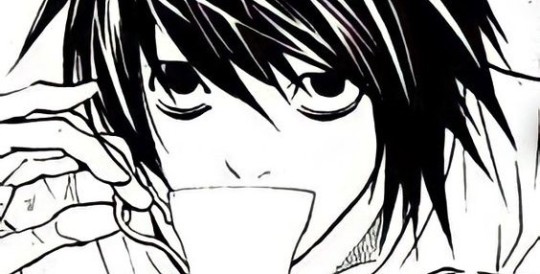
"Would you indulge me?"
Your eyes dart up from the page to his face. L looks at you like he always does ─ an intent yet oddly distant stare that used to make goosebumps appear on your arms. Nowadays you're somewhat re-accustomed to his mannerisms. He doesn't blink much, tends to stand behind your back whenever possible, likes to play with his food and enjoys invading your personal space far too much to be deemed socially acceptable.
His habits are strange but harmless.
"No," you say, just to be contrary.
L is fond of making things sound simple, and then — snap! — the trap is shut, and you find yourself doing a completely different activity than initially expected.
"I want to kiss you."
"N-" You blink and lower your book down, not bothering to mark it. "What?"
"Kissing is an act of physical intimacy between individuals," he says like it's an obvious fact and you're merely slow on the uptake. L's expression doesn't change, neutral despite this being anything but a normal conversation starter even by your standards ─ admittedly low.
"Thank you for enlightening me about the definition," you lean back against the cushions, "still no."
"Why not?" He asks after a momentary pause.
"Because I don't want to."
A simple answer to a weird request. You try to resume reading, but there're other things currently occupying your brain ─ namely the attempts to understand what prompted such inquiry.
L never asked for physical contact before; platonic or otherwise. Sure he tried to entice you into spending time with him through bargain and manipulation, and you pretended to be oblivious enough to earn an Oscar for your acting skills. However, there never was any talk of kissing involved. Any kind of touching, actually.
He hums. "Would you like me to explain my reasons?"
Sometimes you think that the sole cause of L's existence is just so he could annoy people for kicks. His questions are always peculiar, and you've learned that every single one of them is designed to lead towards some specific conclusion, preferably the one he wants. You have a feeling that if you say 'yes', L will proceed to list a hundred points about why kissing is good. And then another hundred why kissing him specifically is beneficial.
"No."
He looks at you. You look at him and raise the book higher.
"Indulging me would benefit both of us," L says, undeterred. "You're very curious by nature and I find it quite fascinating that you're able to deny your curiosity in this particular case."
Has a more obvious bait ever existed anywhere in human history? Probably not, and you'll bet your entire life savings on it too.
"I'm not curious," you lie, "now leave me alone. I want to read."
He leans forward. "You haven't focused on the book since I asked my question."
Smartass. You purse your lips and pretend that the characters are suddenly so interesting, that it's hard to look away from the intricacies of the plot unfolding inside this fictional world. At least things there make sense; no need to figure out the hidden meanings behind other people's words, because they are mostly transparent when there's a whole paragraph dedicated to the protagonist's feelings.
He reminds you of those spider-like creatures from documentaries ─ their actions seem random at first glance, yet upon further scrutiny prove to be anything but. Instead, they're meticulously crafted and executed to obtain maximum results.
L studies you for a little while longer, and eventually pads towards the kitchenette. The kettle whistles soon after as he makes himself tea; mint flavored, judging by the aroma wafting through the air.
______________________________________________________
You should have known that he won't give up ─ L is just as persistent as you are stubborn. If anything, you've set a challenge before him, and he tends to fixate on those until they are solved: a fact well-known and accepted among those who ever had a (dis)pleasure of interacting with him.
He doesn't outright ask you again, not the next day or the one after that. No. Accidentally, the only type of movies you're able to watch now are rom-coms or dramas with lots of kissing scenes sprinkled here and there between the banter bordering on cringe; sweet confessions spoken over candlelit dinners; passionate declarations whispered during sunsets... Clichés, amore, and kisses galore.
"I'm not sure this is the best movie for the evening," you say, as the screen flickers with images of two leads gazing into each other's eyes like they found the answers to every single question asked.
"The reviews are quite positive," L replies, munching on caramel popcorn.
"Reviews can be faked. And the trailer was misleading. I thought it was going to be an action movie."
"It is an action movie. The genres are listed right there," he points at the screen, and the words 'romance and action' stare back at you.
You frown and settle deeper into the couch cushions. It's uncomfortable ─ watching romantic scenes with L in the same room. His presence doesn't feel oppressive or demanding, yet you can't shake off the squirmy, twisty feeling. The kind when you enter an elevator with someone else and get slightly agitated for no reason. And so you try to slow down your breathing, but it only makes things worse. Your heart beats faster, palms start sweating and the hypothetical elevator stranger inevitably thinks that you're weird.
L isn't an elevator stranger. He's the owner of the elevator, and the entire building, and the city.
"He's going to die in the next ten minutes," you mutter.
"No, he won't."
"Yes, he will."
L hums. "Want a bet?"
Your eyes narrow.
"If he survives past the fifteen minute mark," L says slowly, "you indulge me."
"And if he doesn't?"
"I leave you alone for two days."
There's no hesitation on his side. None whatsoever, which proves suspicious immediately ─ L never offers something unless certain about the outcome beforehand, whether by logical deduction or calculated gamble. Probability factors run inside his brain instead of blood cells and grey matter, calculating risk vs return ratio quicker than any computer ever could.
You glance at the screen. It's a simple plot. There were a twist or two earlier, sure, but overall nothing extraordinary that would require hours upon hours of critical thinking to unravel.
A man, a woman. A handsome villain who wants them dead, for various reasons. They run and fight, shoot guns, dodge punches, and kiss between those because apparently there's time for romance even when a life is on the line.
It's a very simple plot; and two days are a lot to pretend that L doesn't exist. That you got rich enough to buy this kind of apartment.
"The speakers?"
"Switched off."
"The cameras?"
"Those will stay."
Of course, they will. You wouldn't expect anything less ─ privacy issues are non-existent here in more ways than one.
L isn't always a presence. Sometimes he leaves and you're alone with nothing but books and TV to pass time, but two days sound wonderful regardless. There's something in empty spaces that's enticing, even if they're temporary. L, for all his peculiarities, isn't too bad of a company. He's quiet, and often busy with his own matters. But he also has this way of looking at you that is unnerving. Like you're interesting. Or important. Or simply fascinating.
Sometimes he wants to talk, he wants to listen, he wants to ask questions and give answers until everything blurs into an amalgamation of words. It's exhausting.
Two days sound good. His hand is dry and slender. You grasp it and shake it once.
"I'll start the timer now," L says after your hands separate.
______________________________________________________
Twelve minutes.
Three more and he's dead.
You wish that he'd just kick the bucket already, so you could spend the next forty eight hours in pure, undiluted bliss.
_______________________________________________________
The male lead dies after seventeen minutes.
When the credits roll over, the apartment is silent except for the soft buzzing of electronics. You look at the screen, stubbornly, because you don't want to look at him, the owner of the elevator, and the building, and the city.
"It was close," he comments, as if trying to comfort you, which makes it even more of a sore spot.
That’s what L thrives on ─ technicalities, loopholes, small and seemingly insignificant details which are easily overlooked, yet make a great difference. You're not sure if you're annoyed, or disappointed. And what’s more important ─ at whom.
You have known for years that L tends to get his way eventually whenever there's something specific caught up in that head of his; a fixation which refuses to leave until satisfied, and sometimes even after. Snap. You can get up and head out of the living room, you know you can. Will you though is another question entirely.
L isn't a typical captor ─ he doesn't demand or force you into things. He simply presents a possibility and waits. Not aggressive or domineering, not sadistic. But oh he is a PhD of holding a grudge. Leaving now probably means waking up tomorrow and finding that every single disk has vanished without a trace, along with the bookshelves being switched for some obscure scientific texts on chemistry, physics and other things that require an advanced degree to fully understand.
Because someone decided that you don’t deserve entertainment anymore. Because someone is petty enough to deprive you of basic mental stimuli, and is stubborn enough to hold onto that decision even when reasoned with. Unsuccessfully.
It's a talent really, this particular brand of making your life miserable in many small ways, so they accumulate into something greater over time until you feel like the walls are closing in slowly but surely.
You can't back out, even though no one openly stops you from doing so. And L knows that. And he knows that you know. His lips twitch and curl upward before flattening again into neutral territory.
There's a theory that if you pull a band-aid fast enough, it won't hurt as much. The credibility behind it is questionable.
You exhale and meet L's gaze ─ his posture hasn't changed from the beginning to the end of the film, knees tucked to his chest, eyes two dark pools that stare without blinking. His fingers drum a steady rhythm, and that's probably the only sign that gives it away.
Anticipation.
"Fine," you say finally.
His mouth opens before closing back again. L doesn't move a bit.
He wants you to do it, you realize. Wants you to initiate instead of just allowing it. What an ass.
You squish his cheeks between your palms until his lips pucker outwards. L makes a soft noise of surprise but doesn't try to fight back.
Black lashes cast a shadow across his skin. There's no perfume or cologne, no distinct smell ─ he uses plain soap and shampoo which don't have a discernible aroma.
"I believe I was promised an indulgence," L says, voice muffled a bit by your hands on his face.
He looks like a fish this way. A silly, ridiculous image that would make you snort if not for the situation at hand.
Band-aids and ripping them off.
You sigh, lean forward, and press your mouth to his.
He tastes like caramel popcorn.
Mint tea.
Indulgence.
The angle is awkward, and L doesn't move an inch to accommodate the position. He stays still like a block of solid rock, not a single muscle twitches, and doesn't even attempt to reciprocate. You have half a mind to think that maybe he's mocking you, but then his fingers lightly curl on the fabric of his jeans. L's eyelids flutter half-closed when your noses bump, then open again right after. Another oddity added to the pile.
It lasts no longer than ten seconds before you pull away. L blinks. Touches his lower lip with the tip of a finger and rubs it like searching for traces left by the contact.
"You were promised an indulgence," you remind him, trying to sound calm, collected, but your ears and neck feel hot, "not a make-out session."
Technicalities and loopholes.
L has that look you can't quite pinpoint yet know far too well. You've seen it many times before. When he thinks about something but keeps it to himself for now.
"You look more lively," he remarks eventually. "Healthy complexion suits you."
You don't need to hear what he says next, because the words already ring through your head.
"I told you it would benefit us both."
#shalott fanfiction#shalott imagine#yandere#death note#yandere l lawliet#yandere l lawliet x reader#yandere l x reader
139 notes
·
View notes
Text
Interesting Characters Do Things the Reader Wouldn't Do
I've been thinking a lot about what makes an interesting character. As a topic, the variety of answers and strategies to creating interesting characters could be literally endless. But one element I've been dwelling on is based on observation of how characters who fascinate and delight us are the ones that do things in ways that we, the audience, generally wouldn't do them.
I'm thinking about this from two angles:
How to make characters who do things the average person wouldn't do (in an interesting way).
Why derivative works like fanfic often experience character drift, where over time, the character who does unusual things and has unique reactions in canon drifts away from having these unique characteristics, and becomes increasingly generic and/or like the author.
Let's address Point 1 first. The way to make a character who does things in an unusual manner is, in theory, to make a unique environment and/or a unique character (bonus points for both).
For example, a unique environment is core to many exciting fictional narratives. Most of us don't have to grapple with what we would do, for example, if we were faced with a Bad Guy Who Wants to Destroy the World That Only We Can Stop.
Or, on a less "epic" level, most of us on average don't have to deal with, say, the whacky hijinks that formulate the meet-cute in a romcom, even the more mundane ones like spilling our coffee all over a beautiful stranger and scrambling to make it right, leading us to the love of our lives. These in general are not daily occurrences, so it's immediately interesting to see how the character would handle the situation, even if they do so in a sort of "average" way.
For example, in my mind, the "average" way you respond to a Bad Guy Who Wants to Destroy the World That Only We Can Stop is to step up to stop the bad guy. If you're really the only one who can Stop the Bad Guy, I think the all of us would at least like to think we would accept this challenge, especially if The Fate of the World was objectively, provably, at stake.
Now, I think with this example, creative types can spot the issue right away. The hero who heroically does what we average people hope we would do in such a crazy scenario, step up and help save the world, is actually really boring.
Your typical Good Guy Protagonist who does the Typical Thing when faced with this Very Generic Plot is really goddamn dull. There's a reason these heroes who help propel their Gang of Heroic Misfits to actually Fulfilling the Plot and Saving the World are usually saddled with a Comedy Relief Character and at least one person who voices misgivings (usually with some degree of sarcasm or humor) about the risks involved with volunteering to save the world.
Han Solo in Star Wars, Jack Sparrow in Pirates of the Caribbean, are beloved characters because they don't leap to Save the World and Fulfill the Plot. Instead, they do unexpected, unique things. They're in it for themselves and that colors their reactions away from generically Doing the Right Thing. They want things like money, or safety, or more rum. They want less impressive human things that we can nonetheless relate to, and they pursue those things with a level of style and humor that the protagonist, like Luke Skywalker or Will Turner, are not necessarily afforded as our generic Audience Stand-In/Hero because their job as The Hero is to go on a hero's journey, increase their skills over time so they can learn things and strive at the same pace as the plot progresses and, in general, are saddled with Fulfilling the Plot.
Now, that doesn't mean the main hero/protagonist always has to be boring. It is possible to have a protagonist tasked with Saving the World who isn't boring. But this requires they address the problem in a way the average person wouldn't. This doesn't necessarily mean rejecting the call to save the world, by the way. What it often means is going about saving the world in a way that is unique to them or that shows a unique understanding of how to respond to the threat, in perhaps a more subtle or roundabout way other than just going the most obvious direct route.
One way to figure how to make a hero who goes about Fulfilling the Plot in a more interesting way is by making them want something in addition to their desire to save the world.
For example, Newt from Pacific Rim, the Kaiju-obsessed scientist (while not technically the hero of Pacific Rim's A Plot, I see him as the protagonist of the B Plot) wants to save the world, obviously, he's one of the idiots who lives there. Everyone in the story of Pacific Rim, particularly those in the Shatterdome, want to save the world, that's a given. How they go about it is what makes them unique. What they want in addition to saving the world makes them unique. Newt wants to study Kaiju and is obsessed with them on a level that is comparable with his drive to save the world. This colors how he goes about saving the world, by sticking to his specialty of studying and understanding Kaiju.
While the most obvious way to save the world in Pacific Rim is to jump into a giant robot and go punch Kaiju, which is what our A Plot protagonist Raleigh Becket does (and he is, apologies to his fans, a bit boring as a result), Newt's B Plot protagonist way of going about this shows that the problem is bigger than one hero offering one simple solution can provide, which helps expand the world and the scale of the threat. And there are many interesting (arguably more interesting) ways to address this threat than being the butt-chinned golden boy jumping in a giant robot to offer the most direct solution to the problem. As a result, to me at least, Newt is a more interesting protagonist, because his entire personality isn't based on the most obvious, direct way to Accomplish the Plot (like Raleigh's is). Instead, he wants and likes other things too, specifically Kaiju, and thus he goes about Accomplishing the Plot in a less generic way that includes his special interest.
To go back to the romcom example, likewise, just to show that an epic plot isn't necessary to accomplish an interesting character, I think it can safely be said that the average, generic thing that your average sane human being would do if they accidentally spilled coffee on a beautiful stranger (thus kicking off the romcom) would be to apologize and help them clean it up.
That is, as noted, boring as hell. Because it's what anyone would do, by the way, what anyone should do in this circumstance.
Fiction doesn't need to be an object lesson. We know the script of what should happen in this scenario, so we are immediately interested if it's not what happens.
The manic pixie dream girl who, instead of simply apologizing and helping to clean the spill, instead grabs the protagonists' hand, rushes them out the door and declares they're being chased by spies, quick, come with me we have to hide! all out of an attempt to help the protagonist get out of the embarrassing situation so she can help them clean up somewhere else is at least slightly more interesting than the average polite response. If we dig into it to find out why she came up with such a bizarre response to helping someone clean up, instead of doing the generic thing, we begin to unlock a more intriguing character. Maybe her therapist just told her get out of the rut she's in by treating her life as an adventure and she took the advice a bit too literally. Why was she in therapy? Well, presumably we'll find that out as the story progresses, but at least now we've got a hook to wanting to know more (how effective such a hook would be is up to you).
TL;DR Characters who go about Fulfilling the Plot in a way the average person wouldn't, because they want something else just as much if not more, is an immediate recipe for making a more interesting character.
Now, Point 2, the character drift back to the center is also worth examining. I see it happen quite frequently, both in individual fanfics, in ongoing mainstream franchises, and in fandoms in general. This isn't quite the same as Flanderization, wherein complex characters get boiled down to simplistic reads of their crazier attributes. Rather, what I'd like to look at is when unique characters do the opposite, and increasingly act and behave the way the average person would. Or rather, the average person who matches the demographic and community of the writer.
An example that springs to mind is when a complex, indeed, Problematic character begins to open up about their emotions in fanfic, and speak and act in line with the most cutting edge progressive terminology, or in general talk about their emotions like they're a therapist. Characters who would rather die than show weakness in canon suddenly saying things like, "I'm sorry I got angry with you, I realized it's because of unresolved issues with my father and also, I am attracted to you, which made me self conscious about my appearance when I am around you. Please accept my sincere apologies. Perhaps we can discuss our relationship and consider becoming romantic partners?"
Obviously I'm exaggerating here (unless the character is an android). But while really no one in the real world talks like this, I'm going to refer back to the Saving the World example about how the generic thing we wished we would do when faced with such a conflict is actually the most boring response for a character.
We all hope, I think, that if we hurt our romantic partner's (or romantic prospect's) feelings, we would find the courage to apologize, explain ourselves, and do so in a way that was dignified for us and effective with them. How to do that is another question. What to do when we have imperfect knowledge is a question. What we do when we want something else more is a question and with characters, it's the more interesting question.
Perhaps the protagonist wants to apologize and would love to find a way to be romantically involved with their love interest, but they have no reason to believe the apology would be accepted, their dignity would remain intact, or that revealing the truth would culminate in a relationship rather than a painful rejection. Now you begin to have conflict, which is the stuff stories are made of. If the protagonist wants to save face more than they're willing to risk that rejection, instead of apologizing they may have a more tsundere response (often seen in fiction) of just getting more angry, or blaming their anger on the love interest for frazzling them, or finding a way to avoid the situation entirely because it's scarier than communicating openly.
TL;DR - The most morally upright, correct, and laudable response to an interpersonal conflict is probably the more boring one (unless it is somehow earned as a novelty by the narrative). People are complicated. Interesting characters are even more complicated than real life people. Lean into that.
Now, here are some reasons I think you see this sort of character drift towards the milquetoast in derivative works:
Fanfic is about fulfilling the need for something that isn't in canon. That's often its entire purpose. So of course characters who would rather die than communicate begin to communicate, and communicate well and transparently. That's the itch the author is trying to scratch for themselves and others. It's not a bug, it's a feature.
We all want to be liked. When writers put the character in a situation, and then put themselves in the character's shoes and think what they would do in that situation, there is a tendency towards politeness, appeasement, communication, and mending bridges as our first instinct for what should be done.
To delve into point 2 here a bit, the tendency to want to be well liked and to mend bridges is a good skill in the real world.
But fiction isn't the real world.
I don't really particularly want to read a story where a character does everything I would have done in that scenario, whether it's saving the world or navigating a meet cute. That's boring. I want to see what someone who isn't me would do, so I can live vicariously through them without suffering the consequences personally.
If I as myself met, say, the evil scientist behind a rogue plot to destroy the world, I'm not even sure I'd be able to yell at that person because of how badly I want to be Well Liked. I'd probably just call the authorities (assuming the Evil Scientist isn't allied with them) and remand them into custody and hope they get a trial before facing their just punishment.
That is a very boring way to resolve a conflict with an evil scientist, unless you're Terry Pratchett, making a wider and very important point about the intrinsic value of due process in a moral of the story that is deeply intertwined and well supported by the text. But the point in a Terry Pratchett book where due process is honored would be that due process isn't the easy thing to do in that scenario, it is the more interesting thing to have the hero not turn vigilante, because it's harder and it's an unusual response that not all of us would do in that situation.
There's a great moment in the show The Expanse, where the evil scientist example comes from. One protagonist (arguably the more more boring one, at least at that point in the story) hears the Clearly Very Evil Scientist offering information in exchange for his life. But we all know if the scientist is spared, evil will go unpunished, his evil work might even be continued by the powers that be since it is valuable, the victims to that point will go unavenged, and the Evil Scientist might even make a comeback and regain his freedom and power down the line. But what else can you do? He's the only one who can help. Without his knowledge, the heroes are back at square one. The obvious choice, the only choice for your average person, is to grin and bear it and remand the Evil Scientist over to custody for a fair trial and so valuable information can be gained from him, even if down the line it might lead to more evil.
The second protagonist shoots the Evil Scientist in the head. Right then and there.
It's a shocking moment. It's also an epic moment. It is not something the average person would have done. But it was something that arguably should have been done (in that very unique scenario) with the clear-eyed decision making made by someone who refuses to bend their morals. It's something we all might wish we would do, like save the world, in that scenario but it's done in a unique and interesting way that, more importantly, creates more conflict than it solves. It neatly sidestepped the generic, expectable plot of this Evil Scientist becoming a recurring villain, and instead demonstrated a person who is very different from the average person, demonstrated by how they take an extreme action that therefore made for a better story. Shooter Protagonist did this because he wanted to avenge the victims of this scientist and stop this particular scientist from doing more evil more than he cared about how the information this scientist had might serve the heroes in stopping the overall plot. It solved one long term problem, maybe, by eliminating Evil Scientist, but it created more because now they can't get info out of Evil Scientist and the quest just got harder. But, the victims are avenged. And possibly, we'll never really know, a greater catastrophe was averted by not sparing the Evil Scientist here.
TL;DR: To sum up really, in my eyes, the key to interesting characters in original fiction and fanfiction is to have characters who want to do something other than just fulfill the plot in the most straightforward and logical way possible, whether that plot is saving the world (in the most generic way possible) or whether it's getting their love interest to like them (in the most generic and nice way possible).
Making characters who have other priorities or who want something else just as much if not more (to study monsters while saving the world, or to spice up their life having imaginary adventures while making this other person like you) are instantly more interesting. Layer more of those on and you're well on your way to an intriguing story.
And if you're trying to write good fanfic, take note of all the places where the protagonist does things you wouldn't do in a way you wouldn't do them. Therein, in my opinion, lies the key to interesting characters.
Losing that element and making unique characters act more and more the way we would in the same scenario is what makes them boring over time, it's at the heart of how fandoms can improve some stories (with creativity if they dream up more unique characteristics and adventures than canon does) but can also degrade others to the same cookie cutter stereotypes by polishing away the rough edges of a character until everyone is just Really Nice and never messes up or does anything wrong or unpopular or rude or bigoted that could get in the way of them Fulfilling the Plot (or romance) of the story in the most direct and generic and dull way possible.
138 notes
·
View notes
Text
Mabel's perspective in Sock Opera is equally, if not more sympathetic than Dipper's: An Essay
Most people generally wouldn't consider Mabel to have a terribly sympathetic plotline in Sock Opera, even those of us who don't necessarily feel that she's horribly selfish. I think that's because, from a narrative perspective, her plotline is (as it so often is) shafted in favour of Dipper's, and from a viewer's perspective, Dipper's makes more sense. We, as viewers want to know who the author is. We, as viewers, know that Gabe is inevitably going to turn out to be some variety of impossible, and we know that the Author of the Journals is a major mystery. However, from Mabel's perspective, none of this is true, because she doesn't have the luxury of knowing she is in a TV show. Even if you take out Gabe, her perspective still makes perfect sense.
At the beginning of summer, Dipper found this journal, and Mabel has generally been pretty happy to go along with his adventures as the journal has led them, but it's clear she doesn't have the same degree of fascination with it. Maybe she may have been a little intrigued by who the Author is, she's probably a bit curious, but not to the same extent. By the time of Sock Opera, she's probably reasonably ready for the Journal fixation to be over, considering that they nearly all got killed by a shapeshifter trying to find the author. She knows that trying to investigate the author is dangerous--Stan warned them away from the supernatural, they've all nearly died multiple times, but Dipper cannot be stopped. And now Dipper has decided to spend hours and hours and hours, forgoing sleep, sitting in front of a screen, typing in passwords. The fact that Mabel tries to drag him away from it is a good thing--anyone with a relative who spends excessive amounts of time in front of a computer can tell you that. Generally, having someone close to you become deeply fixated to the point of obsession with anything can be challenging, however in Mabel's case, Dipper has become obsessed to the point of prioritising getting into the laptop above anything, and this isn't just a regular hyperfixation: this is a hyperfixation that has nearly gotten them both (plus their loved ones) nearly killed multiple times in the last few weeks. It's absolutely the responsible, good thing for Mabel to do to not enable that behaviour.
And then if you add the puppet show back into the equation, then yes, it is kind of ridiculous of Mabel to put on a whole show of that kind of magnitude just for a boy (regardless of whether the boy deserves it), however, as viewers we must accept that this is, in fact, thoroughly within character for Mabel, who is kind of ridiculous. Any kind of production of that size is a huge commitment, especially if you've given yourself a week to work, and I'm not remotely bothered by the fact that Mabel has to get everyone involved on this. And to Mabel's credit, she does try to help Dipper as soon as he appears to her in puppet form, she just isn't immediately willing to stop the show. Back in high school, my drama class did a play that I mostly wrote, mostly managed and also had a small acting role in (yes, I was an overachiever in drama), and let me tell you, it would have taken a lot to have gotten me to call off the show halfway through, much less publicly sabotage it. A demon threatening the lives of one of my siblings? Probably yes. That probably would have done it. And Mabel does allow the thing that she poured blood, sweat and tears into to go literally up in flames in front of everyone, once she realises that's what she has to do (and personally, I don't think that there's anything wrong with not immediately being willing to drop everything for this. It's not like Dipper doesn't dig in his heels about doing what's best until the very last possible second). I don't know why people insist it's not 'technically a sacrifice', because while, yes, obviously Dipper's life was more important, and she 100% made the right choice, it's not easy to wreck something you worked hard on in front of people.
All this is to say that although it's easy to become irritated at Mabel during this episode because she's hindering Dipper's ability to figure out who the author is, it's also very easy not to realise that she has a thoroughly reasonable perspective, simply because the narrative puts greater emphasis and attention of Dipper's perspective.
165 notes
·
View notes
Text
Some extra thoughts about the Octavinelle boys' kinks
Minors/ageless blogs DNI; all characters are 18+ for these scenarios
I'm back with few more ideas I had, expanding on this post of mine
Warnings: Smut, 2nd person and 3rd person neutral pronouns, discussion/mention of multiple kinks of different varieties, including those related to D/s dynamics, feeding and stuffing, lactation, etc.

It is somewhat dependent on how he feels at the time, but Azul usually finds bondage to be incredibly soothing. The sensation is comforting, and it gives him a sense of security and safety, especially since there is so much trust involved. He’d be likely to even give mummification a try at some point, and would almost definitely like it. (He finds it cozy/safe, as well as arousing.)
I'm 95% sure that the Leech twins would like something to do with feeding and/or stuffing. They both (canonically!) have a focus on feeding others, and watching others eat - especially Floyd - and Jade often talks about eating, and/or is shown eating huge quantities of food. It’s a little wild, actually! Chances are, Floyd prefers to feed his partner, whereas Jade prefers being fed (though he also enjoys feeding too), and it seems likely to me that Floyd would be more interested in feeding, whereas Jade would be more interested in stuffing.
I'm certain that Jade likes seeing people cry. He'd find it not only amusing, but in the right situation, incredibly arousing as well. It wouldn't matter if his partner was a "pretty" or "ugly" crier, just watching them break down sobbing from emotion or sensation - seeing the effect he has on them - would excite him greatly. And if the tears were accompanied by babbling or begging? Jade would be in heaven.
Floyd's lactation kink is mostly in the realm of interest / curiosity, rather than pure desire. While all three of these men don't have nipples in their original forms (since they're... y'know, not mammals), I think Floyd stumbled upon the concept of lactation, and simply found it to be especially fascinating. Like… people just make milk? And it's technically possible for anyone to do it? He finds the thought pretty hot, and would love to experience it in some form or another at some point. Whether that’s working towards you lactating, or possibly even inducing it in himself, Floyd may end up quite interested in this kink for a period of time!

I'd love to hear your thoughts / opinions on this, or anything in the original post ^v^
#mdni#twst headcanons#octavinelle#twst smut#azul ashengrotto smut#jade leech smut#floyd leech smut#x reader#twst x reader#azul ashengrotto x reader#jade leech x reader#floyd leech x reader#twst thoughts#blusher's original ♥︎#ignore the fact that this is coming a month and a half after the original post#I'll be continuing with this series - promise!#I also will try to find this one post I came across looking at all the references to feeding/eating with the octotrio#because there are a LOT
58 notes
·
View notes
Note
Hey Yuurei ^^ - Question!
So, as far as I'm aware the flashbacks we see at the end of the chapter are player and overblot character specific - MC and Grim do not witness them. (Right?) Nor do any of the other students really have a deep understanding of the other characters motivations beyond what they yell pre-and post overblot
(and honestly this kinda ties into why I don't really understand the Therapist Yuu joke - in the game particularly, MC doesn't really do much to comfort let alone really understand the Overblotters? Azul has a moment, but otherwise not really. (I feel like the Manga and Book get into that territory a bit more though)
ANYWAY
My question is if as far as you've seen, the characters seem aware of the backstories of the other characters? In Masquerade, it does seem like Azul and Malleus (more Azul) seem aware of Idia's relationship to the dead sibling topic. It also seems like the Heartslybul characters are more aware of Riddle's background, but I'm not sure about anyone else.
Hello hello! ^^ Answer! Thank you so much for this wonderful question!
As far as I can tell the flashbacks are between the overblot victim and the player, with no other characters (or the prefect/Grim) involved!
There are never any dialogue boxes or internal monologues from the prefect insinuating that they witnessed the flashbacks.


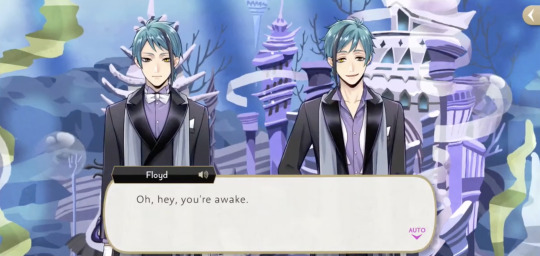
There are similarly no insinuations in the manga (only the Heartslabyul arc has been completed as of this post), and in the novel the point of view changes entirely to the overblotter.
There is no internal dialogue or narration to insinuate that the prefect is aware of the post-overblot dreams, and in Heartslabyul novel the prefect silently reflects (after Riddle has recovered) on how much none of them know:
"‘But…things got so bad that he overblotted. I think the housewarden has his reasons. Clover-senpai won’t say anything, though.'"
"Riddle had conjured enough excess blot to exceed the capacity of his stone. The depth of his sorrow and rage is simply too much for Yuuya and the others to understand."
- Twst the first novel
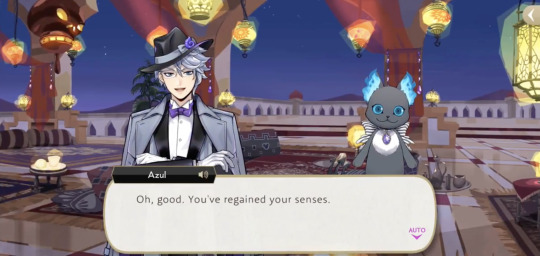


The other students seem to mostly be waiting for the overblotter to wake up in the game, which we can probably assume is what the prefect does as well.
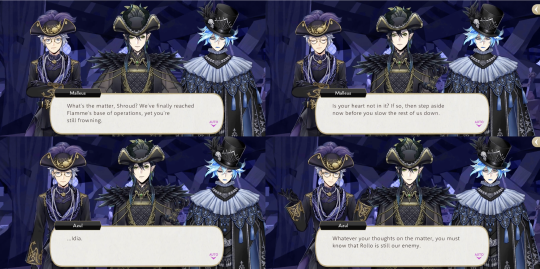

Azul and Idia do seem maybe the most curious of the group, but then there is the end of Book 6 where Rook explains, "He--or rather, they--chose to try and boost their brother up from the depths below to the skies above," insinuating that he knows about dead-Ortho.
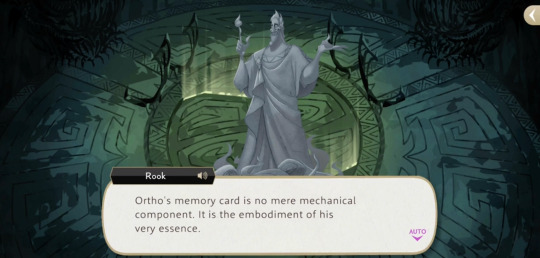
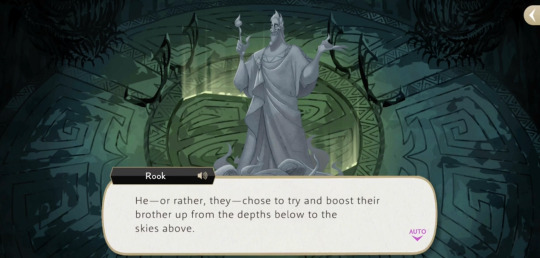
Rook is speaking openly with Vil, who seems to know who this "they" refers to, so it might be safe to assume that the kidnapped overblot victims know about dead-Ortho!
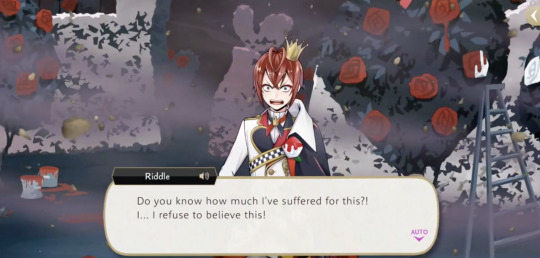

As for who knows what, I think Riddle and Leona might be the most secretive of the overblotters! Riddle has a line about how much he has suffered and Leona mentions being loathed with no present and no future, but we get a detailed mission statement from overblotting Azul.

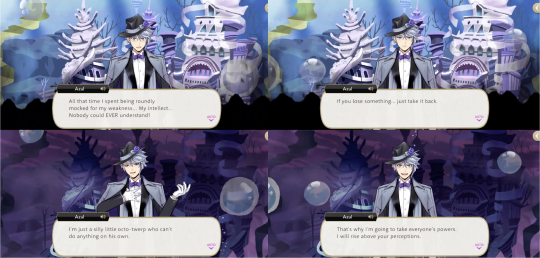
It seems Azul is able to deduce Jamil's motivation based on Jamil's pre-overblot monologue, while we receive vague but not inaccurate information from Vil, as well.



Malleus also presents a statement of intent for his overblot.


To the original question: you have a good point about the prefect not really serving as a counselor! They seems to have limited one-on-one screen time with any of the characters besides Grim, Ace and Deuce.
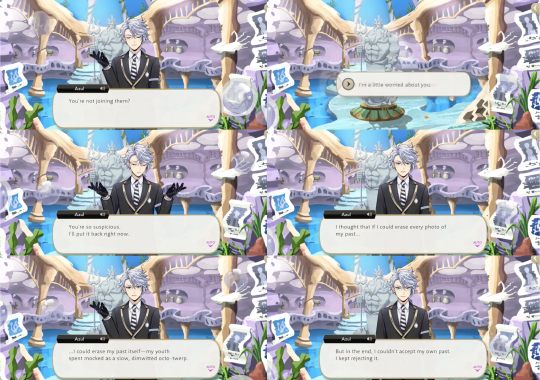
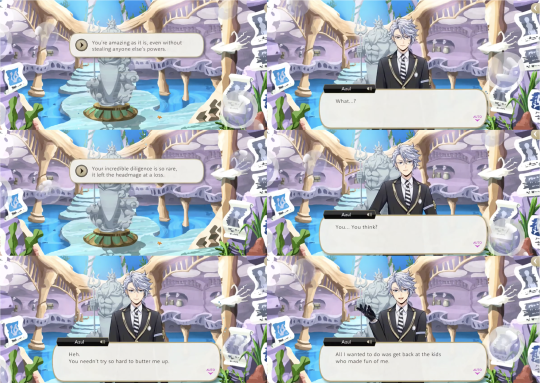
This makes the end of Book 3 all the more fascinating, as you say!
Is Azul the only character with whom the prefect has ever had a one-on-one conversation about what happened, encouraging him and complimenting him?

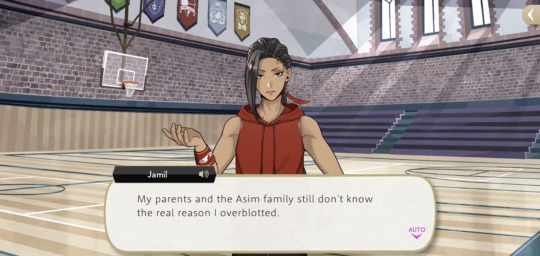


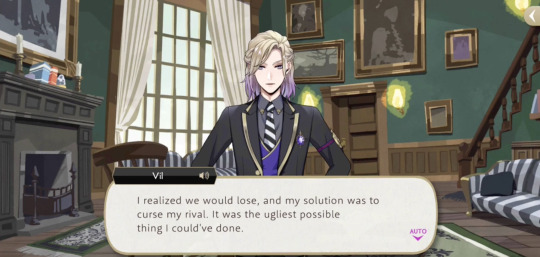

(While there are follow-ups with Jamil in Book 5 and Vil in Book 6, they are both group conversations rather than a private moment between an overblotter and the prefect alone.)

(The prefect also interacts briefly with a post-overblot Leona in Book 2, but it is in a crowded room with the prefect calling Leona out for not showing remorse, which is also a little different from the moment between the prefect and Azul.)
While I find the "prefect acting as school counselor" fandom-joke to be very cute, you may be correct that it is not exactly an accurate representation of what is happening in the game ^^ (similar to the joke about STYX being the government!)
51 notes
·
View notes
Text
100 Epitaphs thoughts!
Alright, so like I said yesterday, I unfortunately did NOT have the time to write out all my thoughts and had to wait until tonight to do so. No particular order to these, it's word vomit time.
(warning: this is LONG. it's not even all my thoughts. i cut myself off at parts. this song is so good guys.)
1) YURA AS THE SUN!
I'VE BEEN FUCKING SAYING AND IT KEEPS BEING THERE AND I KEEP GOING INSANE ABOUT IT. especially in conjunction with the fact that, yknow, the sun hurts sanya. the icarus symbology is THERE it is PRESENT i KNOW this is gonna down that awfully (sanya please dont die. but also that would be the perfect resolution. GOD) and i'm so ready for it.
ALSO: "ready to be blinded by the breaking day" -> "the visionless (sergei) leading the blind (sanya)", and we know she's got bad eyesight. doesn't mean it couldn't get worse. the lines "loose compromise / where the sun won't set / as long as i can set the stage" are also interesting wrt yura-as-the-sun, as you can take it both as sanya saying that as long as she has any kind of control she will stick with yura and help him in whatever insane plan he's got going on, but it's also her saying that she will always, always make the choice to put herself in danger.
yura is the bright relentless sun, and sanya's got very sensitive wings.


2) the parallels between sergei and sanya!!!!
i think what really fucks me up about them is that, at their core, both of them just want to keep the people they care about the most safe. for sergei, that's sanya (and olga, but she's a grown woman who makes her own decisions while sanya's his little sister and also his only remaining family, so it's different), and for sanya it's yura (who, to her, represents freedom—"but the wiser you is [FREE]"—and an escape from her current life, which is everything she dreams of.) and it absolutely ruins their relationship!!!! and it ruins me!! every time!!!!
and on that note, "the tepid autumn day is starting to thaw" is 1. a genius a callback ("a thousand years ago it was a tepid autumn day" + "a day will come warm and bright when i tear down these dismal shelter walls"), and 2. a signifier that shit is about to Get Real. even if you don't read the explanation in the doc, we still understand that the action is going to pick up like crazy very soon. i believe someone also mentioned how it could represent sergei and sanya's relationship going downhill, although im not the expert on that so i wont do more than mention it.

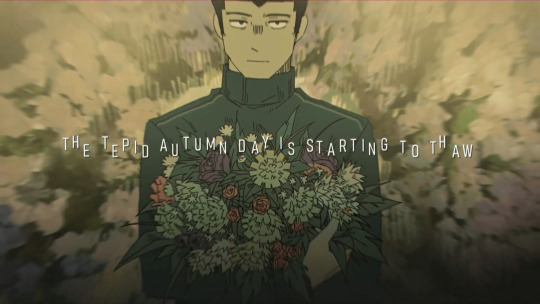
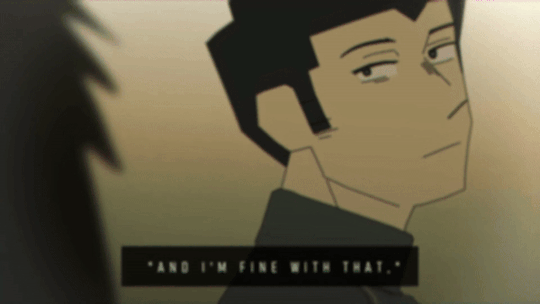
3) this was SUCH a good dive into sanya's character.
honestly her songs have consistently been my favorite of the lot and i think it's because her personality and her character are just. perfect for these kinds of character studies.
this entire song is at once her forcibly entering herself into the narrative after being so completely seperate from it for like, the entire series up to now (there were some very good posts by some very skilled people on this exact topic but alas i have lost the links to it, if anyone has them lmk) and ALSO an exploration of her trauma (almost everyone she knows seemingly dying on her or disappearing from her life in another sense) in such a fascinating way.
there is such a depth to all her actions here and the song explains why she clings on to yura as much as she does, and it's because he's (along with sergei, but she resents him for isolating her) all she has left, really! of course, there are the BG gang, but they aren't as involved in the story and sanya doesn't seem to be as close with them as she was with yura. it also gives another dimension to her wanting to join in rescuing KT: this isn't just her wanting to rebel and/or do something with her life (both of those things already being associated with anya & yura respectively) but her having the chance to get someone she cared about back into her life after they were taken from her. of course she'd want that, after a lifetime of losing people.

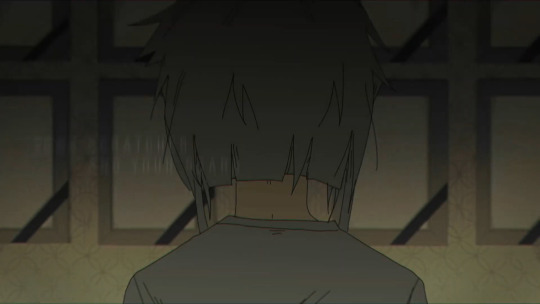

a bit of an extension to that last point, i think it's also really incredible how ferry manages to portray how complicated sanya's relationship with yura is. i find these two shots in particular ->
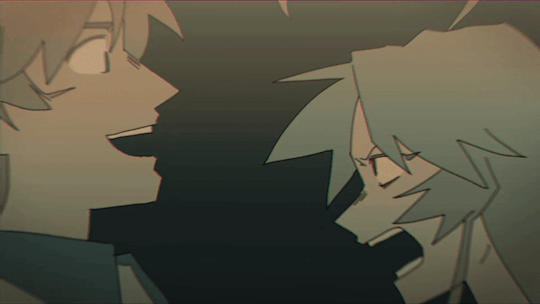

<- really interesting, because they are actually really similar! i think it's a great way of showing how sanya is both angry and resentful of some of yura's worst traits and refuses to stand for them, but that they are still at the end of it all friends who have fun together. they're just kids who have no idea what they're getting into! if you look closely at the second one, she's shushing him for being too loud. (hell, i'd be willing to bet that she probably felt similar to how she felt before yura snuck her out to her first party right then.)
her (budding) dynamic with dima is also quite fascinating, and manages to say so much about her, her thoughts about KT, and dima all at once. it's just masterful. her segment with him displays:
the fact that she deeply cares about KT, and wants this to go as perfectly as possible, even going so far as to put herself in more danger than necessary.
her absolute determination to get this done, even though she knows she won't make it out unscathed ("i'm aware no soul can enter / roam its halls / and come out clean")
her feelings about her family and how she perceives herself and the legacy she has been given ("and it's like that / and i'm like that / and i'll always bear this stone")
dima feeling actual empathy after meeting another mutant! poor guy has no idea what's going on. but i think it's a really important step in his character and might even get him to actually open up.
i need to stop with this section before it takes over the whole post.
4) KATA-FUCKING-BASIS! (and eurydice!)
(thank you light for teaching me that word)
not much to say about this one but the descent-into-the-underworld vibes are off the fucking charts! we got death imagery with katya already with THIS:
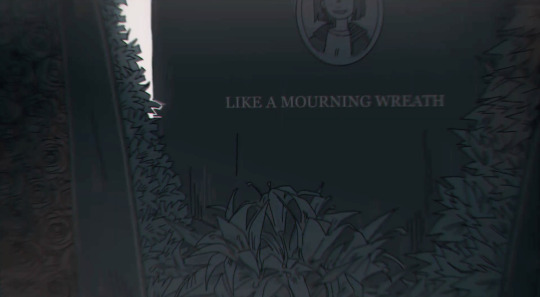
and so, in a way… whoever makes the trip to the facility? to retrieve katya? the metaphorically dead girl? that's a trip to the underworld, baby! that's katabasis!
and you know who else goes through katabasis to retrieve a girl from the underworld and bring her back out?
that's right!
ORPHEUS!
which. like. we already kind of knew it, but.
this plan isn't gonna work out well, is it.
112 notes
·
View notes
Text
scrolling through various people's dracula daily tags on the bus because this book is all i want to think about right now i was reminded that seward is only 29 (with his own lunatic asylum!) - which struck me (a 34 year old) now in a way it didn't before i'd gotten to know him and the others, way back before most of the Plot had happened. jonathan's Baby's First Job energy and mina's excitement about her impending nuptials radiate off the page, but seward's diary is so self-serious and intense that i think mentally i'd automatically been picturing him as much older, even though he's a longtime bro of arthur and quincey. it makes his self-seriousness, and his near-worship of van helsing, more endearing to me now that i've corrected my image of him - and it REALLY gives an even better cast (read: more delightfully awkward) on the scene where he and mina talk diary-stuff to remember they're likely fairly close in age.
it also just made me appreciate that this is ultimately a novel about fairly young people / a text i can slot into my personal canon of Texts About Your Saturn Return, and makes me think also about both the fact that the character relationships center on two engagements (this is literally what your late twenties is), and about all the non-dracula-related death content that permeates the book, from the parents and parent-figures dying left and right to the old man in whitby's monologue about the deaths. none of these bright, healthy, life-loving twenty-somethings have yet had their lives warped by tragedy, and the thing is, that's pretty normal. having your first brush with tragedy involve an undead bloodsucker hunting you and your pals is not normal, but hitting something on the road to thirty that changes you from a person who has never lost anything that mattered to a person who has kind of is.
i dunno, there's something oddly sweet to me in thinking about that - about how dracula is a book about unspeakable horrors, and also a book about when you're in your late twenties and you thought this was the part of your life where things were settling down because everyone's getting engaged and you finished grad school and you're in an actual career now, and then your friend's mom has cancer and you don't know what to say because you've never had to say something about this before, and at the funeral it occurs to you that it may be a while before the next one but this is something you'll be doing for the rest of your life. at the beginning of the book, four of the characters - jonathan and mina, lucy and arthur - think they're a few months away from their happy endings, while a fifth, seward, our last major POV character, is contentedly speculating about how his fascinating new patient may afford him opportunities for major advances in his field. now, one of those happy endings is shattered brutally for good, while the other one has technically transpired but looks nothing like they'd imagined, and renfield is dead while thoughts of his career couldn't be further from seward's mind. this is all very late-twenties, to me: the time when it starts to really click inside you that there are no endings until the very end.
anyway. i guess what i'm saying is, bram stoker's 1897 gothic horror opus is actually a coming of age novel, and i for one would fucking kill for a modern adaptation that really leans into this aspect.
#i don't think a modern adaptation of dracula is totally possible because of how it's a novel about like#exactly what it felt like to be a white guy in victorian england specifically in the year 1897#but if someone wanted to get creative with the bones of the story... this is a thematic direction i think they could consider#dracula daily
1K notes
·
View notes
Text

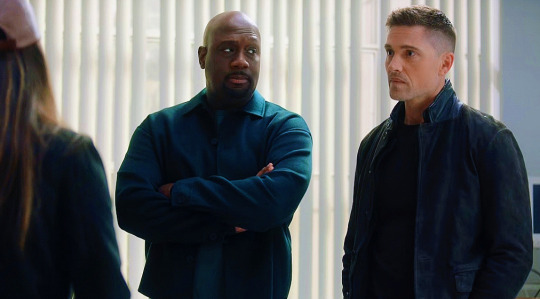
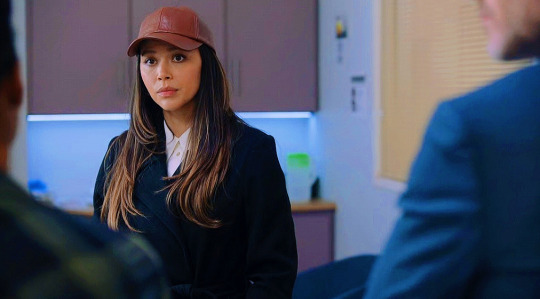

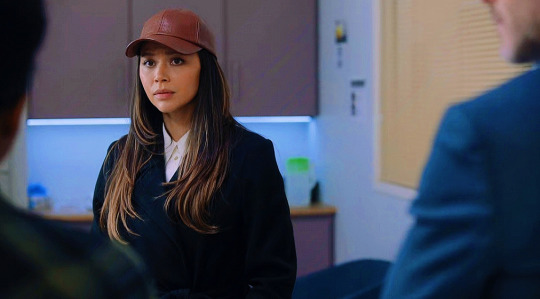
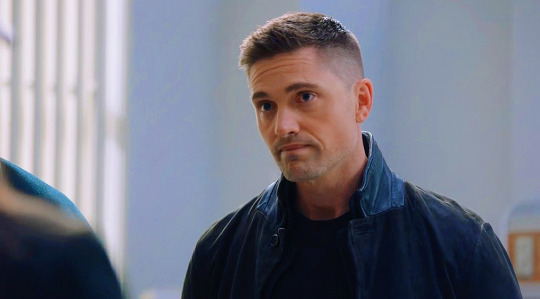

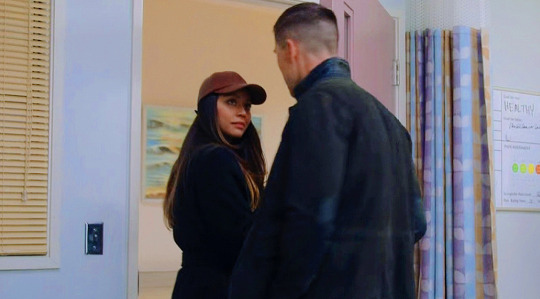
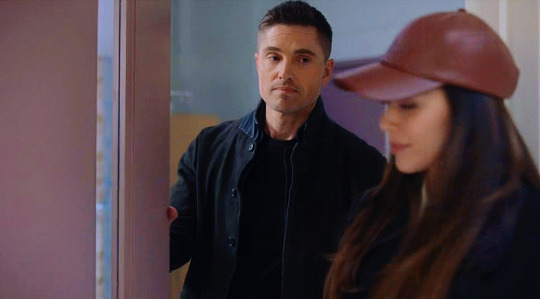
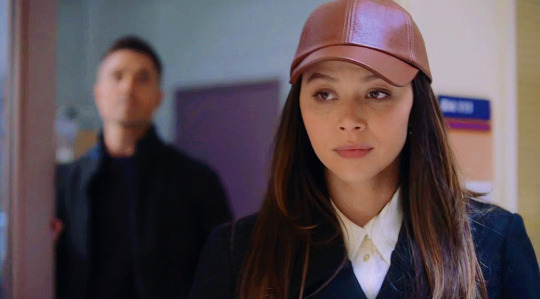
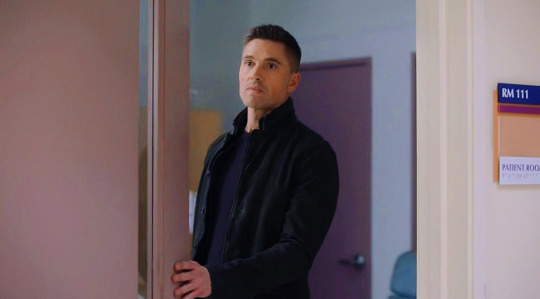
You gotta treat this like any other op and treat Lucy like any other UC. I know.
| ANATOMY OF A SCENE - CHENFORD EDITION
5.21 - Going Under
I have said it before but the way this episode took a different approach to depict this undercover mission is fascinating. Unlike Lucy's first solo op that focused on how lonely it could be from her perspective, particularly in the montage at the motel, this one rather emphasised how she was always connected to Tim… The phone calls, the text messages, the surveillance… The laundry room… Or here at the hospital. That is not to say she was never alone : just that Tim was never far away. There was always an invisible tether biding them in some way…
Like how Lucy immediately finds Tim when she enters the room, zeroing on him and greeting him in a very soft voice… It's not until she closes the door that she acknowledges the rest of the team. It's plain obvious that he's her priority and that she relishes being near him, even for a few minutes.
That leads us to the interplay between the different characters that is quite interesting. While all of them are here for the mission and Lucy, they each serve a different purpose.
Sergeant Grey, for instance, is here to supervise everything… But mainly, he's present for both Lucy and Tim, making sure several times that they're alright. That's actually how he starts the meeting : by asking her first how she is doing, even though they don't have much time. Just like how he's the one constantly checking-in on Tim, looking at him directly when the conversation becomes uncomfortable with all the talks about Teska being potentially physical with Lucy. He stays silent, but he takes notes of everything.
Then there's Nyla, who is there for her expertise and as a moral support for Lucy… and let's appreciate the fact that she's here at all, despite not being directly involved on the case. She wasn't there during roll-call and she certainly isn't the case officer. But she still took time to come up there in case Lucy needed advices…
And finally, there's Wesley, who is laser focused on the mission and there to make sure that she follows the law. He's the one who is more matter of fact and pragmatic, like when he asks her if her meeting with Teska at the restaurant could constitute a date. He knows how difficult this conversation probably is for Tim but it needs to be done. And Tim very clearly doesn't like where this conversation is going. The way he looks back at Grey when he feels his gaze on him, then looks down… Or how he is going antsy and fidgety when Nyla mentions Teska being handsy… It's a far cry from his casual demeanor when the op started.
Speaking of… I'm a bit puzzled as to why exactly Wesley instantly thought that the meeting at the restaurant could be construed as a date, let alone a sign that Teska was in love with Lucy. The guy literally just met her and promptly threatened her to do his bidding - which Wes should know since Tim was listening in on the conversation… I can understand why they made sure to lay down the rules regarding sex. But love? I doubt very much that this was ever going to be a part of the equation…
That said, his comment that 'love makes people do crazy things' could apply to Tim in a way. If it wasn't for Lucy, I don't think he would have ever considered being involved in undercover cases… And it did give us this subtle moment where his gaze turns to her when Wesley mentions love.
This whole discussion also underlines how Lucy doesn't shy away from asking advices. She's portrayed as competent and confident, but not arrogantly so. She's not above asking others for their opinions and that's something that I think is done on purpose and is quite reassuring too : she's not being rash or trying to prove herself, which could be dangerous. But most importantly, it ties back to this notion that she's not completely on her own : she has a whole team with her. She has Tim as a safety net.
Even if she has to leave them behind at the moment… Including him. It won't last long since he will be back shadowing her at the restaurant, but this is the part where we can actually see the toll saying goodbye have on them. It's in the way he shakes his head and shrugs when Grey asks if anyone has any question : Tim is trying to act nonchalant and casual, but he's so focused on Lucy, drinking her in before she leaves, that he can't conceal the worry that is written on his face. Or how he has to accompany Lucy to the door… It's a small detail, but Grey, Nyla and Wesley make a point of staying right where they are, giving these two some privacy.
Lucy's little smile when she opens the door and sees him at her side is so sweet : there's a part of her that is pleased at his gesture, and another part that is trying to infuse as much reassurance as she can in that smile before leaving. That is really when the distance between them is truly felt, escalating when Tim has to stay at the door while watching her go. He doesn't even close the door until she's out of sight, trying to prolong the inevitable.
And once he does, Grey is right by his side, checking in with him… It's a bit ironic how he reminds him that he has to treat Lucy as any UC when he fully knows that Tim wasn't even treating her as any rookie back then… Long before they started their relationship. Still, the fact that Grey assigned Tim as Lucy's case officer says how much he believes in both of them.
96 notes
·
View notes
Text
How to Outline a Novel
Hi there, Darlings! I'm excited to dive into the fascinating world of outlining a novel with you today. Don't worry, we won't be here as long as you might think. So, let's get started and have some fun!
Note: this is a longish post and relies on my preferences and experience.
When it comes to outlining your story, you may hear some people insist that the more detail, the better. However, let's be real, we don't want to get bogged down with trivial details like how the trash is being disposed of in our fantasy world, right?
No way, we're all too busy to devote that much time and energy to it! Personally, I have two versions of an outline that I like to use. The first is a basic outline, which works well for stories set in a world similar to our own, or stories that draw from existing myths or legends like Supernatural, Paranormal or Greek Mythology.
The second outline is a bit more detailed, but don't worry, it's not as complicated as some people make it out to be. Since creating a unique Fantasy or Sci-Fi world requires a bit more thought, this outline helps you add in those extra details without overwhelming you. To use it, you'll start with the basic outline, and then add some additional information to create the more detailed version.
In this blog post, I'll be sharing some insights into why certain elements are essential in your outline (for those who love to write but don't know all the 'why's' when it comes to certain things), and how they can make a huge impact on both your writing process and the readers who pick up your book. And don't worry, I've got you covered at the end with a summarized version of each outline - minus all the extra details - so you can simply copy and paste it for your own use.
Without further ado, let's dive in and start with the basics of outlining your novel!

I hope you've got a tiny inkling of what your story might be about - whether it's a character with a vague purpose, an antagonist with an unclear hero, or even just a cool world with no plot in mind yet. Whatever it may be, it's totally okay to start with just a little dot of information. The important thing is that you've got something to work with!
Book Information.
Starting a novel can be a daunting task, but having the right information can make a world of difference. Let's go over the three key aspects you should consider before diving in: Genre, Trope, and Target Audience.
First up is Genre, which is the category or type of book your story fits into. Once you've picked your genre, you can explore the different tropes that are commonly used within it. A trope is a recurring literary device or theme that helps readers understand the story and its themes.
By combining your chosen genre and tropes, you can begin to define your Target Audience. This is the group of readers who are most likely to enjoy your story based on its genre and themes. It's important to remember that you don't have to stick to just one genre or trope, and that exploring multiple options can help you find the perfect combination for your story.
Genre:
Choosing the right genre for a book is super important because it gives readers a sense of what to expect in terms of plot, themes, tone, and style. Think of genres as categories that books fall into based on their subject matter, writing style, and intended audience. For instance, a mystery novel is all about solving a crime or puzzle, while a romance novel is all about lovey-dovey relationships.
Knowing a book's genre can be helpful for readers who are searching for stories that interest them. Plus, it can help publishers and booksellers market and sell books to the right audience. For writers, it's helpful to stick within the conventions of a genre while still adding their own unique perspective.
All in all, genres make life easier for everyone involved in the book world, from writers to readers to publishers. They help us understand the style and content of a book and make communication and engagement between authors and audiences so much smoother!
With so many genres to choose from, it can be overwhelming to decide which one is right for your story. But don't worry, I'm here to help! Let me give you a quick rundown of some of the most popular genres out there and how they can shape your story:
Romance
Plot: Focuses on the development of a romantic relationship between two characters.
Theme: Love, passion, and relationships.
Tone: Emotionally charged, often with elements of humor or drama.
Style: Emphasizes character development and emotional depth.
Mystery
Plot: Involves a crime or puzzle that needs to be solved.
Theme: Crime, justice, and the human psyche.
Tone: Suspenseful and atmospheric, often with a dark or gritty tone.
Style: Tightly plotted, with clues and red herrings that keep readers guessing.
Science Fiction
Plot: Often involves futuristic or speculative elements, such as space travel, aliens, or advanced technology.
Theme: Exploration, innovation, and the impact of technology on society.
Tone: Can be serious or lighthearted, depending on the focus of the story.
Style: Imaginative and creative, with an emphasis on world-building and scientific accuracy.
Fantasy
Plot: Often involves a magical or supernatural world, with mythical creatures and/or magical powers.
Theme: Good versus evil, heroism, and the power of imagination.
Tone: Can be dark or lighthearted, depending on the focus of the story.
Style: Richly detailed and descriptive, with an emphasis on world-building and creating a sense of wonder.
Historical Fiction
Plot: Set in a specific time period in history, often with real historical figures and events.
Theme: The human experience and the impact of history on individuals and society.
Tone: Often serious and thought-provoking, with an emphasis on authenticity.
Style: Meticulously researched and detailed, with an emphasis on historical accuracy and atmosphere.
Thriller
Plot: Typically involves high stakes, danger, and tension, with a focus on action and suspense.
Theme: Danger, survival, and morality.
Tone: Tense and exciting, with a sense of urgency and danger.
Style: Fast-paced and plot-driven, with a focus on action and suspense.
Horror
Plot: Focuses on creating a sense of fear, dread, or terror in the reader.
Theme: Fear, darkness, and the unknown.
Tone: Dark and ominous, with elements of terror and suspense.
Style: Often graphic and unsettling, with a focus on atmospheric setting and vivid descriptions of gore or violence.
Young Adult (YA)
Plot: Typically features teenage protagonists dealing with coming-of-age issues, such as identity, relationships, and personal growth.
Theme: Identity, belonging, and the transition to adulthood.
Tone: Often earnest and emotional, with a focus on relatable characters and experiences.
Style: Accessible and engaging, with a focus on character development and relatable themes.
Literary Fiction
Plot: Emphasizes character development and exploration of ideas, often without a clear plot-driven structure.
Theme: Human experience, social issues, and the complexities of life.
Tone: Serious and contemplative, with an emphasis on emotional depth and complexity.
Style: Often stylistically experimental or unconventional, with a focus on character psychology and introspection.
Comedy
Plot: Emphasizes humor and satire, often with a focus on exaggerated characters and situations.
Theme: Laughter, joy, and the absurdity of life.
Tone: Light and comedic, with an emphasis on humor and wit.
Style: Often fast-paced and filled with witty banter and humorous observations.
Western
Plot: Set in the American West during the 19th century, often with a focus on cowboys, outlaws, and frontier life.
Theme: Courage, survival, and rugged individualism.
Tone: Rustic and tough, with an emphasis on adventure and action.
Style: Often descriptive and atmospheric, with a focus on the unique landscape and culture of the American West.
Dystopian
Plot: Set in a society or world that has become dark, oppressive, or dysfunctional, often as a result of a catastrophic event.
Theme: Freedom, rebellion, and the dangers of totalitarianism.
Tone: Bleak and pessimistic, with an emphasis on the dangers of conformity and control.
Style: Often atmospheric and descriptive, with a focus on world-building and the exploration of dystopian themes.
Sub-Genre:
As a writer, you've probably heard of sub-genres before. They're like categories or subcategories within a broader genre, based on specific themes, settings, plot elements, or writing style. These sub-genres help to further define and categorize works of literature within a broader genre, making it easier for readers to find books that align with their interests.
For example, in the broad genre of science fiction, there are many different sub-genres like cyberpunk, space opera, hard science fiction, and more. Each sub-genre has its own unique characteristics and themes that differentiate it from other types of science fiction. Likewise, in the genre of mystery, there are sub-genres like cozy mysteries, police procedurals, and psychological thrillers, each with its distinct elements and themes.
Romance
Historical romance: These stories are set in the past and often explore themes of social norms and historical events. They can be sweeping epics or more intimate love stories, and the writing style can be more formal or descriptive.
Contemporary romance: Set in the present day, these stories often explore modern relationships, dating, and career aspirations. They can be light and funny or emotional and dramatic, with a more conversational and informal writing style.
Paranormal romance: These stories feature supernatural elements like vampires, werewolves, and witches. They can explore forbidden love, good versus evil, and the challenges of having supernatural abilities. The tone can be dark and moody or romantic and sexy, and the writing style often includes descriptive world-building.
Romantic suspense: Combining romance and suspense, these stories often involve a heroine in danger who is protected by a hero. They can be fast-paced and action-packed, with a tense and dramatic tone and a plot-driven writing style.
Inspirational romance: These stories often explore themes of faith, redemption, and personal growth. They can involve characters overcoming obstacles and finding hope in their beliefs, with an uplifting and hopeful tone and a focus on character development and inner dialogue.
Erotic romance: These stories feature explicit sexual content and explore themes of passion and desire. They can involve characters exploring their sexuality and forming intense emotional connections, with a sensual and steamy tone and a descriptive and graphic writing style.
LGBTQ+ romance: These stories feature same-sex or non-binary relationships and explore themes of identity, acceptance, and overcoming societal norms. They can be heartfelt and emotional, with a writing style that varies depending on the sub-genre (like historical, contemporary, or paranormal).
Western romance: These stories are set in the American West and often involve cowboys, ranchers, and outlaws. They can explore themes of rugged individualism, adventure, and romance, with a rugged and outdoorsy tone and a writing style that includes descriptive landscapes and dialect.
Fantasy romance: These stories combine elements of fantasy and romance and often involve mythical creatures, magic, and epic journeys. They can explore forbidden love, quests, and battles between good and evil, with a sweeping and grand tone and a writing style that includes descriptive world-building.
Multicultural romance: These stories feature characters from diverse cultural backgrounds and explore themes of identity, family, and tradition. They can involve characters navigating cultural differences and forming deep connections, with a sensitive and heartfelt tone and a writing style that varies depending on the sub-genre (like historical or contemporary).
Mystery
Cozy Mystery: Cozy mysteries are often set in small, quaint towns or villages, and feature an amateur sleuth who solves a murder or series of murders. The tone is light and often humorous, with a focus on character and relationships rather than graphic violence or sex.
Police Procedural: Police procedurals focus on the investigation process of a crime, and often feature a professional law enforcement detective as the main character. The plot is driven by the methods used to solve the crime, and the tone is often gritty and realistic.
Hard-Boiled Mystery: Hard-boiled mysteries feature tough, cynical detectives who operate outside of the law to solve crimes. The tone is dark and gritty, with a focus on violence and corruption.
Historical Mystery: Historical mysteries are set in the past and often feature famous historical figures or events as part of the plot. The tone is often atmospheric, with a focus on the historical setting and culture.
Amateur Sleuth: Amateur sleuth mysteries feature a non-professional detective as the main character, such as a journalist, librarian, or chef. The tone is often lighthearted and cozy, with a focus on the amateur detective's unique skills and abilities.
Legal Thriller: Legal thrillers often involve legal proceedings or courtroom drama as part of the plot. The main character is often a lawyer or judge, and the tone is often intense and suspenseful.
Noir: Noir mysteries are characterized by their dark and pessimistic tone, with flawed characters and morally ambiguous situations. The focus is on the psychological aspects of crime, rather than the procedural.
Romantic Suspense: Romantic suspense combines elements of both romance and mystery, with a focus on the relationship between the main characters as well as the suspenseful plot.
Whodunit: Whodunit mysteries are characterized by their focus on the puzzle-like aspect of solving a crime, with a twist ending revealing the identity of the culprit. The tone is often light and playful, with a focus on the clues and red herrings that lead up to the solution.
Science Fiction.
Cyberpunk: This sub-genre typically features a near-future, dystopian setting in which advanced technology has both empowered and oppressed society. The tone is often gritty and dark, with a focus on the impact of technology on human identity.
Space Opera: This sub-genre is characterized by grand-scale adventures and space battles set in a future where humanity has colonized the galaxy. The tone is often adventurous and heroic, with an emphasis on world-building and exploration.
Post-Apocalyptic: This sub-genre is set in a world after a major catastrophe or disaster, and focuses on the struggle for survival and rebuilding of society. The tone is often bleak and pessimistic, with themes of isolation, desperation, and survival.
Alternate History: This sub-genre explores what would happen if key historical events had played out differently, resulting in a different present-day world. The tone and themes can vary widely depending on the point of divergence in history.
Hard Science Fiction: This sub-genre emphasizes scientific accuracy and plausibility in its exploration of speculative concepts and technologies. The tone can vary, but often has a focus on problem-solving and logical deduction.
Time Travel: This sub-genre involves characters traveling through time to alter the course of history or prevent a catastrophic event. The tone can vary widely depending on the consequences of altering history.
Alien Invasion: This sub-genre typically features humans struggling to defend Earth from an alien invasion. The tone is often action-packed and suspenseful, with a focus on survival and overcoming seemingly insurmountable odds.
Steampunk: This sub-genre is set in a world where steam power is the dominant technology, often featuring Victorian-era settings and aesthetics. The tone is often adventurous and fantastical, with an emphasis on creativity and innovation.
Military Science Fiction: This sub-genre typically involves soldiers and military units in futuristic settings, often featuring advanced technology and alien races. The tone is often action-packed and focused on combat and strategy.
Biopunk: This sub-genre explores the implications of biotechnology and genetic engineering, often featuring genetic modification of organisms or humans. The tone can be dark and cautionary, with themes of ethics and control.
Cyberprep: This sub-genre is a hybrid of cyberpunk and preppy fashion, featuring high-tech and high-fashion elements in a futuristic setting. The tone can be lighthearted and satirical, with a focus on fashion and style.
Space Western: This sub-genre combines science fiction and Western themes, often featuring space cowboys and frontier settlements on distant planets. The tone is often adventurous and action-packed, with a focus on individualism and freedom.
Slipstream: This sub-genre blends elements of science fiction with surrealism, often featuring strange or unexplained phenomena. The tone can be dreamlike and ambiguous, with a focus on atmosphere and mood.
New Wave: This sub-genre emerged in the 1960s and 1970s, featuring experimental and avant-garde styles and themes. The tone can be unconventional and challenging, with a focus on literary techniques and subversion of traditional science fiction tropes.
Mundane Science Fiction: This sub-genre emphasizes realism and plausibility in its exploration of near-future technology and societal developments. The tone is often introspective and critical, with a focus on the impact of technology on everyday life.
Fantasy
High Fantasy/Epic Fantasy: This sub-genre is characterized by a richly developed fictional world, often with its own history, geography, and mythology. The plot often centers on a hero's journey or quest to save the world or defeat evil. The tone is often grand and epic, with a focus on magic, destiny, and larger-than-life conflicts.
Urban Fantasy: This sub-genre is set in a contemporary, urban setting, often featuring supernatural elements like vampires, werewolves, and witches. The tone can be dark and gritty, with a focus on action, suspense, and the clash between the supernatural and the mundane.
Historical Fantasy: This sub-genre is set in a historical period, often featuring elements of magic and the supernatural. The tone can be romantic and atmospheric, with a focus on historical accuracy as well as fantastical elements.
Fairy Tale Retellings: This sub-genre reimagines classic fairy tales with new twists and perspectives. The tone can range from whimsical to dark and brooding, with a focus on themes of transformation and the power of storytelling.
Mythic Fantasy: This sub-genre draws on elements of myth and folklore, often featuring gods, goddesses, and other supernatural beings. The tone can be mystical and spiritual, with a focus on themes of destiny, fate, and the search for meaning.
Dark Fantasy: This sub-genre often features supernatural or horror elements, and may have a bleak or nihilistic tone. The plot can involve antiheroes or morally ambiguous characters, and may explore themes of power, corruption, and redemption.
Portal Fantasy: This sub-genre involves characters who travel between different worlds or dimensions, often featuring a contrast between the magical and the mundane. The tone can be adventurous and whimsical, with a focus on exploration and discovery.
Sword and Sorcery: This sub-genre features heroes who are skilled with weapons and magic, often set in a medieval-inspired world. The tone can be action-packed and swashbuckling, with a focus on adventure, combat, and daring exploits.
Comic Fantasy: This sub-genre combines elements of fantasy and humor, often featuring absurd or satirical elements. The tone is often lighthearted and comedic, with a focus on wordplay, satire, and parody.
Paranormal Romance: This sub-genre combines elements of romance and fantasy, often featuring supernatural love interests like vampires or werewolves. The tone can be romantic and steamy, with a focus on passion, desire, and forbidden love.
Steampunk Fantasy: This sub-genre is set in a world where steam power and clockwork technology are the norm. The plot often involves a mix of adventure, science fiction, and fantasy elements. The tone is often gritty and industrial, and the style is characterized by a Victorian aesthetic and the use of intricate machinery.
Contemporary Fantasy: This sub-genre takes place in the present day and features magic and fantastical elements that coexist with the mundane world. The plot often involves characters discovering or coming to terms with their magical abilities. The tone is often lighthearted, and the style is characterized by blending magic and realism.
Magical Realism: This sub-genre blends elements of the fantastical with the ordinary, creating a world where magic is a natural part of everyday life. The plot often explores the intersection between the magical and the real, with characters struggling to make sense of their extraordinary experiences. The tone is often dreamlike, and the style is characterized by richly descriptive prose.
Historical Fiction.
Historical romance: Set in a specific historical period, the plot centers on a romantic relationship between characters. The theme may focus on societal expectations, class differences, or political intrigue. The tone is usually romantic, with elements of drama and tension. The style emphasizes historical accuracy and details, such as costumes, settings, and dialogue.
Alternate history: The plot imagines an alternate version of history, where events unfold differently from what actually happened. The theme may explore the consequences of different choices or highlight how different societies might have evolved. The tone can range from serious to playful, depending on the author's intent. The style often emphasizes world-building, creating a detailed and believable alternate reality.
Historical fantasy: Combining elements of historical fiction and fantasy, this subgenre often involves magical or supernatural elements. The plot may center on a quest or adventure set in a specific historical period, with magical or mythical creatures and events. The theme often explores the intersection of history and fantasy, highlighting how beliefs and legends shape society. The tone can be fantastical or historical, depending on the balance of elements. The style often emphasizes world-building, creating a fully realized alternate reality.
Historical mystery: Set in a specific historical period, the plot centers on a mystery that must be solved by the protagonist. The theme may explore social or political issues of the time, and the tone is often suspenseful and dramatic. The style often emphasizes historical accuracy, highlighting the details of daily life and societal norms of the period.
Historical adventure: The plot centers on a thrilling adventure set in a specific historical period, often involving exploration, battles, or other daring escapades. The theme may explore themes of heroism, duty, or sacrifice, and the tone is often action-packed and exciting. The style emphasizes historical accuracy, highlighting the details of weapons, clothing, and other cultural aspects of the period.
Historical drama: The plot centers on the emotional and personal struggles of characters living in a specific historical period. The theme may explore issues of social justice, morality, or individualism, and the tone is often serious and introspective. The style emphasizes historical accuracy, highlighting the details of the characters' lives and the period's cultural norms.
Biographical historical fiction: The plot is based on the life of a historical figure, often imagining details that are not known or not recorded. The theme may explore the motivations and struggles of the individual or highlight the cultural and political context of the time. The tone can be serious or light-hearted, depending on the focus of the story. The style emphasizes historical accuracy, often using primary sources to create a realistic portrayal of the individual's life and times.
Historical horror: Combining elements of horror and historical fiction, this subgenre often involves supernatural or mystical elements set in a specific historical period. The plot may center on a curse or a haunted location, with the theme often exploring how historical beliefs and legends shape modern fears. The tone is often eerie and unsettling, and the style emphasizes historical accuracy and the use of atmospheric details to create a sense of dread.
Historical romance mystery: This subgenre combines elements of historical romance and historical mystery, often involving a romantic relationship that is threatened or complicated by a mystery or crime. The theme may explore social or political issues of the time, and the tone is often suspenseful and romantic. The style emphasizes historical accuracy, highlighting the details of daily life and societal norms of the period.
War fiction: Set during a specific historical conflict, the plot centers on the experiences of soldiers, civilians, or others affected by the war. The theme may explore issues of sacrifice, duty, and morality, and the tone is often gritty and realistic. The style emphasizes historical accuracy, highlighting the details of weaponry, battles,
Thriller
Psychological thriller - The plot revolves around the mental and emotional states of the characters, often featuring unreliable narrators, unexpected plot twists, and intense psychological tension. Themes may include mental illness, trauma, and the dark side of human nature. The tone is usually suspenseful and ominous.
Crime thriller - These stories focus on a crime, often a murder, and the investigation that follows. The plot typically involves a detective or law enforcement officer trying to solve the crime and bring the perpetrator to justice. Themes may include corruption, justice, and morality. The tone can range from gritty and dark to fast-paced and action-packed.
Spy thriller - The plot involves espionage, secret agents, and international intrigue. The themes may include politics, espionage, and espionage. The tone is usually suspenseful and fast-paced, with high stakes and intense action scenes.
Legal thriller - These stories focus on lawyers and legal proceedings, often involving a courtroom drama. The plot typically involves a lawyer working to uncover the truth and bring justice to a case. Themes may include justice, ethics, and the law. The tone is usually suspenseful and dramatic.
Techno-thriller - This sub-genre combines elements of science fiction and thriller, often featuring technology as a major plot point. The plot typically involves a threat to society or the world that can only be resolved through the use of advanced technology. Themes may include artificial intelligence, cyber warfare, and technological advancement. The tone is usually fast-paced and action-packed.
Action thriller - These stories are heavy on action and may include elements of crime, espionage, or terrorism. The plot typically involves a protagonist fighting against a powerful antagonist or organization. Themes may include heroism, justice, and revenge. The tone is usually fast-paced and full of action scenes.
Historical thriller - The plot is set in a historical period and involves mystery, intrigue, and danger. Themes may include historical events, social issues, and politics. The tone is usually atmospheric and suspenseful.
Disaster thriller - The plot typically involves a natural disaster or catastrophic event, and the characters must fight to survive. Themes may include survival, human nature, and the fragility of society. The tone is usually tense and suspenseful.
Medical thriller - These stories involve medical professionals, diseases, and medical research. The plot typically involves a medical crisis that threatens the lives of many people. Themes may include medical ethics, science, and the nature of life and death. The tone can range from intense and suspenseful to thoughtful and introspective.
Horror thriller - This sub-genre combines elements of horror and thriller, often featuring supernatural or paranormal elements. The plot typically involves a protagonist facing off against a powerful and evil force. Themes may include fear, death, and the supernatural. The tone is usually dark and terrifying.
Horror
Supernatural horror - This sub-genre involves supernatural elements such as ghosts, demons, and witches. The plot typically revolves around an evil presence that haunts or possesses individuals or places. Themes often involve the struggle between good and evil, the afterlife, and the supernatural world. The tone can be eerie, unsettling, or frightening. The style can include vivid descriptions of supernatural events or paranormal activity.
Psychological horror - This sub-genre focuses on the psychological aspects of fear, anxiety, and mental breakdowns. The plot may involve a character's descent into madness, paranoia, or obsession. Themes can explore the limits of the human mind, the duality of human nature, and the fragility of sanity. The tone can be disturbing, disorienting, or unsettling. The style can include introspective narration, unreliable narrators, or surreal imagery.
Slasher horror - This sub-genre involves a serial killer or a group of killers who hunt down and murder their victims. The plot often revolves around a group of people who are trapped or isolated with the killer, such as a group of teenagers in a cabin in the woods. Themes can explore the fear of death, survival instincts, and the consequences of violence. The tone can be intense, gory, or suspenseful. The style can include graphic violence, jump scares, and tense chase scenes.
Gothic horror - This sub-genre is characterized by dark, atmospheric settings, such as abandoned castles, haunted mansions, and ancient ruins. The plot typically involves supernatural or mysterious occurrences, such as curses, ghosts, or ancient evils. Themes can explore the corruption of power, the dangers of obsession, and the struggle between rationality and superstition. The tone can be melancholic, oppressive, or ominous. The style can include ornate language, archaic settings, and romanticized descriptions.
Body horror - This sub-genre focuses on the physical horror of bodily transformation or mutilation. The plot may involve diseases, mutations, or body horror caused by technology. Themes can explore the limits of the human body, the dangers of scientific progress, and the horror of physical transformation. The tone can be grotesque, revolting, or terrifying. The style can include vivid descriptions of bodily horror, visceral imagery, and medical terminology.
Literary Fiction
Historical Literary Fiction: This sub-genre is characterized by a focus on historical events and figures, with an emphasis on the emotions and inner lives of the characters. The plot is often driven by the characters' personal struggles and relationships, rather than by external events. Themes in historical literary fiction often explore the impact of history on the individual and the human condition. The tone can be reflective, nostalgic, and introspective, and the style is often lyrical and descriptive.
Contemporary Literary Fiction: This sub-genre focuses on the present-day world, with a focus on realistic and complex characters and their relationships. The plot often centers around the characters' struggles with personal issues and societal problems, with an emphasis on character development and introspection. Themes can vary widely but often explore the human experience in contemporary society. The tone can be serious, contemplative, or satirical, and the style is often characterized by literary devices such as metaphor, symbolism, and stream of consciousness.
Experimental Literary Fiction: This sub-genre is characterized by an unconventional approach to narrative structure, language, and form. The plot can be non-linear or fragmented, and the themes may be abstract or philosophical. The tone and style can vary widely but often aim to challenge the reader's expectations and push the boundaries of traditional storytelling.
Multi-Cultural Literary Fiction: This sub-genre explores the experiences and perspectives of characters from diverse cultural backgrounds. The plot may focus on the challenges of living between cultures or on the intersection of different cultural identities. Themes often explore issues of identity, belonging, and cultural heritage. The tone can be serious, humorous, or satirical, and the style is often characterized by rich descriptions of cultural traditions and practices.
Metafiction: This sub-genre is characterized by a self-referential approach to storytelling, with the author drawing attention to the construction of the narrative itself. The plot may involve characters who are aware of their existence within a fictional world or who interact with the author. Themes often explore the nature of fiction, reality, and the relationship between author and reader. The tone and style can be playful, ironic, or philosophical.
Psychological Literary Fiction: This sub-genre focuses on the psychological development and inner lives of the characters. The plot may center around the characters' struggles with mental illness, trauma, or personal crises. Themes often explore the nature of the human mind and emotions, and the impact of past experiences on the present. The tone can be introspective, haunting, or disturbing, and the style is often characterized by vivid descriptions of the characters' psychological states.
Postmodern Literary Fiction: This sub-genre is characterized by a skeptical attitude toward grand narratives and an interest in the fragmentation and deconstruction of meaning. The plot may be non-linear or fragmented, and the themes may explore the breakdown of societal norms and values. The tone and style can be playful, ironic, or satirical, and the style often incorporates elements of popular culture and intertextuality.
Comedy
Romantic Comedy: A humorous story focused on a romantic relationship between the main characters. The plot often includes obstacles that the couple must overcome in order to be together. The tone is light-hearted and the style is witty and charming.
Satire: A story that uses humor to criticize social or political issues. The plot often involves exaggerated or absurd situations and characters. The theme is often social commentary or critique of certain practices. The tone can be biting or ironic, and the style is often sharp and clever.
Farce: A comedic story that relies heavily on physical humor, improbable situations, and mistaken identities. The plot is often fast-paced and chaotic, and the tone is over-the-top and exaggerated. The style is often slapstick and absurd.
Parody: A story that imitates the style or conventions of another work in order to make fun of it. The plot is often a tongue-in-cheek version of the original story, with exaggerated or nonsensical elements. The tone can be mocking or affectionate, and the style often mimics the original work.
Dark Comedy: A story that uses humor to address serious or taboo subjects, such as death, disease, or crime. The plot often involves characters in bleak or macabre situations, and the humor is often edgy and uncomfortable. The tone is often ironic or sardonic, and the style can be morbid or irreverent.
Comedy of Manners: A story that satirizes the social behavior and customs of a particular group or class of people. The plot often involves witty banter and subtle social cues, and the humor is often sophisticated and intellectual. The tone is often dry or understated, and the style is elegant and refined.
Comic Fantasy: A story that combines humor with elements of fantasy or science fiction. The plot often involves fantastical or absurd elements, and the humor can be whimsical or silly. The tone is often light-hearted and playful, and the style can be fanciful or imaginative.
Black Comedy: A story that uses humor to explore dark or taboo subjects, such as death, crime, or mental illness. The plot often involves characters in extreme or disturbing situations, and the humor is often irreverent or gallows. The tone can be bleak or nihilistic, and the style is often daring or provocative.
Absurdist Comedy: A story that uses humor to explore the meaninglessness or irrationality of human existence. The plot often involves surreal or absurd situations, and the humor can be nonsensical or absurd. The tone is often detached or alienated, and the style can be experimental or avant-garde.
Western
Classic Western: The plot usually revolves around a conflict between good and evil, often involving cowboys, Native Americans, and lawmen. The themes are typically centered around justice, honor, and self-reliance. The tone is often serious and gritty, and the style is straightforward and unadorned.
Western Romance: The plot revolves around a romantic relationship between two main characters set against the backdrop of the American West. The themes typically involve love, commitment, and the challenges of living in a rugged and unpredictable environment. The tone is often romantic and sentimental, and the style is descriptive and emotionally expressive.
Western Adventure: The plot involves an exciting and dangerous journey or quest undertaken by the main characters, often set in the wilderness or on the frontier. The themes are usually centered around courage, perseverance, and survival. The tone is often action-packed and suspenseful, and the style is fast-paced and visually descriptive.
Weird West: This sub-genre blends elements of Western fiction with supernatural or science-fiction elements, often set in an alternative or fantastical version of the American West. The themes typically involve the clash between the natural and the supernatural, as well as the exploration of the human psyche. The tone is often dark and unsettling, and the style is imaginative and evocative.
Western Noir: This sub-genre features the classic noir elements such as crime, corruption, and moral ambiguity, set in a Western setting. The themes often explore the dark side of human nature, including greed, violence, and betrayal. The tone is typically bleak and cynical, and the style is atmospheric and evocative.
Spaghetti Western: This sub-genre originated in Italy and is characterized by its stylized and exaggerated depictions of violence and action, often set in the American West. The themes typically involve revenge, justice, and survival, and the tone is often highly dramatic and operatic. The style is visually stunning, with striking landscapes, vivid colors, and innovative camera work.
Dystopian
Post-Apocalyptic Dystopia: In this sub-genre, the world as we know it has ended, and society has collapsed. The plot often centers around the characters' struggle for survival in a world where resources are scarce and danger lurks around every corner. Themes include the consequences of environmental disaster, the dangers of unchecked technology, and the importance of community in times of crisis. Tone is often bleak, but there can also be moments of hope and resilience. Style can be gritty and realistic or more imaginative and surreal.
Utopian/Dystopian Hybrid: This sub-genre features a world that appears to be a utopia on the surface but hides a darker side. The plot often revolves around a protagonist who uncovers the dark underbelly of the supposedly perfect society. Themes include the dangers of conformity, the corrupting influence of power, and the importance of individuality. Tone can be both optimistic and pessimistic, with a sense of tension and unease permeating the story. Style can be both realistic and fantastical.
Political Dystopia: In this sub-genre, the world is ruled by an oppressive government or dictator. The plot often revolves around a protagonist or group of protagonists who rebel against the ruling powers. Themes include the dangers of totalitarianism, the importance of personal freedom and democracy, and the corrupting influence of power. Tone can be dark and somber, with a sense of urgency and danger. Style can be both realistic and fantastical.
Technological Dystopia: This sub-genre features a world where technology has become a threat to humanity. The plot often centers around the unintended consequences of technological advancement and the struggle to regain control. Themes include the dangers of artificial intelligence, the loss of privacy, and the importance of human connection. Tone can be both pessimistic and optimistic, with a sense of wonder and awe mixed with fear and uncertainty. Style can be both realistic and fantastical.
Environmental Dystopia: In this sub-genre, the world is suffering from ecological collapse. The plot often centers around the struggle to survive in a world where natural resources are scarce and the environment is toxic. Themes include the consequences of climate change, the importance of sustainable living, and the dangers of greed and short-sightedness. Tone can be both somber and hopeful, with a sense of urgency and the need for action. Style can be both realistic and fantastical.
Medical Dystopia: In this sub-genre, society is threatened by a deadly disease or virus. The plot often revolves around the search for a cure or vaccine and the struggle to contain the outbreak. Themes include the dangers of biological warfare, the importance of medical research and innovation, and the importance of global cooperation in times of crisis. Tone can be both tense and suspenseful, with a sense of urgency and the need for quick action. Style can be both realistic and fantastical.
Cyberpunk: This sub-genre features a dystopian future where technology has become the dominant force in society. The plot often centers around characters who are marginalized or oppressed by the ruling powers and who use technology to fight back. Themes include the dangers of unchecked capitalism, the loss of privacy, and the importance of personal freedom. Tone is often dark and gritty, with a sense of danger and rebellion. Style can be both futuristic and retro.
Steampunk: This sub-genre features a dystopian world where technology has taken a different form, with steam-powered machines and Victorian-era aesthetics. The plot often revolves around characters who are struggling against a corrupt ruling class or using technology to achieve their goals. Themes include the dangers of industrialization, the importance of individuality and creativity, and the need for social reform. Tone can be both
Tropes
Let me break down the importance of tropes in storytelling for you. Tropes are literary or storytelling devices that are commonly used in a specific genre or type of story. They can help readers identify and understand the story's themes, providing them with a sense of familiarity and expectations about the plot and characters.
For instance, in fantasy and adventure stories, the "hero's journey" is a popular trope where the protagonist embarks on a quest, faces challenges, and eventually triumphs over adversity. When used effectively, tropes can create a sense of comfort and connection between the reader and the story, while also allowing authors to explore new ideas and variations on established themes.
Tropes can also be used to subvert or challenge reader expectations, which can create a sense of surprise or intrigue. For example, a romance story that plays with the "enemies to lovers" trope by having the two characters come from opposing sides of a political conflict can create a fresh and unexpected twist on a familiar theme.
Overall, despite sometimes being viewed as cliché or overused, tropes serve an important purpose in storytelling by helping readers engage with and understand the story. Plus, they offer authors a useful framework for exploring new ideas and themes.
Romance
Enemies to Lovers - two characters who start out as adversaries or even enemies, but eventually fall in love.
Friends to Lovers - two characters who have been friends for a long time, but eventually realize their feelings for each other go beyond friendship.
Second Chance Romance - two characters who have a history together, but for various reasons, didn't work out. They get a second chance at love.
Forbidden Love - two characters who are attracted to each other but are prevented from being together due to societal or cultural constraints, such as a workplace romance or a relationship between a boss and an employee.
Fake Relationship - two characters who enter into a fake relationship for various reasons, but eventually develop real feelings for each other.
Love Triangle - two characters who compete for the affection of a third character.
Billionaire Romance - a wealthy character falls in love with someone from a different social class, creating a conflict between money and love.
Small Town Romance - two characters fall in love in a close-knit community or small town setting.
Alpha Hero - a strong, dominant male character who falls in love with a strong, independent female character.
Marriage of Convenience - two characters agree to marry for practical reasons, such as financial stability or immigration purposes, but end up falling in love.
Single Parent Romance - a character falls in love with someone who already has a child, creating a family dynamic.
Time Travel Romance - a character travels through time and falls in love with someone from a different era.
Bodyguard Romance - a character falls in love with their bodyguard, creating a dynamic of danger and protection.
Sports Romance - two characters fall in love in the context of a sports team or competition.
Beauty and the Beast - a physically unattractive character falls in love with someone who sees beyond their appearance.
Amnesia Romance - a character loses their memory and falls in love with someone who helps them regain it.
Opposites Attract - two characters who are very different fall in love, creating a dynamic of contrast.
Office Romance - two characters fall in love in the context of a workplace or office setting.
Vacation Romance - two characters fall in love while on vacation, creating a dynamic of escape and adventure.
Royalty Romance - a character falls in love with someone from a royal or aristocratic family, creating a conflict between love and social status.
Mystery
Whodunit - the main focus of the story is to discover who committed a crime.
Detective Protagonist - a detective or investigator is the main character, who solves the mystery.
Amateur Sleuth - a non-professional character who is drawn into the mystery and works to solve it.
Closed Circle - a group of people is trapped in a confined space with a murderer, forcing them to solve the mystery before they become the next victim.
Cozy Mystery - a lighthearted and humorous mystery featuring an amateur sleuth in a small town setting.
Police Procedural - a detailed look at the inner workings of a police investigation, from collecting evidence to solving the crime.
Locked Room Mystery - a murder occurs in a room that appears to be locked from the inside, leaving investigators to solve how the killer could have escaped.
Serial Killer - a story centered around a killer who has committed multiple murders and is being pursued by law enforcement.
Noir - a dark and gritty mystery with a bleak outlook, often featuring an anti-hero protagonist.
Hard-boiled - similar to noir, featuring a tough, cynical protagonist who operates outside the law to solve the mystery.
Amateur Detective Team - a group of amateur sleuths work together to solve the mystery.
Red Herring - a misleading clue or character that is intended to distract the reader and throw them off the scent of the real culprit.
Femme Fatale - a mysterious and seductive woman who often plays a central role in the mystery.
Plant - a seemingly innocuous detail or character that is later revealed to be a crucial piece of evidence.
MacGuffin - an object or concept that drives the plot, but ultimately has little importance in the resolution of the mystery.
Culprit POV - the story is told from the perspective of the killer or the criminal, creating a unique twist on the traditional mystery formula.
Protagonist Framed - the main character is framed for a crime they did not commit, forcing them to clear their name and solve the mystery.
Covert Ops - a mystery that involves espionage or intelligence gathering.
Unreliable Narrator - the story is told from the perspective of a character who may not be telling the truth, creating uncertainty and confusion for the reader.
Supernatural Mystery - a mystery that involves supernatural or paranormal elements, such as ghosts, werewolves, or vampires.
Science Fiction
Space Opera - a story that takes place in a vast and complex universe with epic battles and larger-than-life characters.
Time Travel - the ability to travel through time, either to the past or the future.
Alien Invasion - a story that revolves around an extraterrestrial invasion of Earth.
Post-Apocalyptic - a story that takes place after a catastrophic event has destroyed civilization as we know it.
Cyberpunk - a subgenre of science fiction that features a dystopian future where advanced technology has led to a breakdown of society.
Artificial Intelligence - the creation of intelligent machines that can think and reason like humans.
Colonization - a story that explores the colonization of a new planet or the colonization of Earth by extraterrestrial beings.
Galactic Empire - a vast empire that spans across multiple planets and galaxies.
Genetic Engineering - the modification of DNA to create new forms of life or enhance existing ones.
Interstellar Travel - the ability to travel between star systems and explore the vastness of space.
Parallel Universes - the concept of multiple universes or realities existing simultaneously.
Cybernetics - the integration of machines and technology with the human body to enhance abilities or extend lifespan.
Post-Human - the evolution of humanity beyond its current form, either through technology or genetic modification.
Utopia/Dystopia - a society that is either a perfect utopia or a nightmarish dystopia.
Transhumanism - the belief in the ability of humans to evolve beyond their biological limitations.
Hard Science Fiction - a subgenre of science fiction that focuses on the scientific accuracy and realism of the story.
Soft Science Fiction - a subgenre of science fiction that focuses on the social, cultural, and philosophical aspects of the story.
Space Western - a story that combines elements of science fiction with the themes and tropes of a Western.
First Contact - a story that explores the initial meeting between humans and an extraterrestrial species.
Singularity - the point at which artificial intelligence becomes more advanced than human intelligence, leading to a transformation of society.
Fantasy
Epic Quest - a story that revolves around a hero or group of heroes on a perilous journey to achieve a great goal.
Magic - the use of supernatural forces to achieve extraordinary feats or solve problems.
Swords and Sorcery - a subgenre of fantasy that features action-packed adventures with battles and magic.
High Fantasy - a subgenre of fantasy that takes place in an alternate world with its own history, culture, and mythology.
Dark Fantasy - a subgenre of fantasy that incorporates horror elements and a darker tone.
Prophecy - a prediction or foretelling of future events that drives the plot.
Chosen One - a hero or heroine with a special destiny or purpose.
Magical Creatures - the inclusion of fantastical creatures such as dragons, unicorns, or griffins.
Medieval Setting - a story that takes place in a time period similar to the Middle Ages, with knights, castles, and kings.
Fairy Tales - the retelling or reimagining of classic fairy tales such as Cinderella, Snow White, or Beauty and the Beast.
Parallel Worlds - the concept of multiple worlds or dimensions existing simultaneously.
Coming-of-Age - a story that focuses on a character's growth and development as they transition from childhood to adulthood.
Hero's Journey - a story structure that follows a hero or heroine through a series of trials and challenges.
Mythology - the inclusion of gods and goddesses, myths, and legends from various cultures.
Quest Objects - a magical or mythical object that serves as the goal of the hero's journey.
Underworld - a mysterious and often dangerous realm that exists beneath the surface of the world.
Romance - a romantic subplot or love interest that drives the plot.
Time Travel - the ability to travel through time, either to the past or the future.
Folklore - the inclusion of traditional stories, beliefs, and customs of a particular culture.
Elemental Magic - the use of magic that is connected to the elements such as fire, water, earth, or air.
Historical Fiction
Time Period - a story that takes place in a specific historical time period, such as the Middle Ages, Renaissance, or Victorian era.
Historical Figures - the inclusion of real-life historical figures, such as kings, queens, politicians, or artists, as characters in the story.
Political Intrigue - a plot that involves political maneuvering, conspiracy, and power struggles.
War and Conflict - a story that focuses on a historical war or conflict and its impact on individuals or society.
Romance - a romantic subplot or love interest that is set against the backdrop of a historical event or time period.
Social Commentary - a story that explores social issues and injustices of a specific historical time period, such as class, gender, or race.
Court Intrigue - a plot that takes place in a royal court, with its politics, gossip, and drama.
Historical Mystery - a mystery story that takes place in a specific historical time period, often featuring real-life historical events or figures.
Historical Adventure - an adventure story that takes place in a specific historical time period, often featuring exploration, discovery, and danger.
Family Saga - a multi-generational story that spans a significant period of time and follows a family's history and relationships.
Historical Biographical Fiction - a fictionalized account of a real-life historical figure's life and experiences.
Secret Societies - a plot that involves secret organizations or societies, often with historical significance.
Historical Romance - a romantic story set in a specific historical time period, often with themes of social class, duty, and tradition.
Historical Fantasy - a blend of historical fiction and fantasy elements, such as magic, mythical creatures, or alternative history.
Historical Horror - a blend of historical fiction and horror elements, often exploring the darker aspects of a specific historical time period.
Time Travel - the ability to travel through time to experience different historical time periods.
Historical Crime - a crime story that takes place in a specific historical time period, often featuring real-life historical crimes or criminals.
Historical Epic - a grand, sweeping story that covers a significant period of time and multiple characters.
Historical Drama - a dramatic story that takes place in a specific historical time period, often featuring conflict, struggle, and personal growth.
Historical Fictionalization - a fictional story that takes place in a specific historical time period, often featuring real-life historical events or figures.
Thriller
High Stakes - a story where the protagonist is facing extreme danger or risk to their life or the lives of others.
Psychological Thriller - a story that focuses on the psychological and emotional state of the characters, often involving mind games and manipulation.
Serial Killer - a plot that involves a murderer who kills multiple victims over a period of time, often with a specific motive or pattern.
Conspiracy - a plot that involves a secret organization or group that is working against the protagonist and their goals.
Race Against Time - a story where the protagonist has a limited amount of time to achieve their goal before a catastrophic event occurs.
Action-Packed - a story with plenty of fast-paced action scenes, often featuring chases, fights, and explosions.
Law Enforcement - a plot that involves law enforcement agencies or officers investigating a crime or trying to stop a criminal.
Revenge - a plot that involves a character seeking revenge against those who have wronged them or their loved ones.
International Intrigue - a story that takes place across multiple countries and involves espionage, international conflicts, or political intrigue.
Kidnapping - a plot that involves the abduction of a character or characters, often for ransom or other nefarious purposes.
Spy Thriller - a story that features a spy or secret agent working to stop a dangerous threat to national security.
Cat-and-Mouse - a plot that involves a game of cat-and-mouse between the protagonist and their enemy, often with each trying to outsmart the other.
Betrayal - a plot that involves a character being betrayed by someone they thought they could trust.
Technological Threat - a story that involves a dangerous technological threat, such as a computer virus or rogue AI.
Locked Room Mystery - a mystery where the crime or danger takes place in a confined space, such as a locked room or an isolated location.
Political Thriller - a story that involves political power struggles, corruption, or conspiracies.
Survival - a story where the protagonist is fighting for survival in a dangerous or hostile environment.
Medical Thriller - a story that involves a medical mystery, such as a virus or disease outbreak, or a medical conspiracy.
Heist - a plot that involves a group of characters planning and executing a high-stakes theft or robbery.
Paranormal Thriller - a story that involves paranormal or supernatural elements, such as ghosts or psychic abilities, in a thriller setting.
Horror
Haunted House - a story that takes place in a house or building that is haunted by ghosts or other supernatural entities.
Supernatural Forces - a plot that involves supernatural entities or forces, such as demons, witches, or monsters.
Psychological Horror - a story that focuses on the mental and emotional state of the characters, often involving fears, phobias, or psychological trauma.
Body Horror - a plot that involves grotesque or horrifying physical transformations or deformities, often caused by disease or experimentation.
Gore - a story that involves graphic and bloody violence, often featuring mutilation or dismemberment.
Slasher - a plot that involves a killer who stalks and murders their victims, often with a signature weapon or method.
Survival Horror - a story where the characters are fighting for survival against a threat that is overwhelming and seemingly unstoppable.
Found Footage - a plot that involves footage or recordings of an event or situation, often presented as a documentary or amateur recording.
Creepy Children - a plot that involves creepy or malevolent children, often with supernatural abilities or knowledge.
Possession - a plot that involves a character being possessed by a demon or other supernatural entity.
Monster - a plot that involves a monstrous creature, often with a unique or terrifying design.
Ghost Story - a plot that involves ghosts or spirits, often seeking revenge or trying to communicate with the living.
Curses - a plot that involves a character or location being cursed, often with a deadly or horrific consequence.
Urban Legend - a plot that involves a well-known urban legend or myth, often with a dark or gruesome twist.
Religious Horror - a story that involves religious or cult themes, often with a sinister or demonic presence.
Vampires - a plot that involves vampires, often with unique or interesting twists on the classic vampire lore.
Demonic Possession - a plot that involves a character being possessed by a demon, often with terrifying consequences.
Body Snatchers - a plot that involves aliens or other entities that take over human bodies, often with the goal of domination or destruction.
Cult Horror - a story that involves a cult or secret society, often with dark or violent rituals.
Cosmic Horror - a story that involves vast, unknowable entities or forces that are beyond human comprehension.
Young Adult (YA)
Coming of age - a plot that focuses on a character's journey from adolescence to adulthood, often involving self-discovery and personal growth.
Love Triangle - a plot that involves a character choosing between two potential love interests, often causing conflict and tension.
High School Drama - a story that takes place in a high school setting, often involving cliques, popularity contests, and social hierarchies.
Dystopian - a plot that takes place in a futuristic or alternate world where society has become corrupted or oppressive.
Superpowers - a plot that involves characters with supernatural abilities, often exploring themes of responsibility and identity.
Forbidden Romance - a plot that involves characters who are not allowed to be together due to social, cultural, or familial reasons.
Identity Crisis - a plot that involves a character questioning their identity, often exploring themes of race, gender, or sexuality.
Fish out of Water - a plot that involves a character being placed in a new and unfamiliar environment, often leading to culture shock and personal growth.
Rebellion - a plot that involves characters fighting against authority or oppressive forces, often with themes of social justice and empowerment.
Time Travel - a plot that involves characters traveling through time, often exploring themes of consequences and destiny.
Survival - a plot that involves characters fighting for survival in a hostile environment or situation.
Fantasy - a plot that takes place in a fantastical world, often involving mythical creatures and magical powers.
Mystery - a plot that involves a character solving a puzzle or unraveling a mystery, often with a twist ending.
Apocalyptic - a plot that involves characters trying to survive in a world that has been destroyed by a catastrophic event, often exploring themes of hope and resilience.
Boarding School - a story that takes place in a boarding school setting, often involving themes of independence and friendship.
Road Trip - a plot that involves characters going on a journey, often exploring themes of self-discovery and adventure.
Sports - a story that involves characters participating in a sports team or competition, often exploring themes of teamwork and perseverance.
Rich vs. Poor - a plot that involves characters from different socioeconomic backgrounds, often exploring themes of inequality and privilege.
Friendship - a plot that explores the relationships and bonds between characters, often with themes of loyalty and trust.
Teenage Rebellion - a plot that involves characters rebelling against their parents or society, often exploring themes of independence and self-expression.
Literary Fiction
Character study - a plot that focuses on the inner workings of a character's psyche and emotions.
Family drama - a story that involves familial relationships, often exploring themes of love, loss, and identity.
Coming of age - a plot that focuses on a character's journey from adolescence to adulthood, often involving self-discovery and personal growth.
Memory and nostalgia - a plot that explores the past and memories, often with themes of loss, regret, and longing.
Art and creativity - a plot that explores the creative process and the artist's relationship with their art, often with themes of inspiration and obsession.
Existentialism - a plot that explores the meaning of life and existence, often with themes of identity and purpose.
Love and relationships - a plot that explores the complexities of romantic relationships and the human condition.
Social commentary - a plot that uses characters and their stories to comment on societal issues and concerns.
Loss and grief - a plot that explores the themes of loss and grief, often with themes of redemption and acceptance.
Mental health - a plot that explores the struggles and experiences of characters with mental health issues, often with themes of stigma and acceptance.
Nature and environment - a plot that explores the relationship between humans and nature, often with themes of conservation and preservation.
Historical fiction - a plot that takes place in a historical setting, often with themes of nostalgia and nostalgia.
Travel and adventure - a plot that involves characters traveling to new and unfamiliar places, often with themes of self-discovery and adventure.
Mystery - a plot that involves a character solving a puzzle or unraveling a mystery, often with a twist ending.
Philosophy - a plot that explores philosophical concepts and ideas, often with themes of morality and ethics.
Politics and power - a plot that explores the dynamics of power and politics, often with themes of corruption and morality.
Religion and spirituality - a plot that explores the themes of religion and spirituality, often with themes of faith and doubt.
Aging and mortality - a plot that explores the themes of aging and mortality, often with themes of acceptance and legacy.
Experimental fiction - a plot that plays with narrative structure, language, and form, often with themes of innovation and creativity.
Identity and culture - a plot that explores the themes of identity and culture, often with themes of belonging and alienation.
Comedy
Fish out of water - a plot that involves a character being thrust into an unfamiliar or absurd situation.
Screwball comedy - a plot that involves absurd or zany situations, often with fast-paced dialogue and physical humor.
Satire - a plot that uses humor to mock or criticize societal norms or institutions.
Parody - a plot that mimics or exaggerates the tropes and conventions of a particular genre or story.
Romantic comedy - a plot that involves a romantic relationship, often with humorous misunderstandings and obstacles.
Workplace comedy - a plot that takes place in a workplace setting, often with exaggerated or quirky characters and situations.
Farce - a plot that involves chaotic or ridiculous situations, often with mistaken identities and physical humor.
Slapstick - a plot that involves physical humor and exaggerated movements and actions.
Black comedy - a plot that uses humor to address dark or taboo subjects, often with themes of mortality and existentialism.
Situational comedy - a plot that involves humorous situations or misunderstandings.
Spoof - a plot that parodies a particular movie or TV show, often with exaggerated and absurd humor.
Gross-out comedy - a plot that involves bodily humor and gross or taboo subjects.
Buddy comedy - a plot that involves two characters with contrasting personalities who become friends, often with humorous results.
Surreal humor - a plot that involves absurd or dreamlike situations, often with a philosophical or satirical edge.
Comedic irony - a plot that uses irony to create humor, often with unexpected twists and turns.
Stand-up comedy - a plot that involves a comedian's experiences and observations, often with humorous anecdotes and jokes.
Comedic monologue - a plot that involves a character delivering a humorous speech or monologue, often with satire or parody.
Prankster comedy - a plot that involves practical jokes and humor at the expense of others.
Wit and banter - a plot that involves clever and witty dialogue, often with wordplay and sarcasm.
Running gags - a plot that involves recurring jokes or situations, often with escalating humor.
Western
Gunslinger - a plot that involves a skilled shooter or outlaw seeking redemption or justice.
Lawman - a plot that involves a law enforcement officer pursuing criminals and bringing them to justice.
Cattle drive - a plot that involves a group of cowboys driving a herd of cattle across long distances.
Revenge - a plot that involves a character seeking revenge against those who wronged them or their family.
Outlaw with a heart of gold - a plot that involves an outlaw with a moral code who takes on a noble cause.
Homesteader - a plot that involves a character settling and cultivating land in the frontier.
Duel - a plot that involves a one-on-one confrontation between two characters, often with guns or knives.
Train robbery - a plot that involves a group of bandits robbing a train of its cargo or passengers.
Gold rush - a plot that involves characters seeking wealth and fortune in the frontier, often through mining.
Indian wars - a plot that involves conflict between settlers and Native Americans, often with themes of racism and colonialism.
Saloon - a plot that involves characters gathering in a western-style bar, often with gambling and drinking.
Bounty hunter - a plot that involves a character pursuing and capturing fugitives for a reward.
Stagecoach - a plot that involves a group of characters traveling by stagecoach, often with danger and excitement along the way.
Showdown - a plot that involves a final confrontation between the hero and villain, often with high stakes.
Frontier justice - a plot that involves characters taking the law into their own hands, often with themes of vigilante justice.
Lone wanderer - a plot that involves a character traveling alone through the frontier, often with themes of isolation and survival.
Land conflict - a plot that involves characters fighting for ownership or control of land in the frontier.
Old west town - a plot that involves a character navigating life in a wild and lawless western town.
Rancher - a plot that involves a character managing a large ranch, often with themes of family and legacy.
Horseback chase - a plot that involves a chase scene on horseback, often with themes of pursuit and escape.
Dystopian.
Totalitarian government - a plot that involves a government or ruling power that has complete control over society and its citizens.
Oppressive society - a plot that involves a society that enforces strict rules and regulations on its citizens, often with extreme punishments for disobedience.
Rebel uprising - a plot that involves a group of rebels or revolutionaries who rise up against the ruling power.
Propaganda - a plot that involves the use of media and messaging to manipulate and control the population.
Social hierarchy - a plot that involves a society divided into social classes or castes, often with those at the bottom suffering the most.
Surveillance state - a plot that involves constant surveillance and monitoring of citizens by the ruling power.
Lack of personal freedom - a plot that involves citizens having limited or no personal freedoms, often with restrictions on speech, movement, and expression.
Environmental disaster - a plot that involves a society struggling to survive in the aftermath of an environmental catastrophe.
Post-apocalyptic world - a plot that involves a society trying to survive after a global disaster, such as a nuclear war or pandemic.
Dystopian love story - a plot that involves a romance set in a dystopian world, often with themes of forbidden love and societal restrictions.
Totalitarian leader - a plot that involves a single leader who holds absolute power over society.
Brainwashing - a plot that involves the use of psychological manipulation to control the population.
Genetic engineering - a plot that involves the manipulation of genetics and biology to create a new type of human or animal.
Rebellion leader - a plot that involves a charismatic leader who inspires and leads the rebellion against the ruling power.
Resistance movement - a plot that involves a group of individuals fighting against the ruling power, often through acts of sabotage and rebellion.
Corrupt government - a plot that involves a government that is corrupt and self-serving, often at the expense of the citizens.
Apocalyptic event - a plot that involves a catastrophic event that threatens the survival of humanity.
Oppressive technology - a plot that involves the use of advanced technology to control and manipulate citizens.
Civil war - a plot that involves a society torn apart by a conflict between factions or groups.
Protagonist as symbol of hope - a plot that involves a protagonist who becomes a symbol of hope for the oppressed and downtrodden citizens.
While I've only listed 20 common tropes found in these genres, there are actually many more out there waiting for you to discover! A quick Google search can help you track down all sorts of interesting and unique tropes to use in your writing.
Target Audience
It's important to understand who your book's target audience is, as it allows you to write a book that connects with them on a deeper level. Your target audience is the group of people who are most likely to enjoy your book, find it valuable, and recommend it to others. By writing with your target audience in mind, you can ensure that your book is relevant to their interests, speaks to their needs, and is more likely to be successful. After all, when you connect with your readers, you create a powerful bond that can make them lifelong fans of your work.
If you've already decided on your genres, sub-genres, and tropes, finding your target audience is a breeze. All you have to do is a quick Google search and voila! However, to help you out, I can provide you with some general information on target audiences. Do keep in mind that this information is not set in stone, as everyone's interests differ. For instance, plenty women enjoy thrillers, action stories, or horror. Nonetheless, this outline can serve as a starting point for your research.
Young Adult:
Genres: Fantasy, dystopian, contemporary, romance
Tropes: Coming-of-age, love triangles, chosen one, forbidden love, adventure
Themes: Identity, self-discovery, social justice, belonging, family, friendship, first love, mental health
Needs: Relatable characters, emotional resonance, accessible language, diverse representation, empowerment
Adult:
Genres: Mystery, thriller, romance, historical fiction, literary fiction
Tropes: Second chance at love, redemption, suspense, revenge, secrets and lies, unreliable narrators, twists and turns, complex relationships
Themes: Love and relationships, societal issues, personal growth, identity, history, culture, family dynamics, Love and loss
Needs: Engaging plot, well-developed characters, nuanced themes, evocative language, diverse representation
Middle-grade:
Genres: Adventure, fantasy, science fiction, historical fiction, humor, contemporary
Tropes: Overcoming obstacles, friendship, finding one's place, underdogs, magic
Themes: Family, friendship, self-discovery, perseverance, identity, problem-solving, Self-acceptance, courage, teamwork
Needs: Engaging plot, relatable characters, age-appropriate language, adventure and humor, positive messaging
Children:
Genres: Picture books, early readers, chapter books
Tropes: Animals as main characters, imaginative worlds, humor, adventure, family relationships, lessons learned
Themes: Family, friendship, growing up, learning new things, self-expression, empathy, problem-solving, diversity, kindness
Needs: Simple language, colorful illustrations, engaging storytelling, relatable characters, age-appropriate messaging
Women:
Genres: Romance, mystery, historical fiction, women's fiction, contemporary fiction, literary fiction
Tropes: Second chance at love, forbidden love, strong female lead, enemies-to-lovers, happily-ever-after, family secrets
Themes: Love and relationships, family, personal growth, empowerment, sisterhood, identity
Needs: Emotional resonance, well-rounded characters, diverse representation, nuanced themes, satisfying endings
Men:
Genres: Thriller, science fiction, fantasy, action/adventure, historical fiction
Tropes: Action-packed, gritty, hero's journey, good vs. evil, moral dilemmas, Tough-guy heroes, high stakes, intricate plots, historical accuracy
Themes: Honor, justice, redemption, brotherhood, duty, perseverance
Needs: Engaging plot, well-researched historical details, realistic action, diverse representation, nuanced themes
LGBTQ+:
Genres: LGBTQ+ romance, coming-of-age, drama, contemporary fiction, young adult, literary fiction, speculative fiction
Tropes: Coming out, forbidden love, self-acceptance, exploring sexuality, found family, overcoming prejudice, love conquers all
Themes: Identity, discrimination, love and relationships, acceptance, self-discovery, community
Needs: Authentic representation, diverse characters and experiences, nuanced portrayal of LGBTQ+ issues, positive messaging, happy endings
Seniors:
Genres: Historical fiction, literary fiction, memoir, mystery, romance
Tropes: Second chance at love, reflection on past mistakes, family drama, secrets and lies
Themes: Aging, family, legacy, life lessons, reflection, personal growth.
Needs: Thoughtful themes, well-rounded characters, evocative language, diverse representation, positive messaging
Note: "Nuanced" means that something is complex and has many different parts or aspects that make it unique. It's not just one simple thing, but has layers and details that make it more interesting and complicated. For example, a nuanced character in a book might have both good and bad qualities, and their personality and behavior might change depending on the situation they're in.
Here are some example's of nuanced themes:
Love and loss: exploring the complex emotions surrounding love and loss, such as grief, regret, and nostalgia.
Identity and belonging: examining the struggle to find one's place in the world and how our sense of self is shaped by our experiences and relationships.
Power and corruption: exploring the abuse of power and how it can corrupt individuals and institutions.
Morality and ethics: examining the gray areas of morality and the difficult choices we face when navigating right and wrong.
Mental health: exploring the complexities of mental health and how it impacts individuals and their relationships.
Social justice: examining issues of inequality, discrimination, and systemic oppression, and the need for change.
Cultural differences: exploring the nuances of different cultures and the challenges and benefits of navigating those differences.
Nature and the environment: examining the relationship between humans and nature, and the impact of human behavior on the environment.
Family and relationships: exploring the complexities of family dynamics and relationships, including love, loyalty, and betrayal.
Aging and mortality: examining the process of aging and the impact of mortality on individuals and their loved ones.
Starting to plot your novel is an exciting step, and choosing your genre, trope, and target audience are vital for laying the groundwork of your story. But it's important not to overlook other essential elements that can elevate your story to the next level. For example, have you thought about how you want your readers to feel when they read your book, or what you want them to learn? These questions can help you create a more impactful and meaningful story that resonates with your readers.
As an author, you likely have a specific purpose in mind when crafting your story. Whether you aim to entertain, convey a message, or educate your readers, it's important to consider the intended impact on your audience. To achieve your creative goals, you'll need to pay attention to key elements like plot, characters, setting, and themes, and ensure they work cohesively to create an engaging and immersive experience.
For readers, understanding the author's intent can enhance their appreciation of the story and lead to a more fulfilling reading experience. By recognizing the impact and meaning behind the words on the page, you can fully immerse yourself in the story and gain a deeper understanding of the author's message. So whether you're a writer or a reader, don't forget to consider the impact of your words and how they can connect with your audience.
Authors can convey various messages, lessons, and ideas through fictional writing. Here are a few examples:
Moral lessons: Fictional stories often have a moral lesson or message that the author wants to convey to the reader. The story may illustrate the consequences of certain actions or behaviors, and the characters may learn a valuable lesson by the end of the story.
Social commentary: Fictional stories can also be used to comment on social issues such as inequality, discrimination, or injustice. By using characters and situations that are relatable to readers, authors can help readers better understand and empathize with these issues.
Emotional connections: Through fictional writing, authors can help readers connect emotionally with the characters and situations in the story. This can help readers develop greater empathy and understanding of others in real life.
Imagination and creativity: Fictional writing can inspire readers to use their imagination and think creatively. Through vivid descriptions and imaginative storytelling, authors can transport readers to new and exciting worlds.
Personal growth: Fictional writing can also help readers learn more about themselves and their own values and beliefs. By exploring different characters and situations, readers can gain new perspectives and insights that can help them grow and develop as individuals.
I understand that all of this might sound a bit overwhelming and challenging, but please don't worry! If you're writing solely for the purpose of entertaining your readers and don't have any specific message to convey, you can simply skip this part when creating your novel outline. Don't feel obligated to include elements that you're not comfortable with, and focus on creating a story that you enjoy telling.
By the way, I'd like to share with you some examples of popular stories and their authors that effectively convey certain messages or teach valuable lessons through their fictional writing:
"To Kill a Mockingbird" by Harper Lee - This story teaches the importance of empathy, justice, and standing up for what is right.
"1984" by George Orwell - This dystopian novel warns about the dangers of totalitarianism and the importance of preserving individual freedom.
"The Handmaid's Tale" by Margaret Atwood - This dystopian novel warns about the dangers of patriarchal oppression and the importance of women's rights.
"The Lord of the Rings" by J.R.R. Tolkien - This epic fantasy novel teaches the importance of courage, loyalty, and sacrifice in the face of great evil.
"The Great Gatsby" by F. Scott Fitzgerald - This story critiques the superficiality and moral decay of the wealthy during the Roaring Twenties.
"Animal Farm" by George Orwell - This allegorical novel satirizes the rise of Soviet communism and warns about the dangers of political corruption and propaganda.
"Brave New World" by Aldous Huxley - This dystopian novel warns about the dangers of technological advancement and the dehumanization of society.
"The Catcher in the Rye" by J.D. Salinger - This story explores the themes of alienation, identity, and the struggle to find meaning in a world that can often seem cold and indifferent.
"The Color Purple" by Alice Walker - This story explores themes of race, gender, and the struggle for personal autonomy and self-determination in a society that seeks to deny these things.
"The Hunger Games" by Suzanne Collins - This dystopian novel critiques the excesses of consumer culture and warns about the dangers of totalitarianism and oppression.
Plot
Great job! We've completed the first part of outlining a basic novel. Now, let's move on to plotting. But wait a minute! Before you start plotting, there's some information we need first - your intended word count. This may sound like a small detail, but it's actually quite important. Knowing the total word count of your story can affect many things. For instance, publishers often have guidelines for the length of novels they will accept, so if your manuscript is too long or too short, it may be rejected. Additionally, readers may have certain expectations for the length of a novel in a specific genre, and if your book is significantly shorter or longer than expected, it may not be well-received. Lastly, the word count can influence the pacing and structure of your novel, with longer novels potentially allowing for more complex plot and character development, but requiring more attention to pacing and structure to avoid losing the reader's interest.
You might be thinking, "Hey, Taytjie, what if I want to post a web novel with over 1000 chapters? Do I have to plot everything in advance?" Well, my answer is no! However, I do recommend thinking of a web novel as a series of books, each with its own volume, rather than a single, massive work. So when plotting your web novel, it's best to approach each volume individually. This will make it easier to organize your ideas and create a cohesive story that engages your readers. Each 'Arc' of your web novel can be an individual volume of around 10 to 30 chapters or more, it's up to your preference.
Let me offer you a general guideline for word counts, but keep in mind that variations may exist based on factors such as sub-genre, target audience, and publishing goals. If traditional publishing is what you're aiming for, then different publishers may have different expectations. However, it's worth noting that while you don't have to stick to these word counts, readers typically expect them in the genres I've discussed in this post. Ultimately, what matters most is that your story is engaging and well-crafted, and if you achieve that, your readers will be hooked no matter the word count.
Romance: 50,000 to 90,000 words
Mystery: 70,000 to 100,000 words
Science fiction: 80,000 to 120,000 words
Fantasy: 80,000 to 120,000 words
Historical fiction: 80,000 to 120,000 words
Thriller: 80,000 to 100,000 words
Horror: 70,000 to 100,000 words
Young adult: 50,000 to 80,000 words
Literary fiction: 80,000 to 120,000 words
Comedy: 70,000 to 100,000 words
Western: 50,000 to 80,000 words
Dystopian: 80,000 to 120,000 words
You might be wondering why we're discussing word count under the 'plot' section instead of the 'book information' section. Well, it's because knowing your intended word count will help you figure out how many chapters your story will have. This, in turn, will affect your plot, as it gives you an idea of how much time you have to tell your story and how much you'll need to stretch it out.
Now it's time to decide on the number of chapters and the length of each chapter for your novel. To determine the chapter length, think about how many words you want to include in each chapter and use that to calculate the total number of chapters required to reach your desired word count for the whole story.
After figuring out the number of chapters, it's time to work on the plot. Don't worry, it doesn't have to be a lengthy essay, just a brief two-sentence summary will do. The main thing is to have a clear idea of what your story will be about.
Here's an example:
In a world of magic and intrigue, a young wizard falls in love with a powerful sorceress from a rival clan. Together, they must navigate the dangerous politics of their respective societies while discovering the true depth of their feelings for each other.
Alright, great job so far! Now let's dig a little deeper and focus on the beginning, middle, and end of your story. What's going to happen at the start to draw your readers in? What twists and turns will take place in the middle? And finally, how do you want it all to wrap up in the end?
Start: The story begins in a magical world filled with warring clans and powerful sorcerers. Our protagonist, a young wizard, is training at the academy of his clan when he meets a beautiful sorceress from a rival clan. Despite the tensions between their clans, they are drawn to each other and begin to secretly meet.
Middle: As their relationship deepens, our young couple finds themselves caught up in the dangerous politics of their respective societies. They struggle to keep their love a secret, while also trying to navigate the treacherous waters of their clans' rivalries. Along the way, they uncover a plot by a dark force that threatens both their clans and must work together to stop it.
End: In the climax of the story, our young wizard and sorceress face their greatest challenge yet. They must put aside their differences and unite their clans to defeat the dark force that threatens them all. Through their bravery and dedication, they prove that love can conquer even the most formidable foes. In the end, our young couple is able to come together openly and publicly, ushering in a new era of peace and prosperity for their people.
Congratulations, we've made progress! Now it's time to take our plot and start breaking it down into individual chapters. Think about the key events that need to happen in each chapter to move the story forward and write them down.
Chapter 1: Our young wizard protagonist meets the powerful sorceress from a rival clan and is immediately drawn to her.
Chapter 2: Our couple shares their first magical moment together, but the looming threat of their clans' rivalry casts a shadow over their happiness.
Chapter 3: Our wizard protagonist confides in his best friend about his feelings for the sorceress, but is warned about the dangers of falling in love with someone from a rival clan.
Chapter 4: The sorceress reveals that she feels the same way, and the couple begins to meet in secret.
Chapter 5: The first major conflict arises when our wizard protagonist's clan discovers his relationship with the sorceress and forbids him from seeing her.
Chapter 6: The sorceress' clan also discovers their relationship and the two clans begin to escalate their hostility towards each other.
Chapter 7: The couple's secret meetings become riskier as they try to find a way to be together without causing a war between their clans.
Chapter 8: A powerful sorcerer from our wizard protagonist's clan threatens the couple and warns them to end their relationship.
Chapter 9: Our protagonist turns to an older, wiser wizard for advice on how to navigate the dangerous politics of their clans.
Chapter 10: Our couple is caught in a dangerous ambush by members of the sorceress' clan who disapprove of their relationship.
Chapter 11: The sorceress' clan accuses our wizard protagonist of using dark magic to seduce her and threatens to retaliate.
Chapter 12: The couple decides to seek refuge in a neutral territory and try to find a way to resolve the conflict peacefully.
Chapter 13: Our protagonist discovers a sinister plot by a dark force that threatens both clans and realizes that they must work together to stop it.
Chapter 14: The couple's efforts to bring their clans together are met with resistance and suspicion from both sides.
Chapter 15: Our wizard protagonist and the sorceress embark on a dangerous mission to uncover the dark force's plans.
Chapter 16: The couple faces their greatest challenge yet as they confront the dark force and its powerful minions.
Chapter 17: Our couple must fight for their lives as they face overwhelming odds, but their love gives them the strength to prevail.
Chapter 18: The couple is hailed as heroes for saving their clans from the dark force, but their victory comes at a great cost.
Chapter 19: Our couple is finally able to publicly declare their love for each other, and their clans agree to a truce.
Chapter 20: The novel ends with our couple looking forward to a future together, as they embark on a new journey filled with hope and promise.
Great job! Now, for the final step: take each chapter and create a bullet-pointed outline of what you want to happen in it. This will help make your life easier when you begin writing the actual story because you'll already know what you need to write, and you just need to turn it into beautiful prose. But, Yes there is a but, If you just like to let the creative juices flow and don't want to write so rigidly, like I do, skip it. I personally just write the one or two sentences for my chapter when I build an outline, and then I just go for it.
Chapter One: A Meeting of Hearts
The chapter opens with our young wizard protagonist, whose name is Aaron, attending his morning training session at the wizard academy.
During a break, Aaron wanders off into the forest for some quiet reflection and stumbles upon a clearing filled with glowing mushrooms.
As he investigates the mushrooms, Aaron is startled by a rustling in the nearby bushes and turns to see a young woman emerge.
The young woman introduces herself as Lyra, a powerful sorceress from a rival clan.
Despite the tensions between their clans, Aaron and Lyra are immediately drawn to each other and begin to chat.
Aaron discovers that Lyra is at the academy to research a powerful spell that could help her clan in their ongoing conflict with Aaron's clan.
Aaron offers to help Lyra with her research, and they agree to meet secretly to work on the spell together.
As Aaron leaves the clearing, he realizes that he is falling for Lyra and wonders how he will be able to reconcile his feelings with his loyalty to his clan.
The chapter ends with Aaron returning to the academy, his thoughts consumed by thoughts of Lyra and the dangerous path they are embarking on.
By the way, in case you were wondering, the story we've been working on is a fantasy romance. Once you've completed outlining each chapter, congratulations, you've successfully outlined your novel! Now, let's move on to the next step: creating characters. You might be wondering why I saved this for after the plot section instead of before, but everyone has their own approach. Personally, I like to create my characters as I'm outlining my novel and really flesh them out while writing my first draft. Then, I use my second draft to make sure that the characters remain consistent throughout the book.
Characters
We've made it to the last section of our basic outline! As a writer, I prefer to develop my characters alongside my plot rather than before it. I start with some basic character details and adjust them as needed to fit the story. Sometimes, characters I initially thought were essential end up being cut, while others I created on a whim end up becoming integral to the plot. For example, in my current work in progress, I created a childhood friend of the main character on a whim, but he ended up becoming an antagonist who will go through a redemption arc and a friends-to-enemies-to-friends trope.
When it comes to creating your characters, there are some essential details you'll want to have nailed down. But don't worry, it's not necessary to have everything figured out until you finish your first draft. Just make sure you have all the important information for your main characters sorted out by the time you start working on your second draft. It's crucial to make sure your characters remain consistent throughout the story and that their actions and thoughts align with their established traits. After all, you don't want to project your own desires onto them - that's not good writing.
When it comes to creating your characters, there are some basic details you'll want to include, like their name and a brief history that matches their personality. For example, it might not make sense for a character with a tragic past to be overly optimistic and carefree all the time, not unless they're pretending.
List a few key traits that define your character's personality, such as being gruff yet secretly caring or sarcastic and cold. You don't need to create a whole resume, just a few words will do. As you write, you might find yourself adding more details to your character's personality, habits, or preferences, so make sure to jot them down.
Another important aspect is their appearance. Decide on this early on and make sure to note it down. You don't want to have to search through all your chapters to remember what your own character looks like! These are the basics, but there are three more things I want to mention that can help flesh out your character even more.
Outer conflict
Outer conflict is basically the challenges and hurdles that a character faces in their environment. It plays a significant role in the story as it generates suspense and propels the plot forward. The external obstacles that a character can encounter are diverse and varied, like dealing with natural disasters, social norms, cultural differences, achieving goals, or fighting against an adversary.
Moreover, the outer conflict can help to shape a character's personality and traits. As the character copes with and conquers obstacles, readers get to know their strengths, weaknesses, and motivations. This allows readers to form a deeper connection with the character and become more invested in their journey.
Furthermore, external conflicts can also symbolize inner turmoil. The external obstacles that a character faces can be a representation of the internal struggles they are going through, like battling fears or doubts. This creates a powerful emotional impact on readers and helps to convey crucial themes and messages.
Here are twenty examples of outer conflict:
A character struggling to survive in a post-apocalyptic world.
A character facing a physical illness or disability that limits their abilities.
A character fighting for justice against a corrupt system or organization.
A character facing discrimination or prejudice based on their race, gender, or other identity.
A character trying to escape a dangerous situation or person.
A character facing environmental or natural disasters.
A character navigating a war or political conflict.
A character struggling with addiction or substance abuse.
A character facing financial ruin or bankruptcy.
A character dealing with the aftermath of a traumatic event.
A character struggling to balance their personal and professional lives.
A character facing a difficult decision that could have major consequences.
A character in a survival situation in the wilderness or at sea.
A character trying to break free from a toxic relationship.
A character dealing with the consequences of a mistake or poor decision.
A character facing a physical or mental challenge or disability.
A character struggling to protect their family or loved ones from harm.
A character trying to survive in a hostile or unfamiliar environment.
A character dealing with the loss of a loved one or grieving.
A character facing betrayal or deception from someone they trust.
Inner Conflict
Inner conflict is a crucial element of a story that delves into the psychological and emotional struggles that a character experiences. It's the battle between their desires and their values, their fears and aspirations, or what they want versus what they know is right. This struggle is what creates tension, complexity, and depth in a character, making them more relatable and interesting to readers. By exploring the character's inner conflict, readers gain insights into their motives, thoughts, and emotions, allowing for character development and growth.
Take J.D. Salinger's "The Catcher in the Rye" for instance, where Holden Caulfield grapples with an inner conflict of wanting to preserve the innocence of childhood and yet desiring to mature and grow up. This conflict leads to his erratic behavior and search for meaning and purpose.
Similarly, in F. Scott Fitzgerald's "The Great Gatsby," Jay Gatsby faces an inner conflict of wanting to win back his lost love, Daisy, while also grappling with the fact that she is married to someone else. This inner conflict ultimately leads to his downfall and tragic end.
As demonstrated in these examples, inner conflict drives the plot, develops characters, and adds depth to their motivations and struggles.
Here are 20 examples of inner conflict:
Fear of failure
Insecurity
Lack of self-confidence
Difficulty making decisions
Guilt over past actions
Jealousy or envy
Grief over loss or trauma
Difficulty with vulnerability or trust
Struggle with addiction or temptation
Confusion over personal identity or purpose
Struggle with one's own morality or ethics
Difficulty with forgiveness or letting go
Shame over past actions or experiences
Struggle with self-acceptance or self-love
Difficulty with emotional intimacy or connection
Conflict with personal beliefs or values
Struggle with one's own mortality or purpose in life
Difficulty with facing the truth or reality of a situation
Struggle with balancing personal desires with the needs of others
Conflict between personal ambition and loyalty to others.
As a writer, it's important to understand how to weave outer and inner conflict together to create a compelling and multidimensional character in your story. Outer conflict provides the external challenges and obstacles that the character must face and overcome, driving the plot forward. On the other hand, inner conflict gives readers a window into the character's thoughts, feelings, and motivations.
The two types of conflict can also inform and influence each other. Inner conflict can affect how a character responds to outer conflict, and vice versa. For instance, if a character is struggling with self-doubt, this may make it harder for them to face a physical challenge presented as an outer conflict. Similarly, if a character is facing an outer conflict like a life-threatening situation, this may trigger an inner conflict related to their deepest fears and desires. The interplay between inner and outer conflict can lead to character growth, as the character learns to face their fears, confront their weaknesses, and achieve their goals.
By using both types of conflict effectively, you can create a character that is not only relatable and interesting, but also one that readers can root for as they navigate the challenges of your story.
Here is a list of 28 ways outer and inner conflict can interplay with each other:
A character with a fear of failure (inner conflict) must overcome obstacles to achieve their goal (outer conflict).
A character struggling with addiction (inner conflict) must face consequences of their behavior that endanger their loved ones (outer conflict).
A character dealing with trust issues (inner conflict) must work with a partner they don't trust (outer conflict).
A character struggling with guilt (inner conflict) must clear their name and prove their innocence (outer conflict).
A character struggling with self-doubt (inner conflict) must take on a leadership role to save their community (outer conflict).
A character who is closed-off emotionally (inner conflict) must learn to trust and open up to their love interest (outer conflict).
A character with a tendency to control others (inner conflict) must learn to work in a team and share responsibility (outer conflict).
A character struggling with their identity (inner conflict) must navigate a world that doesn't accept their identity (outer conflict).
A character dealing with trauma (inner conflict) must confront the source of their trauma to overcome it (outer conflict).
A character struggling with commitment issues (inner conflict) must make a difficult decision that affects their relationship (outer conflict).
A character with a lack of self-worth (inner conflict) must prove to themselves and others that they are capable (outer conflict).
A character struggling with loss (inner conflict) must learn to move on and find purpose in life again (outer conflict).
A character with a need for control (inner conflict) must learn to let go and trust others (outer conflict).
A character dealing with past mistakes (inner conflict) must confront those they have wronged and seek redemption (outer conflict).
A character struggling with their beliefs (inner conflict) must stand up for what they believe in despite opposition (outer conflict).
A character who is closed off from the world (inner conflict) must open up and make new connections to achieve their goal (outer conflict).
A character struggling with a lack of direction (inner conflict) must find purpose in their life and pursue it (outer conflict).
A character with a history of abuse (inner conflict) must confront their abuser to achieve closure (outer conflict).
A character struggling with their sexuality (inner conflict) must come out and face the social consequences of their identity (outer conflict).
A character with a need for revenge (inner conflict) must overcome their desire for revenge to achieve a greater goal (outer conflict).
A character struggling with their family history (inner conflict) must confront the past to move forward (outer conflict).
A character with a fear of the unknown (inner conflict) must step out of their comfort zone to achieve their goal (outer conflict).
A character struggling with their past (inner conflict) must come to terms with it in order to move forward (outer conflict).
A character with a lack of trust in others (inner conflict) must work with a team to achieve their goal (outer conflict).
A character struggling with their identity (inner conflict) must confront the expectations of others to find their true self (outer conflict).
A character with a tendency to self-sabotage (inner conflict) must overcome their negative patterns to achieve success (outer conflict).
A character struggling with mental illness (inner conflict) must overcome the stigma associated with their illness (outer conflict).
A character with a need for control (inner conflict) must learn to accept and adapt to unforeseen circumstances (outer conflict).
Character Growth
As a story progresses, the characters within it can undergo a significant transformation that we refer to as character growth. This growth can manifest itself in various ways, including changes in beliefs, values, behaviors, or relationships.
By portraying a character's growth, a writer can create a sense of depth and nuance that makes them more relatable and interesting to the reader. Furthermore, character growth is instrumental in driving the plot forward, as the changes experienced by the character often create new conflicts and challenges that must be addressed.
Witnessing a character's growth can be satisfying to the reader, providing them with a sense of catharsis as they watch the character overcome their obstacles and achieve their goals.
Character growth is crucial to the success of a story, and as a writer, it's important to ensure that your main characters evolve and change over the course of the narrative. People naturally experience growth and change in real life, whether it's positive or negative, as they navigate through life's challenges. The same principle applies to your characters.
When you're editing your second or third draft, take a close look at your characters and ensure that their development is evident. Keeping your characters stagnant and unchanged throughout the story isn't realistic and can hinder your reader's connection with them. By allowing your characters to evolve, you create a more relatable and believable story, one that resonates with readers and keeps them engaged until the end.
Here are some examples of good character growth in stories:
Katniss Everdeen in "The Hunger Games" by Suzanne Collins learns to trust others and become a leader.
Elizabeth Bennet in "Pride and Prejudice" by Jane Austen learns to let go of her prejudices and pride and become more empathetic towards others.
Harry Potter in "Harry Potter" series by J.K. Rowling learns to face his fears and take responsibility for his actions.
Frodo Baggins in "The Lord of the Rings" by J.R.R. Tolkien learns to sacrifice his own desires for the greater good.
Elinor Dashwood in "Sense and Sensibility" by Jane Austen learns to express her emotions and become more open.
Holden Caulfield in "The Catcher in the Rye" by J.D. Salinger learns to let go of his cynicism and find a sense of hope.
Ponyboy Curtis in "The Outsiders" by S.E. Hinton learns to appreciate the value of family and friends.
Scout Finch in "To Kill a Mockingbird" by Harper Lee learns to see the world from other people's perspectives and become more tolerant.
Andy Dufresne in "The Shawshank Redemption" by Stephen King learns to never give up hope and find redemption.
Hester Prynne in "The Scarlet Letter" by Nathaniel Hawthorne learns to stand up for herself and live on her own terms.
Jean Valjean in "Les Misérables" by Victor Hugo learns to find forgiveness and redemption through selflessness.
Atticus Finch in "To Kill a Mockingbird" by Harper Lee learns to fight for justice and become a role model for his children.
Bilbo Baggins in "The Hobbit" by J.R.R. Tolkien learns to step out of his comfort zone and embrace adventure.
Sydney Carton in "A Tale of Two Cities" by Charles Dickens learns to find a sense of purpose and redemption through self-sacrifice.
John Proctor in "The Crucible" by Arthur Miller learns to stand up for his beliefs and fight for what is right.
Scarlett O'Hara in "Gone with the Wind" by Margaret Mitchell learns to become more self-reliant and resourceful.
Charles Ryder in "Brideshead Revisited" by Evelyn Waugh learns to find a sense of meaning and purpose in life.
Captain Ahab in "Moby-Dick" by Herman Melville learns to confront his own obsession and find a sense of closure.
Marianne Dashwood in "Sense and Sensibility" by Jane Austen learns to find a balance between emotional and rational thinking.
Scout in "Go Set a Watchman" by Harper Lee learns to see her father, Atticus Finch, as a human being and understand his flaws.
Great news, you made it to the end of the basic novel outline! This is all you need to get started on writing your novel, and I'm excited for you to begin. Let's quickly recap what you'll need for your outline: a genre and sub-genre, a trope, a target audience, a word count, a chapter count, a two-sentence plot description, a more detailed plot description that covers the beginning, middle, and end of your story, and a chapter-by-chapter outline. For your characters, you'll need to include their names, brief histories, physical descriptions, personalities, outer conflicts, inner conflicts, and character growth. Once you have all of this information, you'll be ready to start writing your novel. Congratulations again, and happy writing!
Next up we'll be going into a bit more detail that focuses on world-building for fantasy or science fiction stories, anything that requires deeper world-building than a romance or regular modern paranormal fiction.

Going on from here, I won't be as detailed with explanations, what I'll be providing is mostly just information you need to get and it doesn't involve much hard research.
Races
Physical Traits:
Physical traits can play a huge role in creating unique and memorable fantasy races. By giving a race its own set of distinctive physical features, an author can make it stand out from other races and help it come to life within the story.
But physical traits aren't just about making a race look cool or interesting - they can also inform other aspects of a race's culture and history, making the story even more immersive and engaging. For example, a race with wings might have a rich history of flight, while a race with a natural resistance to fire might have developed unique technologies or traditions to harness that ability.
Religion:
Have you ever thought about the role of religion in a fantasy world? In many cases, it can provide a sense of depth and purpose to a race's way of life. Religion can shape everything from their beliefs and values to their traditions and customs, and even affect their interactions with other races and their environment.
By incorporating religion into your world-building, you can create a rich tapestry of different beliefs and practices that can help to shape the personalities of your characters. Whether it's through the way they approach challenges or the values they hold dear, religion can be a powerful tool for creating a unique and engaging fantasy race.
Here are something to think on while creating religions:
Deities and Mythology
A. Different gods and goddesses
B. Creation myths and legends
C. Supernatural forces and entities
Religious Institutions
A. Temples, shrines, and other holy sites
B. Religious leaders and hierarchies
C. Religious ceremonies and rituals
Beliefs and Values
A. Moral and ethical codes
B. Attitudes towards magic and other supernatural elements
C. Relationship between religion and politics, culture, and society
Religious Conflict and Cooperation
A. Religious differences and conflicts
B. Religious tolerance and cooperation
C. How religion impacts relationships and diplomacy between different societies
Culture:
Do you love exploring imaginary worlds filled with magic and wonder? If so, you'll know that culture plays a huge role in bringing these fantastic places to life. In a fantasy world, culture encompasses everything from shared beliefs and customs to art and social practices. By creating unique and vibrant cultures for each race and society, we can make these worlds feel alive and believable.
To craft a compelling culture for a fantasy world, we need to take into account many factors, such as the geography and climate of the world, the history and mythology of its inhabitants, and their level of technology. For example, if a society lives in a cold, mountainous region, they might have adapted their clothing and transportation to suit their environment.
In a well-crafted fantasy world, each race and society should have its own distinct culture that enriches the story and makes it more immersive. From the way they view concepts like honor and loyalty to the way they celebrate holidays and mark significant life events
Things to think on while creating cultures:
Beliefs and Values
A. Religious and spiritual beliefs
B. Moral and ethical values
C. Attitudes towards magic and other supernatural elements
Social Structure
A. Different classes and social groups
B. Power dynamics and hierarchies
C. Customs and traditions related to marriage, family, and social interaction
Art and Aesthetics
A. Literature, music, and art
B. Fashion and clothing styles
C. Architectural and design styles
Technology and Industry
A. Tools and weapons
B. Transportation and communication
C. Economic systems and trade
Language:
Language plays a crucial role in creating immersive and believable worlds. Language shapes the way people interact with each other and their environment, and can reflect the history, mythology, and values of a particular race or society.
In a well-crafted fantasy world, each race or society should have its own unique language or languages. This adds depth and complexity to the world, with the creation of new words, phrases, and even alphabets to reflect each race's unique linguistic characteristics.
Language can also be used to explore themes and ideas central to the story. For instance, the language used by those in power may reflect the power dynamic and make it difficult for the commoners to understand. In addition, language can create a sense of mystery and otherness. A completely invented language can make a fantasy race feel alien and distinct.
Furthermore, language can be used as a storytelling device, with characters translating between languages or struggling to communicate with other races. This can create tension, conflict, and opportunities for characters to learn about different cultures and deepen their understanding of the world around them.
Keep in mind that not every fantasy world or story needs detailed languages. If you prefer not to include them, that's okay too! However, if you're interested in exploring languages in your story, here are some factors to consider.
Language Families
A. Different language families and their characteristics
B. Historical and cultural factors influencing language development
C. How languages relate to one another
Written and Spoken Languages
A. Different writing systems and their evolution
B. Spoken language and dialects
C. How language shapes communication and relationships
Language Acquisition and Learning
A. How characters learn new languages
B. Cultural attitudes towards language learning
C. The role of language in education and society
Translation and Interpretation
A. How characters translate and interpret languages
B. The challenges of language barriers
C. The importance of accurate translation in diplomacy and trade
Magic
Having mystical abilities such as magic, mana, or superpowers can add excitement and intrigue to your story, but it's important to be mindful of how you use them. Many writers fall into the trap of creating limitless magical powers for their characters, which can make the story feel unrealistic and unsatisfying. To avoid this, it's helpful to answer a few questions about your magic system.
First, how does it work? It's important to understand the ins and outs of your magic system so that you can write your characters using it realistically. Knowing the mechanics of your magic system will prevent you from simply having your character magically power up in a crucial moment to get out of a tough situation.
Second, who can have it? Is there a criteria for who can use the magic or powers? Understanding why certain characters have magical abilities will prevent you from creating random characters that have the ability, and will also give your readers more information about your characters.
Third, what are the rules and limitations? Are there rules in your world about how the magic system should and should not be used? Are there physical limitations to what your characters can do? Setting rules and limitations will stop you from overpowering your character and will add conflict and tension to your story.
Additionally, it's important to consider how the general population feels about magic. Are there people who are against it, who hunt or experiment on those who possess it? Are magical individuals adored or seen as gods? Understanding how your world views magic will add depth and complexity to your story and create opportunities for conflict and tension. By considering these factors, you can create a well-rounded and engaging magic system that adds to the richness of your fantasy world.
Here is a summery and some additional facts to think on when creating a magic system:
Types of Magic
A. Elemental magic
B. Divine magic
C. Necromancy and dark magic
D. Witchcraft and sorcery
Magic Mechanics
A. How magic works in the world
B. Limits and drawbacks to using magic
C. How magic can be learned or inherited
D. How magic can be controlled or regulated
Magic Users
A. Different types of magic users
B. Training and education for magic users
C. Magic user communities and organizations
Magic in Society
A. How magic impacts society and culture
B. Magic in law and politics
C. Magic in economics and trade
Magic in Conflict and Cooperation
A. How magic can cause conflicts and tensions
B. How magic can be used for diplomacy and alliances
C. How magic can be used to resolve conflicts
History
Incorporating a world history into your story is an excellent way to add depth and richness to your world-building. By establishing a history, you can develop your world's cultures and religions, and intertwine it with your plot for added complexity. However, it's not necessary to have a history for the entire world's creation - just a basic overview of the setting where your story takes place is sufficient.
Another helpful aspect to include in your world-building is myths, lore, and major events that have shaped festivals or important days in your world. Additionally, highlighting significant historical figures can also provide valuable context for your story.
While it's not essential to introduce this information at the beginning of your story, it's a good idea to flesh out these details during revisions to ensure a cohesive and well-rounded world. This can help maintain consistency throughout your story and enhance the overall reading experience for your audience.
If you are creating an entire world history. Here are some things to think on:
Creation Myth and Cosmology
A. Explanation of the world's creation myth
B. Introduction of the cosmology of the world
Early Civilizations and Kingdoms
A. The rise of early civilizations and kingdoms
B. Development of early cultures and their impact on the world
Major Historical Events
A. Wars and conflicts
B. Great discoveries and inventions
C. Natural disasters and calamities
Key Figures in History
A. Heroes and heroines
B. Villains and antagonists
C. Leaders and rulers
Religion and Spirituality
A. Explanation of the major religions and spiritual beliefs in the world
B. Impact of religion and spirituality on world events and culture
Technology and Advancements
A. Advancements in science and technology
B. Development of new magic and spells
Current State of the World
A. The current political and social situation in the world
B. Ongoing conflicts and challenges
C. Future possibilities for the world
Geography
Understanding the visual aspects of your story's setting is a valuable tool for crafting a rich and immersive world. By knowing the geography, you can better visualize how your characters will interact with their surroundings, what they'll wear, and what they'll eat. It can also play a major role in shaping the culture of the people inhabiting your world.
The geography of your world can even influence the physical characteristics of certain races, like those living near a volcano who may have tough, scaly skin to resist heat. Some key factors to consider when developing the geography of your world include the landscape, climate, weather patterns, natural resources, and the types of food available to your characters. These details can all work together to bring your world to life and make it feel like a fully-realized place with a unique identity.
Things to think on while creating your world geography:
Physical Features
A. Landforms such as mountains, forests, and rivers
B. Climate and weather patterns
C. Natural resources and their distribution
Political Boundaries
A. Different regions and territories
B. Borders, boundaries, and conflicts
C. How politics and culture influence geography
Cultural Landscapes
A. Architecture and building styles
B. Cultural and religious sites
C. Impact of culture and history on the physical landscape
Mystical and Supernatural Features
A. Magic and other supernatural elements
B. Divine or cursed locations
C. How these features shape the world
Politics
In the world of writing, it's easy to think that politics don't matter, especially when you're starting out. However, this is far from the truth. As you craft your story, there will come a point where your character will need to make a decision that affects the people around them. When others either agree or disagree with that decision, you're entering the realm of politics. In its simplest form, politics is all about how groups of people work together to make decisions and get things done. This can involve everything from choosing leaders and making laws to deciding how to use resources. In a fantasy world, politics can take on a different flavor. Different races and groups of creatures might be vying for control of territory or trying to gain power or fight for their rights.
The Players
A. Different races and societies
B. Leaders and powerful figures
C. Factions, alliances, and conflicts
The Systems
A. Government and governance
B. Laws and regulations
C. Use of magic and supernatural powers
The Issues
A. Resource allocation
B. Territorial disputes
C. Power struggles and control
There are a lot of different factors that can affect politics in your fantasy world, and it's important to consider how your characters and societies will respond to them. Whether they're fighting for their rights, negotiating deals, or making compromises, the decisions they make will shape the world you're creating. So take some time to think about these things and how they'll impact your story
Technology
It's important to consider the level of advancement in your fantasy world. For example, if you're writing an old world fantasy kingdom, but there is technology present, your readers will likely be curious about where it came from, how it was developed, and who created it. Make sure to address these questions in your world-building
Here are some things to think on while working on technology for your world:
Types of Technology
A. Explanation of various types of technology in the world
B. Magic and technology: their relationship and interaction
Evolution of Technology
A. The history of technology in the world
B. Key figures and events that drove technological progress
The Creation and Distribution of Technology
A. Who creates technology in the world
B. How technology is distributed throughout the world
C. Economic and social factors that impact technology development
The Impacts of Technology
A. Positive and negative impacts of technology on society and culture
B. Environmental impacts of technology
Limitations of Technology
A. Constraints on technology development
B. Limitations on the use of technology
Future of Technology
A. Speculation on the future of technology in the world
B. Potential implications for the world and its inhabitants
That's it! We are done! Cheers everyone! Great job on completing your detailed outline! Here's a recap of all the elements you should include: First, choose your genre, trope, target audience, and set a word and chapter count. Define your plot in 2-3 sentences, then expand it and break it down into beginning, middle, and end. Then create a chapter-by-chapter outline. For your characters, give them names, a brief history, physical descriptions, personality traits, conflicts, and character growth.
When it comes to world building, describe the geography and how it affects culture, politics, and history. Provide an overview of the various cultures, their practices and beliefs, and how they impact character interactions. Explain the political landscape, the systems, structures, and how they affect characters. Develop the world's history, including key events and figures that shaped it and how it affects the current state of the world.
Include an overview of the magical and technological systems in the world, how they interact, and their limitations and implications. Discuss the various religions, their beliefs and practices, and how they impact characters. Provide an overview of the languages spoken in the world and how they affect interactions between characters. Lastly, describe the various creatures and races in the world, their physical characteristics, cultural practices, and how they interact with each other and with humans.
For convenience, here is a scrivener template created with this style in mind and all the research is included in the template's resource folder. It's free, so don't stress and Download. Note that this is a google drive link. Simply Download and import into scrivener as a template.
Looking forward to seeing you again in the future! If you love fantasy, check out my free novel! HERE.
#writing inspiration#writing#writers on tumblr#creative writing#writers#writeblr#writing advice#writing community#writing exercise#writing tips#writerscommunity#writerslife#writersociety#writer problems#writerblr#aspiring author#author#writers of tumblr#writing life#writers community#writblr#fiction#tumblr writing community#tumblr writers#tumblr writing society#tumblr writing prompt#story writing#story ideas#story
135 notes
·
View notes
Note
Hey! I see you're into fragile/higgs ship and caught myself quite like them too recently (tho i've been in DS fandom already for a year and mostly thought about them as a friends)
Just wondering why do you like them? Do you have any headcanons/interesting thoughts? I'm very curious 👀
Hi! First of all apologies for the wall of text you're about to get, but unfortunately you came knocking at my door after I spent nearly two months ruminating about this ship basically by myself sooo I'm dumping it all here
Well the short (lol) version is that in my first playthrough I mostly just absorbed the characters and storyline, but by the time I got to their final scene on the Beach I was like wait a minute... their whole shared storyline feels way too loaded for them to simply have been business associates, that shit is personal, even Higgs wanting to damage Fragile feels way too pointed to just be justified by "he was a turncloak with a secret agenda." Now, I'm not against a "they were simply close friends" interpretation, it works just as well to explain the emotional weight of their falling out, BUT I also cannot ignore the zest, the flavor, the spice of them actually having been involved romantically at some point. And honestly going into my second playthrough with the shipping goggles on I can't help thinking that Fragile speaks about Higgs like he was an ex that hurt her, and the way that she is suspiciously cagey about the specifics of their relationship makes my ears shoot up like a German shepherd.
On a Doylist level I also find it interesting that Kojima gave Higgs extra backstory that connects him to Fragile in the Director's Cut, and also how the behind the scenes for the DS2 mocap show Troy and Léa sharing a scene... I think Kojima is not done intertwining their story and we'll get more info in the sequel.
Now for the headcanons... I have enough that I might or might not be writing a long-ish fic about it, but I want to finish this Director's Cut playthrough before completing it (I could just look stuff up on the wiki but that's not fun). Also I have some art in the pipeline about it that I hope to post within the week. Anyway, the bite sized version of how I envision their relationship:
I hc Higgs as being immediately attracted to Fragile but not really acting on it, while she develops her attraction after getting to know him a little. Then she's down bad but she doesn't even realize it until it's so obvious it hits her in the face
A few people at their joint Fragile Express/whatever Higgs' operation was called co-op assume they are an item long before anything ever happens, because they just hang out together a lot. They have a similar penchant for corny jokes and puns and enjoy some light banter; Fragile finds Higgs' flair for theatrics endearing, while he is drawn to how gentle she is because he has known so little softness in his life (also he thinks she's insanely pretty, which duh. It's self evident because Léa Seydoux) (it's his first serious girl crush anyway; I hc him as bi and as having had mostly experiences with men before her)
They bond over their DOOMS condition and Higgs is fascinated by Fragile's powers, while she is less enthused by all the collateral effects. In my hc, at this point she has yet to become as skilled at traveling through dimensions as she is in the game, which makes her reluctant to agree to Higgs' requests to show him the Beach. This sows the seeds of his resentment towards her, because he feels she has a privilege she doesn't make use of and doesn't want to share.
They are both pretty touchy feely (canon!) so when their relationship goes from friendly to romantic it gets physical immediately and enthusiastically. Yes even accounting for the worldwide lowered sex drive. If there's one thing I never do is put characters in horny jail 🫡
I think Fragile got to know a version of Higgs that was quite different from what we see in the game, which you sort of can gauge from the more optimistic pages of his diary. Like there's a part of him who's starved for love and connection and a sense of belonging and gravitates towards people like Coffin (he never had a mother) and Fragile herself; ironically, the pull towards Amelie answers to the same need but in reality it feeds on his more nihilistic, call-of-the-void side. I'm not saying that Amelie brainwashed him or anything, but I think she saw what was already there – a deep seated resentment towards a hostile world and towards those he feels got handed a luckier deal than he did, that he countered by clinging to the notion of being special because of his DOOMS, but then there's someone like Fragile who's even more special and doesn't seem to be doing much with it. Amelie gave him a chance to fulfill what he felt was his potential and shared her power with him, but the tradeoff was severing the connections he had, "killing" the part of him that wanted to be loved to make space for what he perceived as a higher form of love ("I found someone who completes me" which he says to Fragile specifically like he wants to rub it in her face? Like she wasn’t enough to fulfill that role?)
That’s why I think it’s significant that he lost his hands with his power-up, because the (holding, welcoming) hands are strongly associated with Fragile; and to me it makes sense if he purposely ruins her body also because it’s a way to stifle his attraction to her. There’s also a lot of projection because HE is the one who’s felt like damaged goods all along, who grew up being crushed psychologically and physically. I also think that both of them coming close to annihilating the other but choosing not to – leaving them in a dicey situation but not entirely without escape – shows in some twisted way that their bond still exists, which makes me giggle and rub my hands like a nasty little goblin knowing we have another game coming.
So… That’s the gist of it. Sorry for rambling on but as I said, I don’t really get the chance to talk about this ship much – greetings from rarepair hell, etc.
#replies#death stranding#fragile x higgs#higgs x fragile#greetings from rarepair hell#embarrassing amounts of mental real estate have been allocated to this... The mental illness is in full display i fear#i dunno they just make so much sense. to me#and i just enjoy the inherent tragedy of it all because i love to make myself suffer
19 notes
·
View notes
Text
The Fictional Crush Line-Up For 2023 and Beyond
Was going to do this sooner (as in a review on the year based on the new or resurfaced interests I picked up, with aforementioned fictional crushes along the way), but I wanted to collect art for them all too and then I also had to try and remember them all. But here we are. If I'm missing any, I'll either have to edit and or reblog to include them.
See if you can spot any common threads (it may get trickier as the list goes on, just be warned). This goes almost in chronological order. But order does not in any way reflect my level of brainrot and obsession with each.
SPOILERS AHEAD FOR THE FRAGILE THREADS OF POWER, BALDUR'S GATE III, AND ARCANE: LEAGUE OF LEGENDS (SPECIFICALLY REGARDING VIKTOR).
Consider yourself warned.
Victor Vale (Vicious by V.E. Schwab)
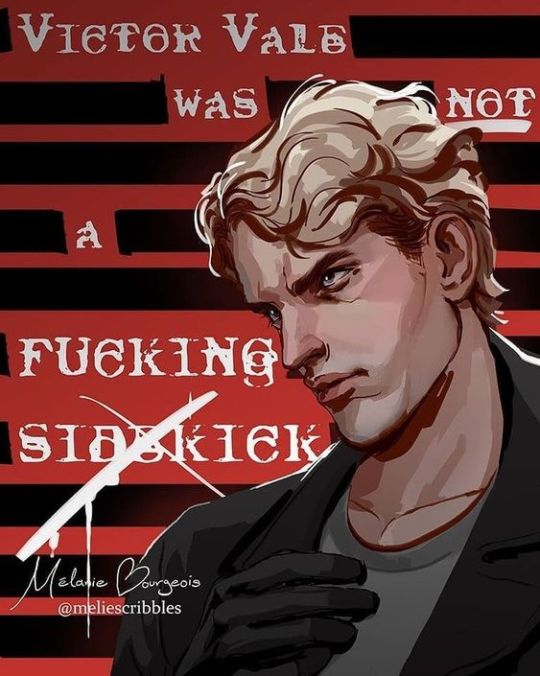
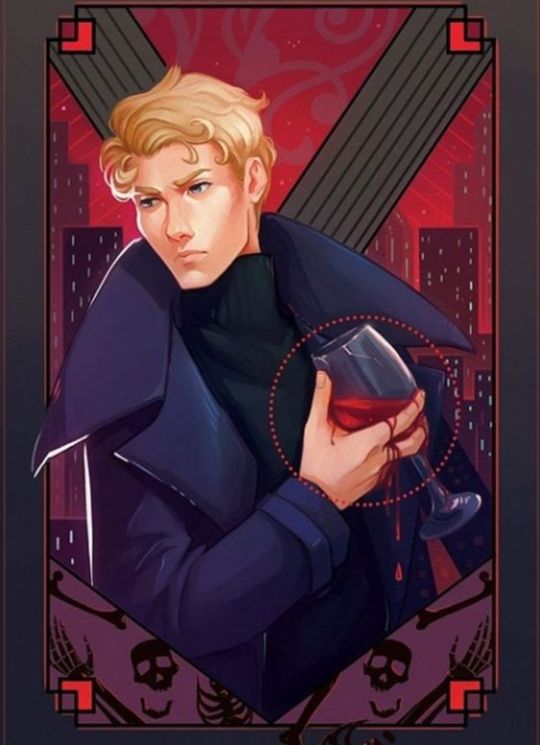
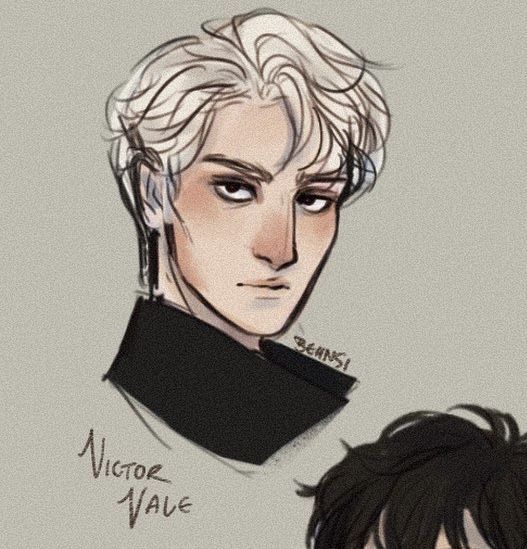
Victor and his revenge story are kind of responsible for kick-starting my journey of self-rediscovery these past twelve months, in a strange and roundabout way. He made me want to stick up for myself and what I wanted out of life. Sure, he's extremely morally grey in a concerning way, and yeah, we don't normally encourage revenge, but I found him a comfort at a difficult time. But also, I could totally fix him (no one can and it's no one's responsibility, yet the sentiment is still there). I'm not usually one for blonds (I am a liar) but his cold aesthetic is oddly pleasing. There's nothing I understand more than an awe that rots into resentment and envy while maintaining the same thread of fascination with someone. "Victor Vale was not a fucking sidekick" is just a, mwah, chef's kiss line. Honestly, I have less of a crush on this guy, more of an understanding that I appreciate. Also, I haven't even mentioned the chronic pain implications and canon uses of his powers. But that might be for another time.
Viktor (Arcane: League of Legends)
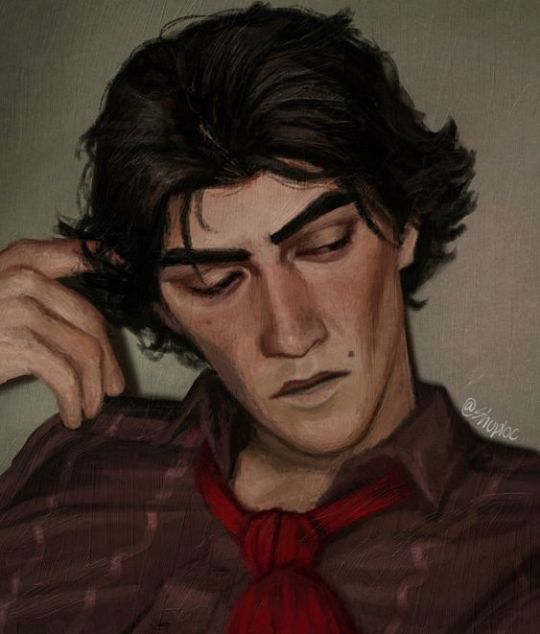
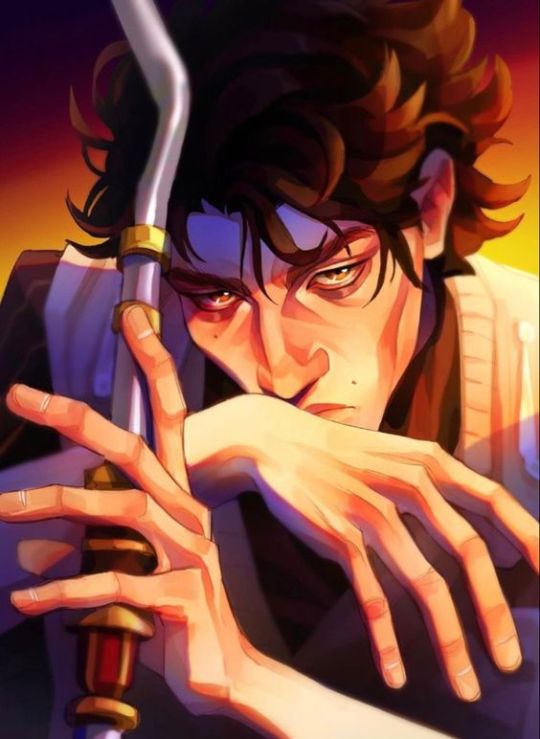
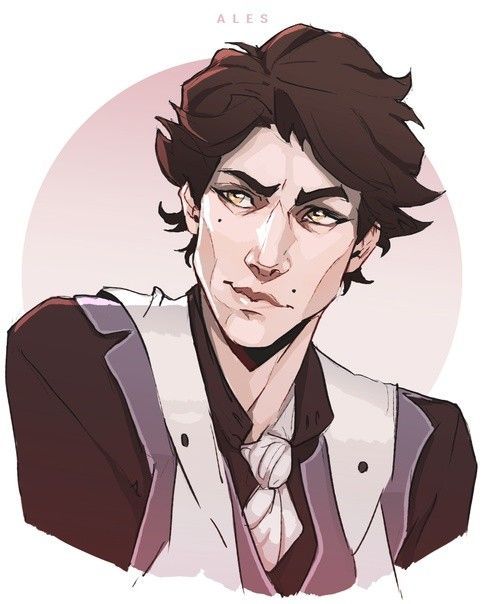
Another Viktor with chronic illness themes and whose (in LoL lore) regard for a partner in science goes sour over time as they pursue different objectives (not seen in the Netflix series yet, of course, it's too early for glorious evolution). This guy always comes back to rot in my brain, and I cannot wait for season 2 later this year to see what comes of his arc. I'm planning a fanfic involving him, Jayce, and maybe/sort of Jinx, based on a dream I had months ago but still have swirling in the soup that is my consciousness. There is something so pretty about this guy. If I was more confident in my sketching abilities, he'd end up being my muse way too often. Viktor's character to me is kind of a tragedy personified, and I love a good tragedy. Oh, and his voice actor?? Amazing. There's some debate over how authentic he sounds to Eastern Europeans, but the accent aside still, he sounds sooo good. I want to sit in on a lecture where he speaks about literally anything for two hours.
Kell Maresh (A Darker Shade of Magic; The Fragile Threads of Power by V.E. Schwab)
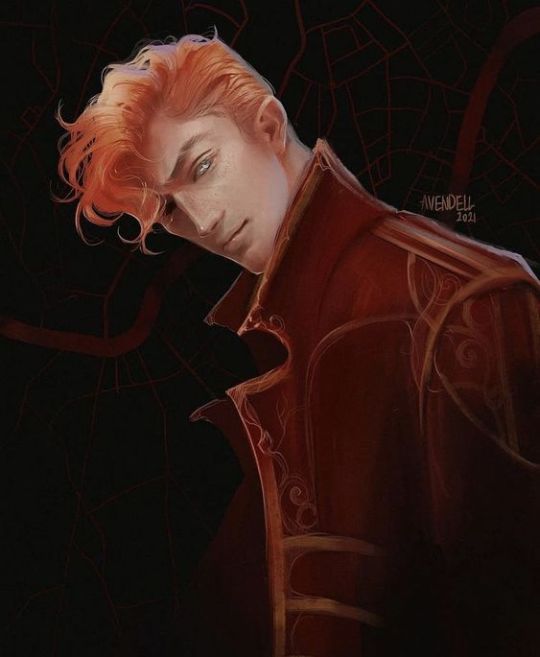
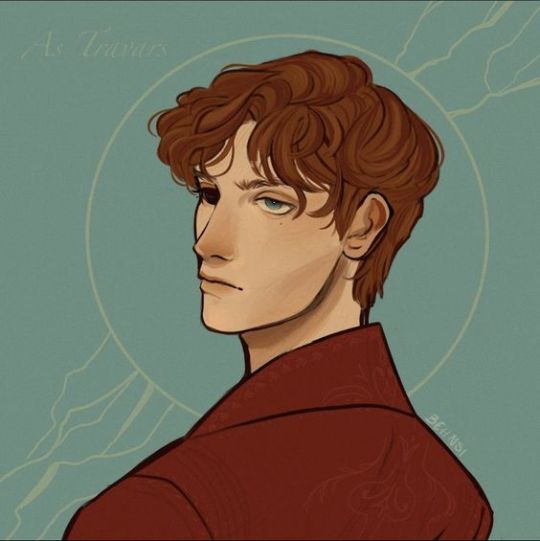
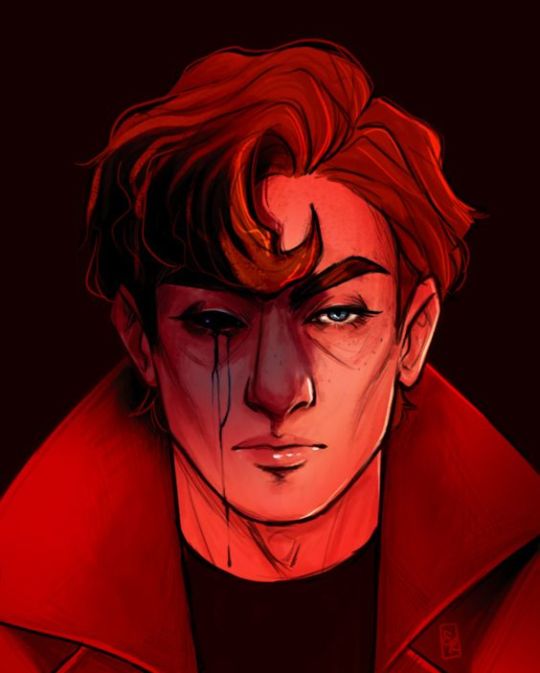
Usually, I don't talk about Kell because of how silly I feel like my crush on him is. I identify with Delilah "Lila" Bard throughout ADSOM and even Threads, so I hate further mentioning how much I actually think about Kell because I'd have to fist fight anyone who said I only relate to her because of Kell when that's not the truth. And yet, there's still enough differences between Lila and I for me to be like "if I had to pick a woman in the Schwabverse..." But also, MAYBE I JUST THINK KELL IS GORGEOUS, OKAY? 🫣 Maybe I like that he starts as a somewhat naive prince who's had things both easy and rough in life (wanting to be loved by the only family you know and not feel like you're only there to protect your adoptive brother whom your parents tried to tell you both was not actually your brother and you should stop treating each other as such is VALID, argue with the wall, also he's the bodyguard and eternal worrier (yes, worrying) for Rhy and he's taken lives way too young). Maybe I like that he fell first and fell hard for Lila (okay, but if we're getting into the nitty-gritty, she did flirt with him first multiple times, but she would never admit to actual feelings), that he's the male love interest without reservations for once, leaving it up to Lila and whether she's open to love for once in a story. And yeah, okay, maybe I like that he's actually some kind of a prince charming, the sort you always secretly dream about, you know? Shut up. I like his stupid magic coat too. He's clever, but occasionally actually unbelievably dumb, he's funny and witty yet he knows when to keep his mouth shut (and is usually the one hauling others out of a scrap because of their own smart mouths), he cares too much about his family, AND DID I MENTION HE ALSO HAS CHRONIC ILLNESS THEMES THAT BROKE MY DAMN CHRONICALLY ILL AND IN PAIN HEART? I've said too much already, but there. He's a guy.
Miguel O'Hara (Spider-Man: Across The SpiderVerse)
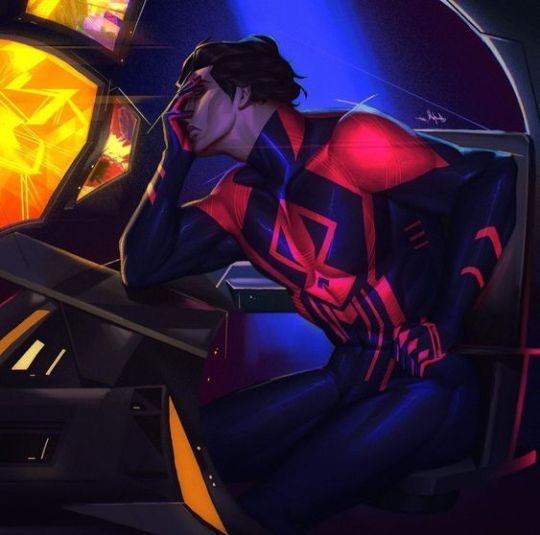
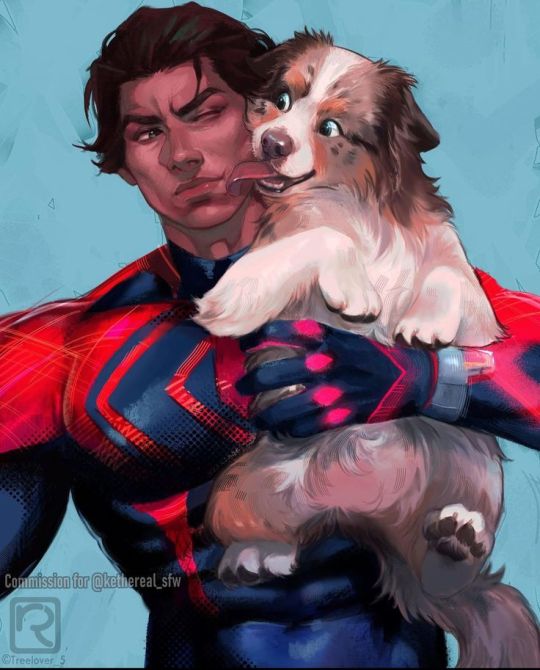
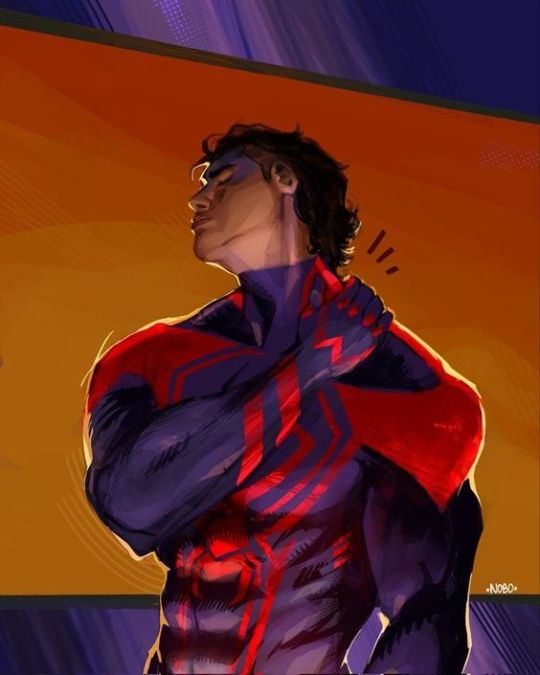
This is the one my sister teases me most about because she doesn't get it. To be honest with you all, even I don't know how to explain it. But this guy. Miguel. There is something about him that I just abdkjdjsdv, you know? Is it the tragedy? The moral greyness? The fangs? His insane height? Just his fanon self? The fucking muscles?? I don't know. But I will defend how interesting he is as an antagonist until the cows come home.
Elliott (Stardew Valley)
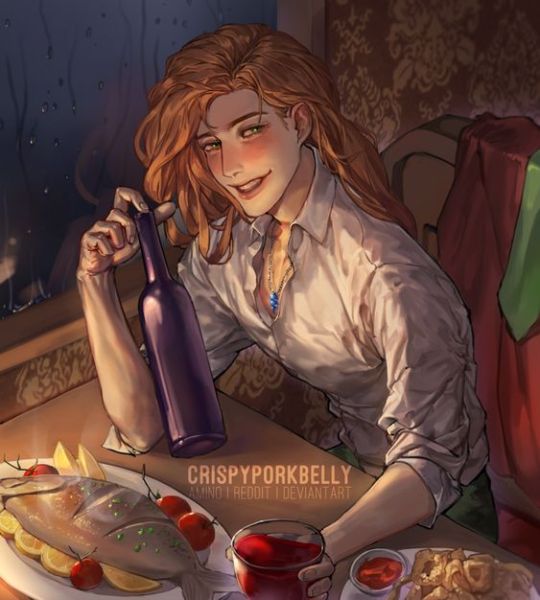
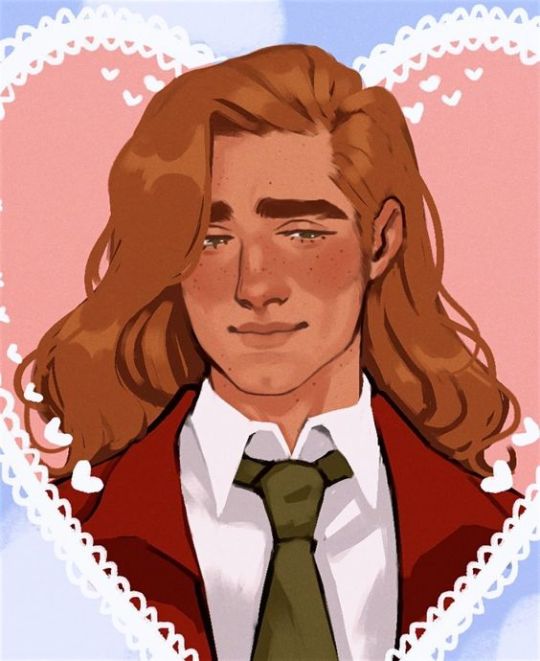
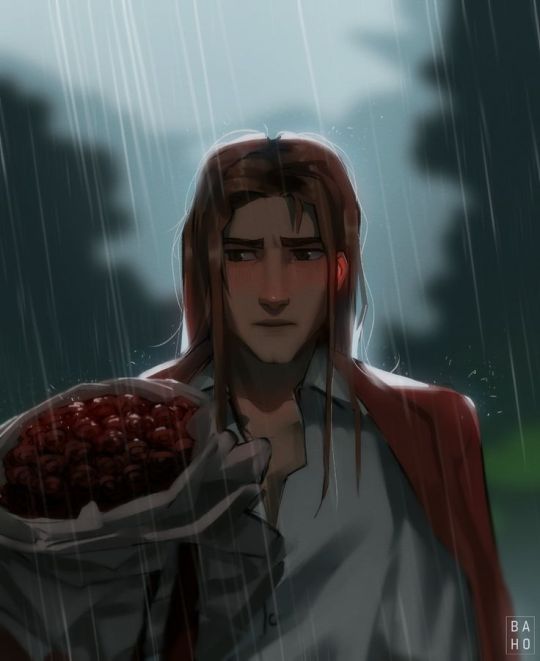
Oh... boy. Sometimes, I realise I have a type. It's pretty guys who are hopeless romantics that write novels and poetry. Maybe it's just this one guy. But wow, it works on me. I'm writing a fanfic about him because I need to. There's only 400-odd words to it so far. It was not long after I met him in the game that I decided I had to wife him up. I planted that pomegranate tree early, because it's his favourite fruit for those who don't know, and he loves receiving them as a gift. I got ducks so I could give him their stray feathers. I learned how and when to find lobsters and catch crabs because he loves those too. If I'm out of gifts, I go get a coffee for him because every writer needs their sustenance. Literally, by Spring of Year 2, we were married, and I wondered if perhaps I might have been a little too single-mindedly pursuing every one of those cut scenes when I should have been taking it a bit slower and making it less of a mission. Don't know what to tell you, I went crazy. I fully believe in the headcanon that he gets up early just to go through his haircare routine. Is he pretentious? Maybe. Does he lay it on a little too thick that he's scared of dying alone? Well, okay, yes. Does it bother me that as a househusband he doesn't help out more on the farm? Occasionally. But there's also no one else I'd rather be with (and I developed a sprinkler system specifically so there was less work for me anyway and so now I don't mind at all when he isn't helping). And I can't believe my sister ever introduced me to Stardew Valley because I am now mentally ill about a videogame character made of pixels. Yes, I make wine just for him too. Hush. I spoil him daily now that we're married. Our first child is a son named Ernest. I was debating between Ernest and Edgar, and honestly, I think I should have gone with the latter, but I chose the former. All the dialogue from Elliott is so frickin' cute.
Astarion Ancunín (Baldur's Gate III)
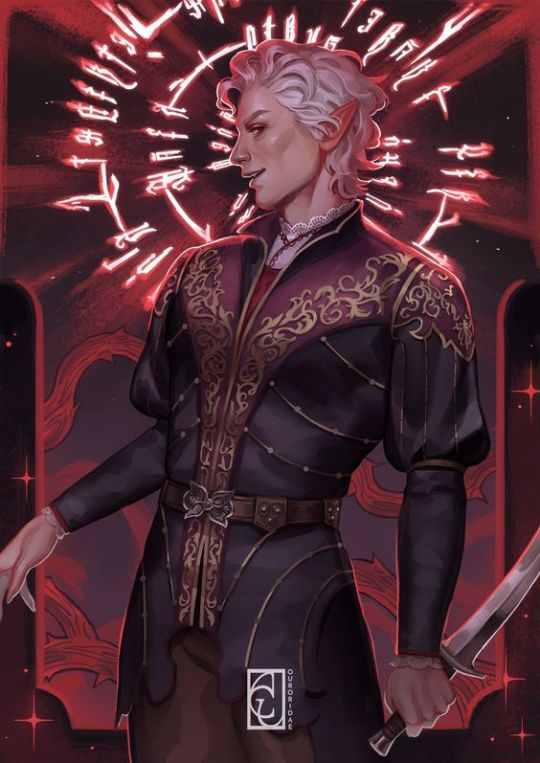
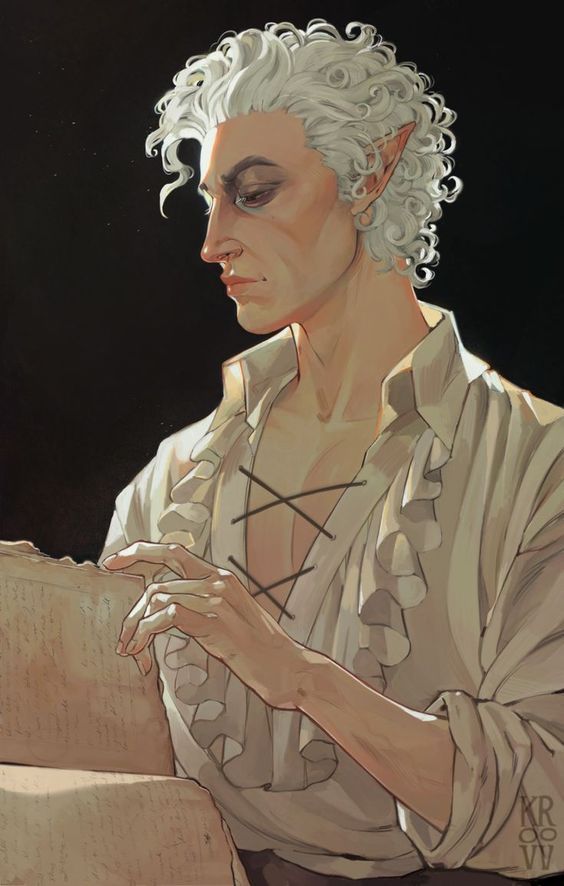
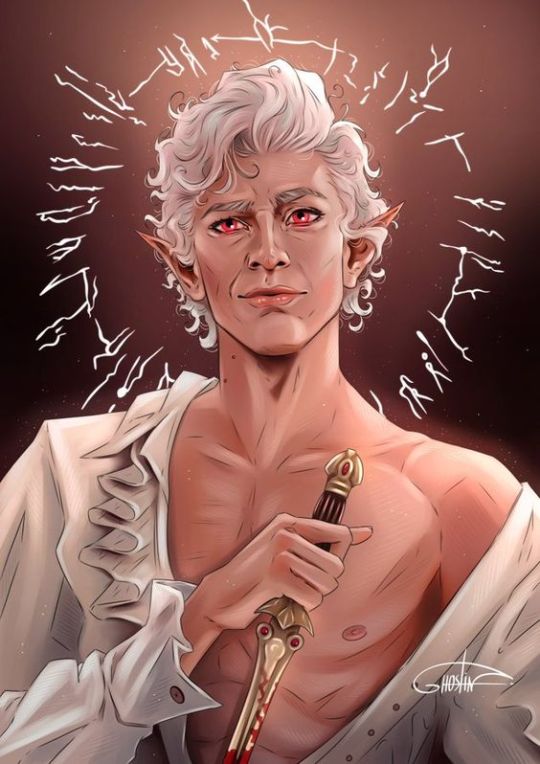
And do you know what the worst part about this one is? I still haven't actually played Baldur's Gate III. I know, I KNOW. A crime. I'm working on it. But you best believe I've watched every cutscene I can, every scrap of gameplay dialogue, all the choices, the different endings you can get with him (Ascended breaks my heart every time -- I don't care how hot he is, it's not what he would have wanted, he doesn't love you like he used to anymore, and he's not as happy as he could be), and I've listened to all the interviews with Neil Newbon and the writer for Astarion about him. This fruity traumatised vampire haunts me. I want to hold him gently and caress his face and tell him he's beautiful and what he looks like to me since he hasn't seen his reflection in centuries and I want to make sure he knows he's loved. I want him to bite me and drink my blood too, but that's not as important. Does it weird me out how much he reminds me of Prince Charming from the Shrek franchise and Preminger from Barbie: The Princess and the Pauper and then aesthetically Asra from The Arcana: A Mystic Romance? Yes. But Astarion's also his own character and I'm in love with his smile and goofy lines.
Settrigh "Sett" (Heartsteel; League of Legends)
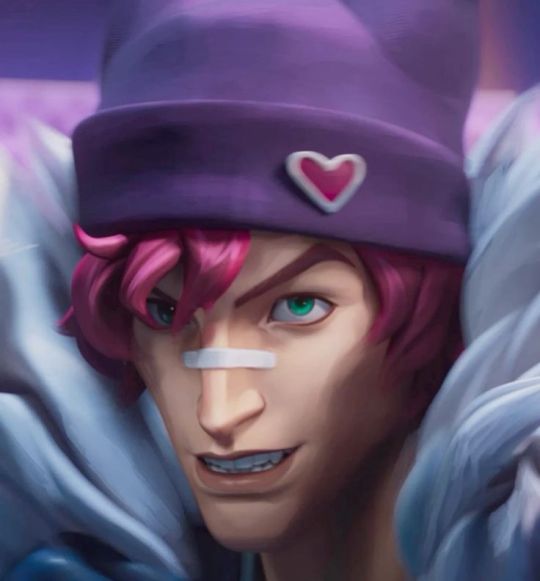
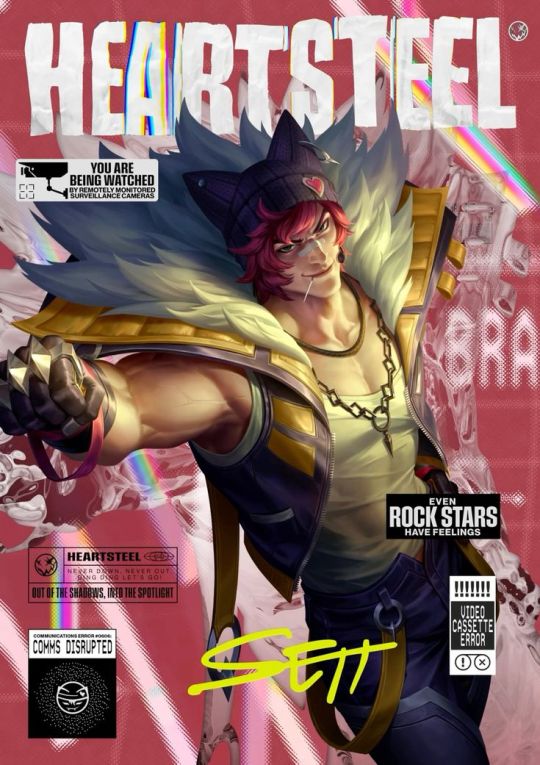
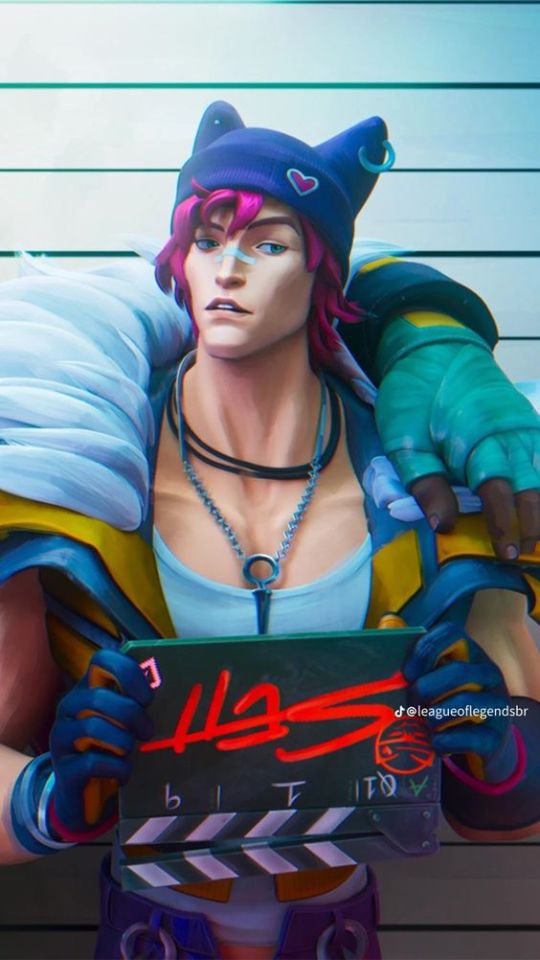
This... might be the lowest point, actually 💀 My sister would agree. Because it's not enough to crush on book characters, show characters, and videogame characters -- while technically this guy is a videogame character and was part of League of Legends waaay before the music video, it was the PARANOIA music video that got me. So, even fictional characters made/involved in music videos are not safe from my heart. Because, as I understand it, OG Sett is a bit different from Heartsteel Sett, and I've found I usually prefer reading about the interpretation of the latter in fanfic more than the former. I mean, I still really, really enjoy fanfics where he's The Big Boss of the pits, and or his other background/lore is included, but I've read some where his old personality is a bit Yikes. The golden retriever energy is my favourite era of his if we can call it that (I still headcanon him as a part fox Vastayan, you can't convince me otherwise so go argue with someone else about it, not me). And honestly, I think I might have read more fics involving Sett in 2023 than I did any of the other characters on this list. Which is saying something since he's not as popular as a few of them. He's a pretty guy and I wish to bite him. Lovingly.
Mizu (Blue Eye Samurai)

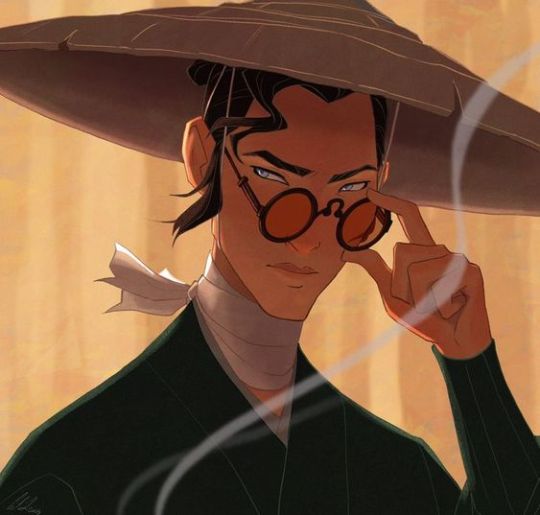
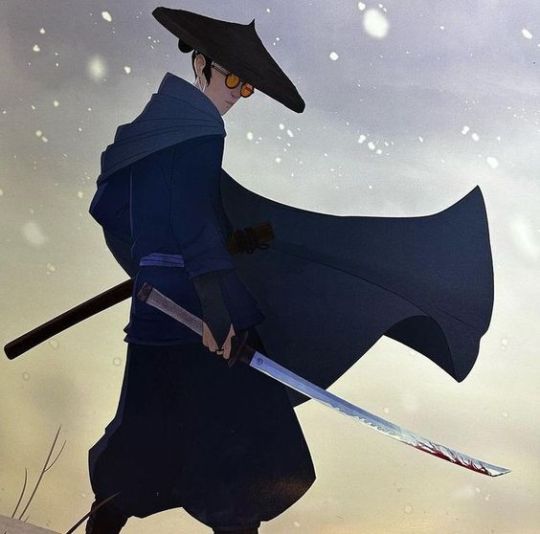
Oh woman. Mizu is... is... she's basically my wife. I know she's all our wife, but like just let me dream a little here. As soon as I finished the series, I was opening up Tumblr, Pinterest, and AO3, my holy trinity of fandom. My platonic wife was sending me TikToks of our shared fictional wife. Mizu can wind up non-binary, male, female, I honestly do not mind because I am in love with any version she is/becomes (for now, I interpret her as a woman in disguise, but if that changes, I'll absolutely change how I refer to Mizu). She is a tragedy wrapped up in revenge because of a rotten love and unfortunate parentage and time period. I want her as much as I want to be her. Also? I go insane over her little smiles and smirks. I LOVE when we got to hear her laugh, even if it was mostly the flashbacks (do not mention Mikio near me; if he wasn't already dead, I would kill him). Also, who doesn't hate their British/white half, ahaha, oh my god, I know mixed ethnicity is a hot topic for people who do not want POC whitewashed in media, and I fully understand that, but I do appreciate seeing parts of myself in mixed characters like the conflict between trying to be more like one side than another. I'll also admit it: she does indeed look hot covered in blood and carrying a sword. I'll see myself out the door. I've been wanting to write a fanfic about her but I'm still stewing over ideas. Mizu is also probably my first truly major crush on a fictional woman (other than my childhood crush on Helga Sinclair from Atlantis: The Lost Empire). Vi from Arcane comes pretty close, but I see too much of myself in her that it gets weird.
We'll do some honourable mentions for characters from The Elder Scrolls V: Skyrim since I've gotten into that again.
Brynjolf, Hadvar, and Nazir, I wish I could mod my gameplay so I could marry you. The developers hated their men-loving gamers (I know the women-lovers complain about Serana, but she will never be as heartbreaking as Brynjolf, I don't care if she recognises proposals only to decline them). I mean, Brynjolf is the Tamriel equivalent of Scottish, he calls you "lass/lad", has got a smoothass voice, supports you through so much of the Thieves Guild questline, has a wicked sense of humour, and then when you finish the questline, it's all "sorry, lass. Got important things to do. We'll speak another time" 😭 You can't even recruit him as a follower. He says nothing when you wear an amulet of Mara. I play on a fucking PS4, I can't do mods to marry him or get more dialogue.
(By the way, on my most recent playthrough, Lydia died when I fought the troll on the seven thousand steps, and I am still mad about it. It used to be difficult for Lydia to die, that was why I brought her everywhere, and now I have to become Batman "I work alone". ESPECIALLY after Benor then died on the way up to Paarthurnax. I still can't believe that happened, I should have told him to stay behind and wait for my return.)
Also, every time I play, Derkeethus is so bugged, I can't even rescue him let alone marry the guy, which was disappointing because he seemed nice.
Argis the Bulwark, Vilkas, Farkas, Rayya, Aela the Huntress, and Marcurio, you are all marriageable and live in my heart always. Marcurio was the first I ever married, I think. Three guesses why I chose him (it's the sarcasm, wisecracks, and general sense of humour) (maybe the long hair too). Has anyone noticed how there doesn't seem to be marriageable options among the Khajiit characters?? Why do you think that is? I just checked the Skyrim marriage wiki and this is what it has to say in the trivia: 'There are no Khajiit spouses, however; since the majority of Khajiit in Skyrim are traders or travelers from Elsweyr, they probably have families back home. Additionally, Khajiit characters talk about home a lot, stating how much they miss it and how cold Skyrim is; thus, they probably do not want to marry and settle down in Skyrim.'
Heart-breaking. Oh well.
And that's the end of the line-up. If you read through this, Divines bless your goddamn soul. Psycho-analyse me based on them, I dare you. Or just judge me. I'd like to see either. And if you can find something in common about them all (you don't need to consider the honourable Skyrim mentions), please let me know, because I am personally at a loss.
#victor vale#viktor arcane#kell maresh#miguel o'hara#elliott stardew valley#astarion ancunin#sett heartsteel#mizu blue eye samurai#skyrim characters#these are all just from the past twelve months#the real common thread here might just be mental illness
21 notes
·
View notes
Note
Hey there! Your posts about heihua and xiao hua in particular have made me curious and I've only started book 7, so I didn’t get too much og book xiao hua (I have watched all the dramas though). Would you mind talking about him (and/or them) a little more? I'd love to read that!
And if not, then I hope you still have a great day :)
hi! i'd be happy to talk more about xiao hua and hei xiazi in the books if you're interested in my take on them (which honestly thank you i'm flattered you'd want it tbh 😂) so thanks for asking (sorry in advance for how horribly long this is)
before i say anything though, a few disclaimers:
while i do like him, xiao hua is technically not my ultimate blorbo (that's wu xie) so because the brainrot is less intense i'm not gonna pretend i'm an expert on all things xiao hua compared to some other people i can think of. same goes for heihua, which is a ship i do like but more passively, so again, not enough brainrot to be a super expert
i haven't read everything they're involved in yet, so for complete transparency, i'm currently about halfway through sha hai in my chronological order read of everything, and anything after that point i've read in bits and pieces only (like various extras, bits of yucun biji etc), so i notably haven't read flowery night. as far as heihua goes, the only thing i've read where they directly interact extensively is the beginning portion of what's considered restart part 2 aka the mute village storyline, but to my knowledge they don't really interact in real time before that point or barely. so i won't be talking about flowery night or the dragon vein trilogy that takes place after restart
any quotes will be pulled from merebear's translations of the dmbj books
i won't be avoiding spoilers so spoiler warning
NOW
with that out of the way, let's talk about book xiao hua and a little about book heihua. i'll be comparing to mostly ultimate note in terms of the adaptations but i'll try not to get too much into that, so the tldr of it is just to bear in mind their dynamic and xiao hua's character in that are significantly different in some ways from how they are in the books. if you want a good drama portrayal of book xiao hua imo the best by far is lost tomb 2 xiao hua even if even he isn't 100% perfect either. anyway i'm getting off track 🏃♀️
since you mentioned book 7, it's worth mentioning for anyone unfamiliar with the books that canonically xiao hua shows up for the first time fairly late in the story at the start of chinese volume 7, more specifically the xinyue restaurant auction, while hei xiazi briefly features in chinese volumes 4 and 5 as part of wu sanxing's double agent team along with xiaoge, but by comparison you don't get much about him besides that he's mysterious and competent on a scale wu xie equates with xiaoge. wu xie and hei xiazi don't interact much, so he's pratically not there and leaves you wondering what relevance he has to the story, which is only ever answered come sha hai. and more importantly at that point, there's no established connection between him and xiao hua at all, which is the major difference with the drama adaptations, namely ultimate note. you do find out later, both in sha hai and a thousand faces, that they're at the very least acquainted with each other to some extent, but that's information you only get much later. so essentially any heihua content pre sha hai is necessarily canon divergence au, and yes that includes ultimate note
xiao hua as a character then. it's interesting to note that he's fascinating in how eeriely similar he ends up being to hei xiazi in some respects, namely in how they operate, which is why i feel they get along as well as they do, but let's look at him independently first because there's a lot to say about him.
keeping in mind that the books are all, exceptions aside, from wu xie's perspective, xiao hua isn't named until fairly late into book 7. they meet by chance as they cross paths in xinyue restaurant, but he doesn't introduce himself to wu xie who calls him Pink Shirt until you reach a much later portion of the book that's never been adapted simply because ultimate note changed the story too significantly by introducing him early to keep that entire bit, which is terrible in some ways because it's such a fun scene, but we'll get to that later. in the meantime, here's xiao hua's first appearence, which establishes through frequent paralleled behavior that the reader is meant to preceive some degree of similarity between wu xie and xiao hua as well, which i'll also get to later:
Just as I was about to speak, the man saw Poker-face behind me and his face instantly changed.
I thought he knew Poker-Face, but when I was about to start asking questions, I saw a man come out from behind Poker-Face. He must have followed us in. The man was dressed in a black suit with a pink shirt underneath and no tie. He was very relaxed. The man went up immediately and asked, “Young Master, the usual?”
The man didn’t speak, but looked at me and stopped. I suddenly felt that he was a little familiar.
I lived in Jiangsu and Zhejiang provinces, so I honestly didn’t have a lot of chances to meet acquaintances in Beijing. At this moment, my mind was stuck, and I couldn’t remember who this man was, but I smiled reflexively. The man had obviously stopped like me, and was looking at me with a very surprised and puzzled expression on his face before he also smiled.
(...)
The both of us smiled pervertedly at each other for a long time, but neither recognized the other. Honestly, when I looked at him, I felt as if I had seen him somewhere before. But on closer reflection, that was all it was. I simply felt that he was familiar.
(...)
The two of us shared a look, but we really couldn’t remember, and were both a little embarrassed. The old fellow with glasses was amused. These old Beijingers were slick and had seen all kinds of things. He gave us a roundabout: “Do the two young masters know each other? Let’s not stand here blocking the elevator door. When you meet someone you know, you’ll remember.”
As he said this, he invited the other party in. Pink Shirt shook his head as if it was inconceivable, looked at me thoughtfully, and then turned and walked into the inner hall. He had only taken a few steps when he looked back at me again.
— Daomu Biji Volume 7, ch. 6 'Auction' & 7 'Auction Part II'
much like hei xiazi, xiao hua is established as mysterious and somewhat unfathomable in a way that niggles at wu xie who can't remember why it is he recongnizes this man he to all intents and purposes should never have met given they don't run in the same circles and live in areas quite far apart. he takes note of how apparently disinterested he is when he notices that xiao hua is sitting across the iron triangle on the upper floor of the auction house, seemingly on his phone utterly bored out of his mind or acting like he's above what's happening really:
I looked carefully and saw Pink Shirt in a box on the left side opposite us. It seemed that he was alone and playing on his cell-phone.
(...)
Basically, it seemed like this was the only item being sold today, so all these people had come prepared to win. Thinking that, I looked at Pink Shirt, who wasn’t far away. He was no longer playing with his phone, but arrogantly sitting on a western-style sofa, and staring at the ceiling with his arms crossed.
— Daomu Biji Volume 7, ch. 8 'Feast for Collectors', 9 'Memories Part I
but of course he's very much paying attention, as pangzi points out:
He took no notice at all, and simply wiped it with his hand and continued: “It’s time for a break, and when the second half comes, I bet another two million gets added. Goddamn it, this Fat Master has learned a lot today.”
(...)
He pointed to Pink Shirt again. “This guy is also very good. He’s been playing with his phone the whole time and hasn’t even raised his head. He rang the last bell just before the break. It seems he’s determined to win and doesn’t even want to compete.
— Daomu Biji Volume 7, ch. 11 'Lighting the Sky Lantern'
and this is where we come back to how in some aspects he and hei xiazi are actually quite similar in their approach, in a way that's markedly different from how ultimate note sets out to contrast them almost glaringly. both he and xiao hua cultivate a persona of nonchalence with a devil may care attitude, but behind the false ease and approchability, there's a calculating and efficient mind aware of its surroundings at all times. in a similar way, very quickly you also realize that xiao hua, far from the prim and proper young master he's presented as in ultimate note, is quite literally just as unhinged.
from the moment xiaoge jumps into action to fight the restaurant security staff for the qilin seal, xiao hua jumps to fight him too, except contrary to ultimate note, this isn't in an effort to save face and throw huo xiangu off because he's working with wu xie, and again, he shows himself to be calculating and cautious:
Between one thought and the next, Poker-face flashed like lightning from my side and jumped straight down from the second-floor balcony.
His behavior left me stunned, and screams could be heard everywhere. I saw him make it to the ground and turn over swiftly before I heard another round of exclamations. I turned to look and saw Pink Shirt had one hand holding the railing of the gallery, while the other hand was in his pocket. He also jumped down and landed in front of Poker-face. On the other side, Fatty gave a loud roar, grabbed a stool, kicked down the screen, and rushed at the hotel staff who rushed in. The scene was a complete mess.
(...)
A man who rushed up was knocked down by Poker-face, and Pink Shirt was protecting the front of the glass cabinet. The two men looked at each other but hadn't yet come to blows.
— Daomu Biji Volume 7, ch. 11 'Lighting the Sky Lantern', 12 'Wreaking Havoc in Heaven'
until wu xie finally manages to get downstairs with pangzi, at which point he finds xiao hua, ass handed to him by xiaoge because it's xiaoge, but instead of angry or surprised or any number of appropriate reactions at being beaten up, the maniac is smiling gleefully. and wu xie understandably thinks it's really fcking weird:
When I came downstairs, the glass cabinet with the seal had been broken and the thing inside had been taken out. Poker-face was looking at the seal carefully and had no intention of leaving. Pink Shirt was getting up from the ground, clutching his neck and coughing. It appeared he had already been beaten once.
When we walked past him, however, we saw him coughing, smiling, and looking at us as if he were very happy. I went up to the stage and told Poker- face to take the seal and get away quickly. As soon as I turned around, I saw Pink Shirt approach me and say, “Hey, Brother.”
Fatty and I looked at him. Fatty lifted the table and Pink Shirt immediately waved, “Wait, wait!” He took a business card from his pocket, handed it to us, and pointed to the imperial seal. “I won’t stop you. Here’s my contact information. When you want to sell the stolen goods, call me.”
Damn it, I said to myself, definitely not a serious person. Fatty actually went up and took the business card, and Pink Shirt made a gesture of invitation. I was so anxious that I pushed them aside and rushed out.
— Daomu Biji Volume 7, ch. 13 'Huo Xiuxiu'
it's at this point we also get introduced to huo xiuxiu (best girl who i could also talk tbh) who's also an absolute gremlin who teams up with xiao hua partly at huo xiangu's behest to test the iron triangle. which is where get into the entire portion of book that couldn't be adapted, and is the part the ultimate note actually changed significantly, because the iron triangle aren't on the run from huo xiangu, she's the one sheltering them. and so xiao hua's real introduction comes in the form of an elaborate scheme between him, huo xiuxiu, and huo xiangu wherein he disguises himself as huo xiuxiu thanks to the bone-shrinking technique, so successfully even xiaoge doesn't detect it until all three of them clue into something being very wrong, at which point he attacks them, gets his ass handed to him by xiaoge again, and once again finds it hilarious and the challenge has made him want xiaoge around clearly:
He staggered but didn’t fall to the ground. At the same time, I suddenly saw him pull a strange dagger from his sleeve, which seemed to be an antique. Holding it in a reverse grip, he rushed towards Poker-face. I immediately shouted “Be careful!” only to see that Poker-face was no longer in his original position. At the same time, a lightning-quick shadow flashed through the air and instantly knocked the man out with his knee.
(...)
I knew that the real malicious one was this guy, so I didn’t feel an ounce of pity for him as I helped Poker-face subdue him first.
When “Xiuxiu” got up from the ground, his whole body suddenly stretched out in a strange posture. He suddenly got bigger, his shoulders widened, his height increased, and the mask was torn from his face.
When I looked at him, I immediately recognized Pink Shirt. He was gasping as he laughed: “It hurts way more getting hit when shrunk to that size. No joke.”
(...)
Pink Shirt rubbed his joints, smiled, and then came up to me and patted me on the shoulder. He turned and nodded to Granny Huo: “Yes, you have a good eye.” Then he pointed to Poker-face and said, “This guy belongs to me."
— Daomu Biji Volume 7, ch. 30 'Get Down to Business'
so essentially, all this was a very long-winded way of showing that xiao hua, before we even know his name and identity, is established as unpredictable, ruthless, calculating, faux insouciant, and a particular flavor of playful that wu xie clearly finds unhinged and is extremely put off by for a hot minute, mostly because he's not aware (not is the reader at this point) that xiao hua's entire life has forged him into finding amusement and challenge in unorthodox things.
in the same way, it's directly because of this that contrary to ultimate note (and even any of the other early dramas like lost tomb 2) he's also absolutely not immediately ride or die for wu xie despite knowing very well they're childhood friends. he abandons wu xie, who as per his assessment was in all likelihood dead or dying, to secure his own escape before coming back to find him, which is the point where wu xie finally realizes the single greatest point of divergence between them. up until then, both wu xie and the narrative make a point of establishing parallels between wu xie and xiao hua, and here finally, what divides them is made clear, and the narrative establishes them as two sides of the same coin separated by this one split in personal code of ethics:
He apparently didn’t rush to check on my situation after I fell into a coma, but continued to climb inside instead. He reached the end of the crevice, completed his task, and then came out to see if I was dead or not.
I couldn’t help but feel a little upset. I didn’t know whether this could be considered a ruthless or firm mentality, but he obviously didn’t feel burdened by it.
I had finally found a difference between the two of us.
But since I didn’t have the physical strength and didn’t want to break our tacit understanding, I didn’t bother expressing this emotion. I knew that when it came to this industry, the habit of desperately rescuing your companions didn’t exist. There seemed to be a kind of prior agreement where two people decided to save themselves if both parties were in danger. It was actually very fair if you thought about it.
It was true that Xiao Hua was uncertain about my situation at the time, and even I would hesitate to go back and rescue someone if I were him.
I couldn’t help thinking of Fatty and Poker-face again. If they were here, the black-haired corpse would’ve had his head cut off before he could scratch my back. Or I would have seen Fatty rush out from those pottery jars and screw everything up. But I would have been saved.
At that moment, I felt an extreme sense of insecurity, more than I had felt before. Although we were three people now, I was really only responsible for myself. It was a very disconcerting thought. At the same time, I suddenly understood why Xiao Hua hadn’t been grateful but angry at me for going into the cave to save him.
He was used to solving his problems by himself. Before he did these kinds of things, he had already accepted that there wouldn’t be any backup or help. He wouldn’t blame anyone for his own death, nor would he blame himself for others’ death.
Was this the Mystic Nine’s mindset? I felt a chill in my heart.
— Daomu Biji Volume 7, ch. 53 'Snake Bite'
and to be clear, this doesn't mean xiao hua is a bad person, nor does the narrative present him as one. it's simply the point where both wu xie and xiao hua diverge clearly when up until then they'd been presented as eerily paralleled. the difference between lies in where this mentality and stance is one that will eventually cause wu xie much grief and trauma when he's forced to adopt it during sha hai, it's simply one that xiao hua adopted too long ago to function without, and has stopped dwelling on if he ever did. similarly, xiao hua takes even longer to finally look at wu xie and see his use and welcome his presence genuinely, where before he'd still been cultivating the same easily approchable persona, though wu xie poked several holes into it before then:
Xiao Hua gave me a meaningful smile, “I found another reason why Granny Huo asked me to bring you. To some extent, you’re also a knowledgeable little shit.”
I grinned, thinking that these words made it sound like he didn’t want me to be here before.
— Daomu Biji Volume 7, ch. 55 'Unlock the Password'
from there, once xiao hua begins to truly open up to wu xie as a friend rather than a burden he's been forced into babysitting, he very quickly picks up on their similarities and what divides them as well, and in a show of almost uncharacteristic mercy, tries to spare wu xie from the ruthlessness he's accustomed to adopting to an extent when wu xie is forced to impersonate wu sanxing and confront just how ugly and lawless the underground business is. it's why this particular scene with panzi is incredibly touching in that despite confronting him with the responsability behind his choices, he spares wu xie from having to have literal blood on his hands, and in that way spares the version of himself he could have been had life not twisted him the way it has:
“Tonight is the key,” Xiao Hua said. “We just need a person to ‘cash’ in on our ‘achievement.’ Pan Zi has to come forward to determine how many people are on our side. Then, Wang Ba Qiu and Lao Liu will be eliminated later tonight.”
I was completely shocked, “What do you mean?”
“Never put something off until tomorrow. This is Master Three’s rule and Wang Ba Qiu knows it very well. He won’t wait for death.” As Xiao Hua spoke, he looked up at the sky. “It’s going to rain blood tonight.”
I gave him a surprised look, “You can say such terrible words without batting an eye. How do you do it?”
Xiao Hua smiled, “My grandfather said that sentence, and my mother relayed it to me. I was only seventeen when I heard those words.” As he said this, he sighed, “Stress is the kind of thing that when you talk about it, it’s gone.”
I frowned and felt a sudden burst of fear in my heart. I never thought this kind of thing would happen again. “Must it happen like this?” I asked him. “Why don’t we call the police anonymously and have them kill him?”
“Mr. Naïve is a fitting nickname,” Xiao Hua said. “If I were your Uncle Three, I might have found a way to keep you naïve, but I’m not. Little Master Three, let’s face reality. This was your choice.”
I was silent as I looked at Changsha passing by outside the car window. I remembered that Pan Zi had said something similar to me before. Indeed, this was my choice.
(...)
While we ate, I asked Xiao Hua when the evening’s events would begin. He merely smiled without saying a word and kept making me drink.
It was a kind of wine I couldn’t identify by taste, but I suspected it was mung bean roast, which was the kind of beverage grave robbers used to drink. Not only did it have some crystallized sugar and medicinal ingredients in it, but it had a spicy flavor and tasted like mung bean soup. After only a few drinks, I got drunk without warning and didn’t even notice when I became muddle-headed.
When I woke up, it was already the next morning. Xiao Hua and Pan Zi were lying on the sofa in my room, both covered in blood and sleeping soundly. I looked out the window at the bright sunshine and knew that everything was over.
— Daomu Biji Volume 8 Part I, ch. 10 'End of the Act'
looking at all this (and this is is my purely my own opinion, so take it with a grain of salt), my main issue with ultimate note xiao hua (and heihua by extension which i'll get into briefly) is that he's not only in some aspects a little to a lot OOC, he's mostly a lot more one-dimensional where book xiao hua is anything but
as far as heihua as a ship goes, they don't actually interact much if at all until much later in canon, even if you interestingly discover in sha hai that it's implied that hei xiazi is working with wu xie on the sha hai project at xiao hua's behest, and that much of his trust in wu xie and his plan stems from xiao hua's trust in wu xie:
It was really a heavy loss. Why did he encounter such tragic consequences every time he tried to emulate Lei Feng67 and do good deeds, while doing unethical things often made him a lot more money? Was he being cheated by partnering up with Xie Yuchen and Wu Xie?
He found it very interesting. He seldom completely ignored the details and promised others he’d do something. If he was part of a certain plan, then he had to know every aspect very well— not only his part but the others’ parts as well
This was the only time he was doing something he knew almost nothing about, and the only reason was: “You just have to trust him.”
He hoped doing this wasn’t a stupid decision. If this thing failed, then he would blacken the Wu family’s and Xie Yuchen’s credit himself.
— Sand Sea Part III, ch. 117 'Fleeing Cockroaches'
there's also a fun bit in part I where hei xiazi, before disappearing to retrieve wu xie and wang meng from beneath the sand in gutongjing, leaves li cu with a backpack and a phone with one number he tells him to call for help, and once li cu actually calls it, you understand it's xiao hua on the other end who's entirely nonchalent about it:
Li Cu trembled as he picked up the phone, pressed the call button on reflex, and put it by his ear. After a while, he heard a voice from the other side say: “Who is it? Who called me just now?”
“Well…I’m a messenger.” Li Cu said incoherently. “Someone asked me to give you a message.” He thought that after hearing this, the other party would reply to him and say “talk” or “wait a minute, I’ll find a quiet place” in a very low, solemn voice, but the other party said indifferently: “I’m a little busy now, can you call me back in thirty minutes?”
Li Cu paused for a moment and thought, you’re even giving me orders now, before he said, “But this message is very important.”
“My business is also quite important. If he’s really in such a hurry, why not come to me instead of asking you to call and give me a message?” The other party continued, “I’ll talk to you in thirty minutes. It’s okay if you don’t call.” At this point, the man hung up.
— Sand Sea Part I, ch. 40 'Unique Number'
and it's arguable that much of the vagueness stems from the very real necessity of secrecy that the whole sha hai plan demands, but while much of this reads as "oh? he's inconvenienced? that's too bad, also i'm busy at the moment please call back at a better time", given how his character has been established before, it's safe to say this isn't the genuine annoyance and exasperation you get from him in ultimate note wherever hei xiazi is concerned, he's far too enticed by chaos as a form of vaguely perverse amusement. it reads far more (again in my opinion) as how much of heihua's dynamic that i've seen play out in the books goes, that is to say them prodding at each other in a giant mutual game of chicken where they're both grinning inwardly or outwardly like the gremlin trashmen they are
the entire premise of restart part 2 is the iron triangle and the baby triangle needling xiao hua into gossiping about hei xiazi because he's late to their get together, to which he happily complies because oh boy that's this week's chance at getting a tally on the prod sheet.
i'm not entirely sure this is coherent or at all what you were looking for, and is definitely way too long woops, but uh. that's my xiao hua/heihua word vomit? i guess? book xiao hua and/or heihua enthusiasts are very welcome to add onto or debate any of this, i leave the rest to the real experts 😂
#how is it that the first meta i write is for xiao hua#and heihua#when neither are my brainrot blorbos#i clearly need to do this for pingxie#or general lore#or wu xie#or xiaoge#but those would be actual books atp#please send help#meta#xie yuchen#heihua#dmbj#dmbj meta
30 notes
·
View notes
Note
Literary style (rich prose, use of narrative techniques, etc.); strong adherence to the principle of charity (diversity of perspectives/everyone is given the fairest possible shot); thematic focus on death and its effects on the living (particularly, grief); thematic focus on gender; devastating one-liners; emphatically correct Ron Weasley takes; Voldemort having a thing for mirror sex.
thanks so much, pal!
sex/gender/death are in an exclusive triad over here, but what i most appreciate you drawing out here is the principle of charity in writing [also the subject of this meta: fandom is like medicine].
I've seen a lot of posts from villain-enjoyers recently taking against the idea of redemption. and i do get this - there's been such a move in many fandom spaces against any sort of moral complexity in characterisation that i understand the impulse to say fuck it, and enjoy your favourite horrible people as horrible people.
but i do also think that this rejection of theme of redemption often misunderstands the reading that we all owe our blorbos. i think there's a tendency to believe that redemption would require some sort of damascene extraordinariness which would result in the character in question becoming neutered - perfect and soft and lacking the bite which led to us becoming interested in them in the first place.
but not so. redemption can be small, ordinary. it can be accidental. it can sneak up on you. it can exist in some areas of your lives and not others. sometimes little chips of redemption are gradually carved by bringing the man whose parents you murdered cups of tea - and maybe that's not enough to redeem you fully, and maybe it shouldn't be, but it's something - and by him being charitable enough to understand what happened in your life which led you down the path of evil.
one of the real issues with the harry potter fandom [and this is why i am so frequently on my soapbox about how we need to think about the narrative conventions of the series, and how it wants us to do this and how we should work against it] is that far too many people involved in it find themselves on sides. maybe they identify as gryffindors, and therefore fail to offer any of the other houses the nuance they extend to their favourite characters. maybe they think the villains get a bad showing in the series, so they bash the heroes. maybe they loathe a specific character, or ship, or subfandom, and so they dismiss anyone who writes within those confines.
but this is an error. every single character - just like every single person alive - can be interesting and worthy of exploration and worthy of the chance to transcend their canon [and fanon - catch me defending molly weasley against both sirius and percy nation like it's my paid employment] evils if we just give them the chance.
and i'm not just saying this because i have been recently forced to become fascinated by rodolphus lestrange...
i hadn't deeped before now that the 'lord voldemort enjoys watching himself get fucked in a mirror' thing had turned up in more than one piece... and all i have to say is...
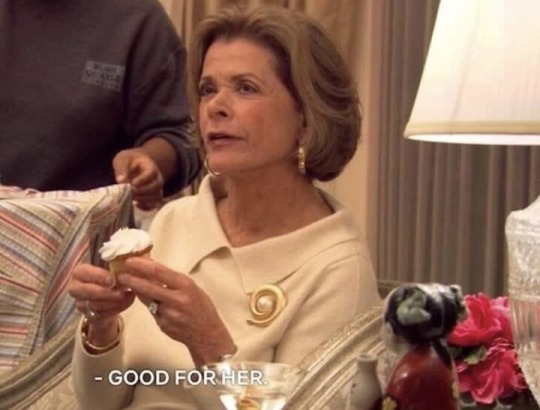
[attention-seeking behaviour here]
#asks answered#attention seeking behaviour#the fact that every human being is capable of redemption is actually important and i'll die on this hill#be good to each other
27 notes
·
View notes